vendredi, 28 mars 2025
Erdoğan est désormais seul
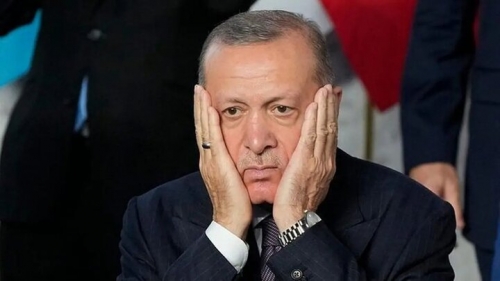
Erdoğan est désormais seul
Alexander Douguine
Suite à l'arrestation du maire d'Istanbul, Ekrem İmamoğlu, de graves troubles ont éclaté et continuent de s'intensifier en Turquie. La crise s'aggrave. Mais pour analyser correctement la situation, plusieurs facteurs doivent être pris en compte.
Tout d'abord, le maire d'Istanbul, tout comme le maire d'Ankara, appartient à l'opposition libérale à Erdoğan. Il s'agit du Parti républicain du peuple (CHP), qui représente une alternative de gauche-libérale, laïque et généralement pro-européenne au parti d'Erdoğan, le Parti AK (Parti de la justice et du développement). Cette opposition est, en principe, orientée vers l'Occident et opposée à l'orientation islamique des politiques d'Erdoğan. En même temps, elle adopte une position assez hostile envers la Russie.
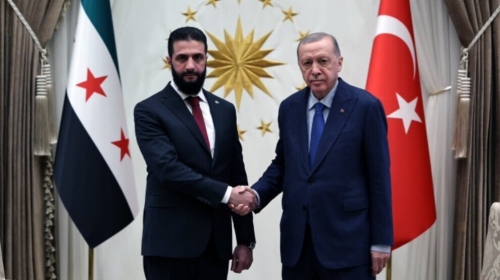
Deuxièmement, Erdoğan lui-même a récemment commis plusieurs erreurs politiques très graves. La plus significative d'entre elles est son soutien à la prise de pouvoir à Damas par les militants d'al-Jolani. C'est une erreur fatale parce qu'en agissant ainsi, Erdoğan a infligé un coup sérieux — peut-être irréparable — aux relations turco-russes et turco-iraniennes. Maintenant, ni la Russie ni l'Iran ne viendront en aide à Erdoğan. La situation s'est déjà retournée contre lui, et la crise pourrait s'intensifier davantage.
Je ne crois pas que l'Iran ou la Russie soient impliqués de quelque manière que ce soit dans les troubles en Turquie. Plus probablement, c'est l'Occident qui essaie de renverser Erdoğan. Néanmoins, son erreur syrienne est significative. Beaucoup en Turquie n'ont pas seulement échoué à la comprendre, mais ont également condamné cette politique d'Erdoğan qui, comme nous le voyons maintenant, a conduit au génocide des Alaouites et d'autres minorités ethno-religieuses, y compris les chrétiens. En effet, seul un politicien extrêmement myope pourrait remettre le pouvoir en Syrie à al-Qaïda. Et bien qu'Erdoğan ait généralement été considéré comme un homme d'État prévoyant, cette erreur, à mon avis, le hantera longtemps.

Un autre aspect est sa politique économique. La dévaluation de la lire, l'inflation galopante — tout cela sape une économie turque déjà fragile. Et bien sûr, ces échecs — tant en Syrie que dans l'économie — ainsi que le rapprochement d'Erdoğan avec l'Union européenne, avec les forces mondialistes, et son contact avec le chef du MI6, Richard Moore, poussent tous Erdoğan dans un piège. En conséquence, l'opposition libérale mais kemaliste (et donc nationaliste) en Turquie a saisi l'occasion de capitaliser sur ses échecs. Leur argument est : « Nous vous avions prévenus que ce qui s'était passé en Syrie serait une victoire pyrrhique, l'économie s'effondre, et nous avons une orientation plus forte vers l'Ouest qu'Erdoğan, sous lequel la Turquie ne sera jamais acceptée en Europe. »
Et puisque la Turquie a une démocratie fonctionnelle, Erdoğan n’a pas pu empêcher les populations d’Istanbul et d’Ankara de voter pour des leaders de l'opposition lors des élections municipales. En fin de compte, Erdoğan a décidé d'emprisonner le maire d'Istanbul. La question de savoir si c'était justifié ou non est presque sans importance — dans tout régime politique moderne, il est toujours possible de trouver des motifs pour emprisonner n'importe quel fonctionnaire (en politique moderne, il n'y a pas de personnes innocentes). La Turquie ne fait pas exception. Par conséquent, la question est uniquement celle de l'opportunité politique.
Erdoğan a décidé que les choses allaient mal pour lui et qu'il devait emprisonner son opposant le plus actif — Ekrem İmamoğlu. Pourtant, İmamoğlu est une figure affiliée à Soros, soutenue par des réseaux mondialistes, et Erdoğan n'aurait pu être soutenu dans cette démarche que s'il avait lui-même pris une position ferme contre cette faction liée à Soros. Cependant, comme l'avons déjà mentionné, Erdoğan avait précédemment poignardé dans le dos ses alliés — l'Iran et la Russie. Par conséquent, nous, Russes, ne pouvons pas le soutenir dans la situation actuelle. Et les Iraniens non plus.
C'est une situation très mauvaise pour Erdoğan. Tous ses opposants, profitant de ses erreurs accumulées au fil du temps, se sont soulevés en une même révolte — laquelle est une véritable révolution de couleur. Et ces kemalistes conservateurs, même alignés dans les forces armées, avec une orientation eurasienne — des militaires kémalistes qu'Erdoğan avait un jour accusés dans l'affaire toute fabriquée que fut "Ergenekon", et qui, en fait, l'avaient sauvé plus d'une fois (surtout lors de la tentative de coup d'État de 2016) — ne viendront plus à son secours.
En essence, Erdoğan se retrouve sans amis, ayant trahi tout le monde à plusieurs reprises. Je crois que sa situation est peu enviable. En même temps, nous devons garder une très grande prudence face aux manifestations en cours, car de la même manière que dans la plupart des révolutions de couleur, les mêmes organisateurs se tiennent derrière elles, y compris celle qui se déroule actuellement en Serbie. Au même temps, les mondialistes impliqués dans les manifestations sont une minorité — la majorité sont des gens ordinaires réellement mécontents de divers excès politiques au sein de la direction. Par conséquent, il y a aussi des raisons objectives à ce qui se passe — il semble qu'Erdoğan ait simplement épuisé sa marge d'erreur. Pourtant, il continue à faire des erreurs.
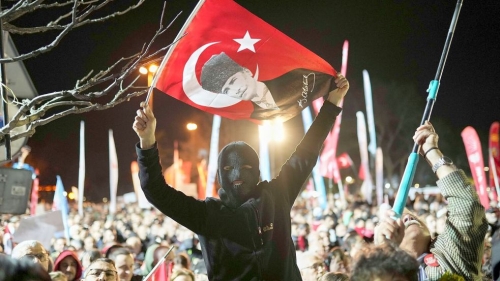
Il est difficile de dire ce qui pourrait rectifier la situation. Peut-être qu'une certaine forme de gouvernement d'unité nationale kemaliste impliquant des islamistes modérés (comme des membres du propre parti d'Erdoğan) pourrait émerger. Dans ce contexte, la question se pose : que se passe-t-il avec Devlet Bahçeli, le leader du Parti du mouvement nationaliste turc et le principal allié d'Erdoğan ? Il y a même des rumeurs selon lesquelles il serait mort, ce que les autorités auraient soi-disant dissimulé. Je pense que ce ne sont que des théories du complot — mais cette figure de la politique turque a vraiment vieilli et s'est affaiblie. Erdoğan ne peut plus compter sur lui ou sur ses "Loups gris", autrefois puissants, de redoutables nationalistes radicaux turcs.
Donc, encore une fois, je répète : l'avenir d'Erdoğan et de son régime semble sombre. Cependant, bien sûr, nous préférerions avoir une Turquie souveraine avec une politique étrangère indépendante comme voisine — de préférence amicale, bien que nous soyons préparés même si elle nous devient hostile. La Russie est prête à toute éventualité.
15:24 Publié dans Actualité | Lien permanent | Commentaires (0) | Tags : actualité, erdogan, ekram imamoglu, turquie |  |
|  del.icio.us |
del.icio.us |  |
|  Digg |
Digg | ![]() Facebook
Facebook
mercredi, 26 mars 2025
Georgescu non et Imamoglu oui ? Erdogan se fiche des subtilités électorales et ne pense qu'à la Grande Turquie
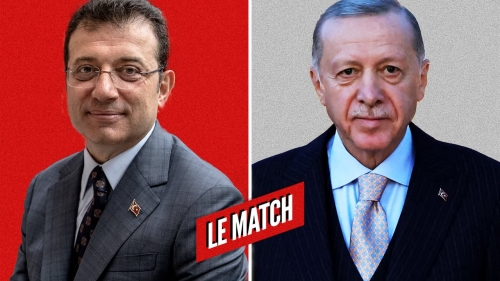
Georgescu non et Imamoglu oui ? Erdogan se fiche des subtilités électorales et ne pense qu'à la Grande Turquie
Enrico Toselli
Source: https://electomagazine.it/georgescu-no-e-imamoglu-si-erdo...
Un gouvernement inéluctablement démocratique fait arrêter le candidat de l’opposition ayant le plus de chances de gagner les élections. Et l’empêche de se porter candidat. Pendant ce temps, il bloque aussi le parti qui soutient le candidat. Et que font les eurodingues de Bruxelles ? Cela dépend. Dans un cas, celui de Georgescu en Roumanie, ils soutiennent l’arrestation et l’annulation de la candidature, au nom de la démocratie, ça va sans dire. Dans l’autre cas, celui d’Imamoglu en Turquie, on s’indigne du comportement antidémocratique d’Erdogan.
Et les médias suivent les directives des eurodingues. On minimise les manifestations de protestation en Roumanie et on met bien en exergue celles qui se déroulent en Turquie. Où, évidemment, Erdogan s’en fiche, malgré les répercussions sur la bourse et le change, pour bien clarifier que les spéculateurs internationaux sont toujours prêts à faire comprendre de quel côté ils se trouvent.
Imamoglu, maire d'Istanbul, avait sans aucun doute de bonnes chances de s'imposer aux élections prévues en 2028, même si, dans trois ans, il peut se passer n'importe quoi. Mais Erdogan a une vision du monde, et de la Turquie, qui ne dépend pas de la conjoncture électorale. Il veut reconstituer l'empire ottoman et ne peut pas se contenter de méditer les subtilités des règles électorales.
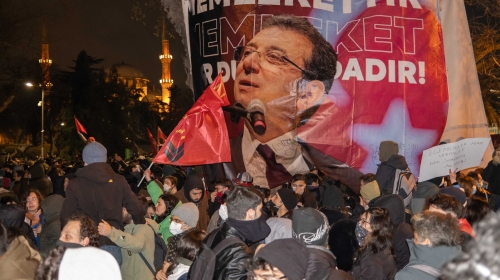
Il est d’ailleurs en bonne compagnie. Peu d'États de l'Union européenne ont reçu un mandat des électeurs pour faire la guerre contre la Russie et pour voler les économies des familles européennes. Mais à Bruxelles, ils se fichent des électeurs et agissent uniquement pour rendre heureux les marchands de mort.
Erdogan, pour sa part, s'engage à renforcer le rôle de la Turquie. Et il réussit. Parfois en utilisant l'Azerbaïdjan comme bras armé ou comme instrument pour des accords économiques – des confrontations avec l'Arménie aux accords avec l'Europe pour le gaz – parfois en utilisant les jihadistes comme en Syrie, parfois en intervenant directement comme en Libye.
Une politique à large spectre, qui implique les pays turcophones d’Asie centrale et qui prévoit la plus totale ambiguïté dans les relations avec Moscou et Pékin, et même avec Tel Aviv : de grandes menaces publiques contre le boucher israélien, puis des accords économiques en sous-main.
Tout est bon pour rendre à nouveau grande la Turquie. Un slogan déjà utilisé? Oui, mais peu importe à Erdogan. Qui veut être le maître de la Méditerranée. D’ailleurs, si ses adversaires sont Tajani et Ursula von der Leyen, le match se gagne facilement.
15:28 Publié dans Actualité | Lien permanent | Commentaires (0) | Tags : actualité, turquie, erdogan, ekram imamoglu, politique internationale |  |
|  del.icio.us |
del.icio.us |  |
|  Digg |
Digg | ![]() Facebook
Facebook
Protestations en Turquie: Erdogan sous pression
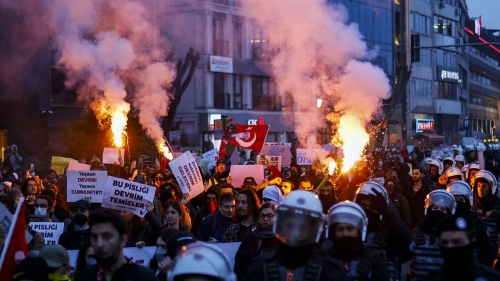
Protestations en Turquie: Erdogan sous pression
Source: https://report24.news/proteste-in-der-tuerkei-erdogan-unt...
Le président Recep Tayyip Erdogan a fait arrêter son plus grand rival politique, le maire d'Istanbul, Ekrem Imamoglu. Cela a entraîné des manifestations dans plusieurs villes. Des centaines de manifestants ont été arrêtés. La Turquie est confrontée à des troubles de masse contre le "sultan du Bosphore", dont la position s'affaiblit lentement.
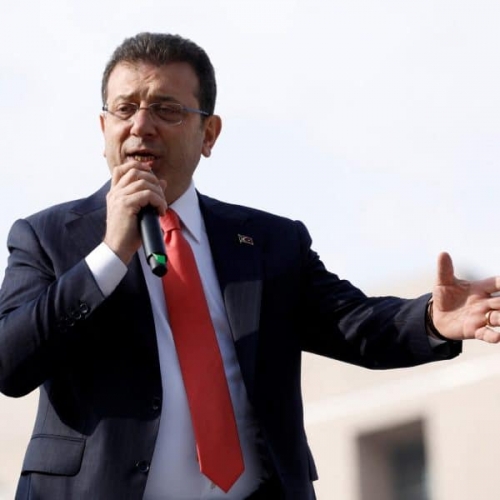
La situation en Turquie est tendue. L'arrestation du maire d'Istanbul Ekrem Imamoglu (photo) a déclenché des manifestations à l'échelle nationale, rappelant les grandes manifestations de 2013, lorsque les citoyens s'étaient soulevés contre la destruction du parc Gezi. Dans la nuit de samedi, le ministère de l'Intérieur a signalé que 343 personnes avaient été arrêtées dans plusieurs villes, dont Istanbul et Ankara. Ces mesures ont été justifiées par l'argument de la nécessité de maintenir l'ordre public. Cependant, la réalité est beaucoup plus complexe et soulève des questions sur les droits démocratiques en Turquie.
Les manifestations, qui ont commencé le 19 mars, ne sont pas seulement une réaction à l'arrestation d'Imamoglu, mais reflètent un mécontentement plus profond face à la situation politique et économique du pays. Le maire a été arrêté chez lui sous des accusations de terrorisme et de corruption, ce que beaucoup considèrent comme une action politiquement motivée. "Il y a une grande colère. Les gens sortent spontanément dans la rue. Certains jeunes sont politisés pour la première fois", a déclaré Yuksel Taskin, député du Parti républicain du peuple (CHP), considéré comme social-démocrate, à propos des développements actuels.
Imamoglu, considéré comme un rival sérieux du président Recep Tayyip Erdogan, était prévu comme candidat de son parti, le CHP, pour les prochaines élections présidentielles de 2028, qui se tiendront le 23 mars. Son arrestation pourrait être interprétée comme une tentative de réduire l'opposition politique et de renforcer le contrôle sur l'opinion publique. "Je constate aujourd'hui lors de mon interrogatoire que mes collègues et moi sommes confrontés à des accusations et à des diffamations inimaginables", a déclaré Imamoglu lors de son interrogatoire par la police.
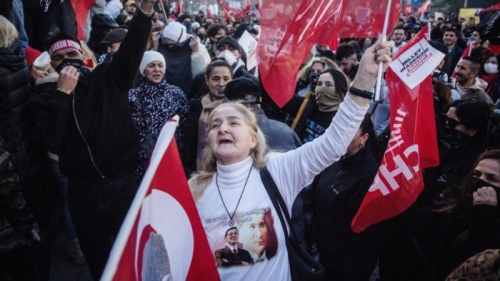
Les accusations portées contre lui sont graves : diriger une organisation criminelle, corruption et soutien au Parti des travailleurs du Kurdistan (PKK), lequel est interdit. Ces accusations sont non seulement juridiquement mais aussi politiquement explosives. Elles visent à discréditer Imamoglu et ses partisans et à manipuler la perception publique. Le fait que l'Université d'Istanbul ait déclaré un jour avant son arrestation que son diplôme était invalide renforce l'impression qu'il s'agit bien d'une manœuvre politique. En Turquie, seuls les titulaires d'un diplôme universitaire peuvent se porter candidat à des fonctions politiques.
La réaction du gouvernement aux manifestations est tout aussi préoccupante. Le ministre de l'Intérieur, Ali Yerlikaya, a annoncé que des centaines de comptes sur les réseaux sociaux avaient été identifiés et que 37 utilisateurs avaient été arrêtés pour "publications provocatrices incitant à des crimes et à la haine". Cela montre que le gouvernement s'attaque non seulement aux manifestants, mais aussi à la libre expression par voie numérique. Les restrictions sur les plateformes sociales sont un autre signe de la répression croissante en Turquie.
Les manifestations ne sont pas seulement un signe de mécontentement face à l'arrestation d'Imamoglu, mais aussi un signe de la frustration généralisée face à la situation économique et sociale du pays. "Le sentiment d'être piégé dans tous les domaines – économique, social, politique et même culturel – est déjà largement répandu", a déclaré le journaliste et auteur Kemal Can. Ces sentiments sont profondément enracinés dans la population et pourraient conduire à un tournant dans le paysage politique de la Turquie.
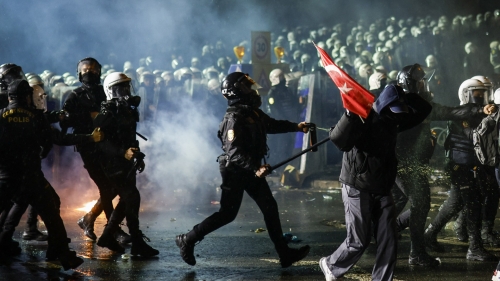
Le CHP, qui se situe dans la tradition laïque et kémaliste du fondateur de l'État Mustafa Kemal Atatürk, a appelé ses partisans à manifester pacifiquement et a souligné que les arrestations sont politiquement motivées. Le parti se considère comme responsable de représenter la voix des citoyens et de lutter contre les mesures répressives du gouvernement. Les événements actuels pourraient servir de coup de fouet pour de nombreux citoyens qui se sont jusqu'à présent tenus à l'écart de la politique.
La question qui se pose désormais est de savoir si ces manifestations peuvent conduire à un mouvement plus large qui transformerait fondamentalement les relations politiques en Turquie. Le gouvernement d'Erdogan, orienté vers le grand empire ottoman, composé de l'islamiste AKP et de l'islamo-nationaliste MHP, a déjà montré qu'il était prêt à réprimer toute forme d'opposition d'une main de fer. Cependant, la colère des citoyens pourrait être un facteur imprévisible qui déréglerait les calculs politiques du gouvernement.
D'un autre côté, il convient de considérer qu'Erdogan ne s'est pas fait beaucoup d'amis en Occident (notamment au sein de l'OTAN, des États-Unis et de l'UE) avec sa politique grande-ottomane et ambivalente. Un changement vers un président pro-occidental "plus fiable" comme Imamoglu pourrait jouer en faveur de l'alliance militaire transatlantique. Dans ce cas, la Turquie pourrait assumer des rôles au Moyen-Orient et dans le Caucase pour le compte des États-Unis, qui souhaitent également se concentrer davantage sur l'Asie de l'Est – la Chine et la Corée du Nord.
12:40 Publié dans Actualité | Lien permanent | Commentaires (0) | Tags : actualité, politique internationale, turquie, ekram imamoglu, erdogan |  |
|  del.icio.us |
del.icio.us |  |
|  Digg |
Digg | ![]() Facebook
Facebook
mercredi, 12 février 2025
Erdogan part à la conquête de la Circassie russe
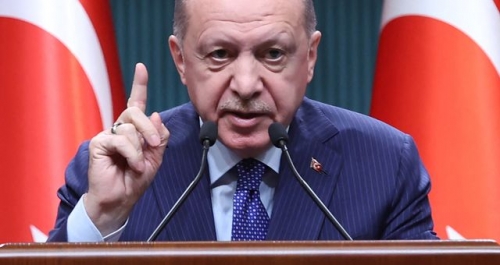
Erdogan part à la conquête de la Circassie russe
Enrico Toselli
Source: https://electomagazine.it/erdogan-parte-alla-conquista-de...
Il a dévoré la Syrie sans coup férir, abandonnant une partie du territoire à Israël. Mais à Tel-Aviv, il ne faudrait pas être trop tranquille pour l’avenir. Désormais, Erdogan tourne son regard vers l’Abkhazie sous contrôle russe, première étape dans la construction d’une Circassie indépendante de Moscou mais dépendante d’Ankara. Évidemment, les dirigeants de l’Union européenne – tous absents lorsque a eu lieu la distribution d’intelligence – célèbrent l’événement. Porter un coup à Poutine mérite d’être fêté avec champagne et caviar, aux frais des sujets européens.
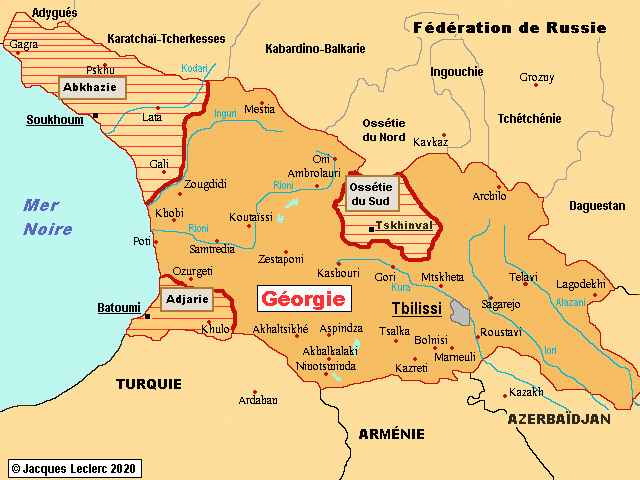
Prendre l’Abkhazie aux Russes signifie aussi se rapprocher de la Géorgie, en poussant Tbilissi à abandonner ses relations avec Moscou pour se tourner vers Bruxelles. Naturellement, les grands politiciens européens ne se rendent pas compte que le passage de l’Abkhazie sous l’hégémonie turque précéderait celui de toute la Géorgie. Et ensuite, pas à pas, viendrait le tour des autres pays du Caucase.
Ursula sera surprise, tout comme toute sa clique, mais Erdogan agit dans l’intérêt de la Turquie, pas dans celui de Bruxelles. On peut même comprendre Zelensky, qui rêve d’affaiblir Poutine grâce à Erdogan, car le bandit de Kiev n’a absolument rien à faire de l’Europe. Mais l’enthousiasme de l’UE, occupée à attiser des troubles à Tbilissi, est totalement déplacé.
Quant à la Russie, une fois de plus, elle paie son incapacité totale à agir sur le front du soft power. Ce n’est qu’à l’approche du scrutin en Abkhazie que Moscou a pris conscience du problème et de l’efficace campagne électorale turque. Ankara a avancé sur le terrain culturel et des revendications ethniques. Moscou, avec un énorme retard, a simplement envoyé un peu d’argent. Cette affaire est assez pathétique et se révèle totalement inefficace. D’ailleurs, les Russes ont commis les mêmes erreurs en Europe occidentale, persuadés que les missiles et les drones suffisent à faire basculer les équilibres.
Staline, sur ce point, était bien plus malin.
19:55 Publié dans Actualité, Affaires européennes, Géopolitique | Lien permanent | Commentaires (2) | Tags : erdogan, turquie, circassie, abkhazie, caucase, europe, affaires européennes |  |
|  del.icio.us |
del.icio.us |  |
|  Digg |
Digg | ![]() Facebook
Facebook
samedi, 06 avril 2024
Questions... turques
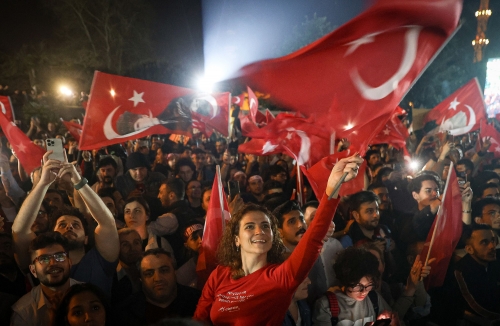
Questions... turques
Andrea Marcigliano
Source: https://electomagazine.it/robe-turche/
Erdogan a perdu. Célébrations dans les rues des métropoles turques: Istanbul, Ankara, Izmir...
Célébrations aussi dans les médias italiens. Ils soulignent la raclée prise par le sultan, qui a toujours été présenté à notre opinion publique comme un méchant despote.
Mais.
Mais il s'agissait d'élections locales. Où l'AKP, le parti d'Erdogan, visait à reconquérir Ankara et Istanbul, déjà gouvernées par l'opposition du CHP. En Italie, ce dernier s'est présenté comme un parti social-démocrate, ou plus simplement socialiste.
En réalité, c'est le parti qui revendique l'héritage d'Atatürk. Laïque et nationaliste. Et les foules qui fêtaient dans les rues des deux métropoles, sans surprise, scandaient: Kemal ! Kemal !

Comme l'a souligné Carlo Marsili (photo), longtemps ambassadeur à Ankara et aujourd'hui plus grand spécialiste italien de la politique turque, ce résultat prouve de manière irréfutable que la Turquie est une démocratie. J'ajouterai qu'il en va de même pour toutes les absurdités qui sont dites et écrites en Italie à propos du despotisme d'Erdogan.
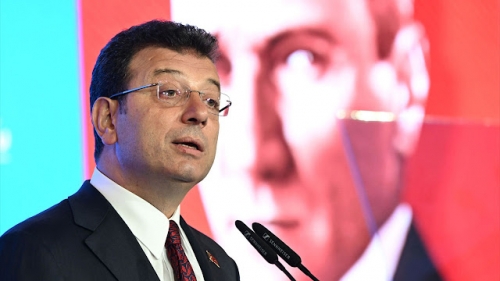
Il s'agissait d'élections locales. Le choix des maires. Et pourtant, elles étaient chargées d'un poids politique très fort. Le défi entre l'AKP, ou plutôt Erdogan, qui y avait mis tout son poids et sa tête, et l'opposition. Ou plutôt le CHP, dirigé par le maire d'Istanbul Ekrem Imamoglu (photo). Lequel a d'ailleurs saigné à blanc tous les autres partis d'opposition. Sauf dans les provinces kurdes, où le succès prévisible et modéré du parti minoritaire de référence a été enregistré.
Le fait le plus important, cependant, est que le CHP semble avoir dépassé le parti d'Erdogan dans les pourcentages nationaux. Ce qui, automatiquement, désigne Imamoglu pour les prochaines élections présidentielles en tant que successeur du sultan.
Erdogan paie principalement une crise économique interne et l'échec de nombre de ses politiques sociales. Il s'est ainsi aliéné le soutien de la classe moyenne urbaine, qui soutenait l'AKP à l'époque.


Toutefois, il s'agit là de problèmes internes à la République turque. Des problèmes turcs, pour l'analyse desquels je me réfère à ce que des experts authentiques tels que Carlo Marsili et le professeur Fabio L. Grassi (photo) de l'université Sapienza écrivent et disent ces jours-ci. Tous deux font d'ailleurs partie du comité scientifique de la Fondation Nodo di Gordio.
Il est toutefois intéressant de noter comment un tel résultat pourrait affecter la politique étrangère d'Ankara. Notamment parce que le CHP est ouvertement atlantiste. Et Imamoglu semble avoir bénéficié de tout le soutien possible, et pas seulement moral, de Washington.
La position internationale de la Turquie est en effet... ambiguë. Erdogan, suivant les lignes de fond stratégiques turques liées à la tradition ottomane, a conduit le grand pays anatolien à jouer sur plusieurs tableaux. Dans l'OTAN et, en même temps, dans le dialogue avec Moscou. Un jeu complet qui a fait d'Ankara un acteur géopolitique présent et influent non seulement dans les Balkans et au Moyen-Orient, mais aussi dans tout le Maghreb et la Corne de l'Afrique.
Une stratégie tous azimuts qui a éveillé les soupçons (et c'est un euphémisme) de Washington. Lequel ne peut renoncer à son alliance stratégique avec la Turquie, mais ne pardonne pas à Erdogan le "dialogue" avec Moscou et Téhéran. D'où le soupçon (sic !) qu'une longa manus "amie"... était derrière le coup d'État manqué de 2016.
Erdogan a maintenant près de quatre ans pour retrouver le consensus et corriger ses erreurs de politique intérieure. Et rien n'est encore joué quant à l'avenir d'Ankara. Toutefois, il faudra voir comment le sultan se comportera sur la scène internationale pendant cette période. Compte tenu de son caractère, je doute qu'il accepte de rentrer dans le rang comme un canard boiteux. Et, peut-être, faudra-t-il s'attendre à d'autres... surprises.
19:23 Publié dans Actualité, Politique | Lien permanent | Commentaires (0) | Tags : actualité, politique internationale, politique, turquie, erdogan, asie mineure |  |
|  del.icio.us |
del.icio.us |  |
|  Digg |
Digg | ![]() Facebook
Facebook
samedi, 16 décembre 2023
Et maintenant, Biden sanctionne Erdogan et les Émirats. Biden cherche des ennemis passionnément
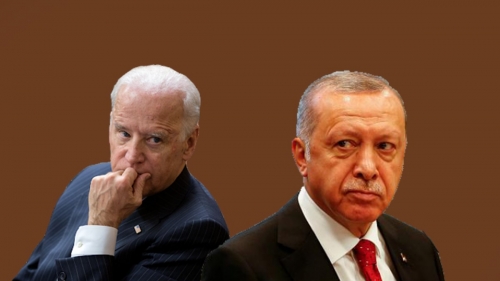
Et maintenant, Biden sanctionne Erdogan et les Émirats. Biden cherche des ennemis passionnément
Ala de Granha
Source: https://electomagazine.it/ed-ora-biden-sanziona-erdogan-e-gli-emirati-cercasi-nemici-appassionatamente/
Les États-Unis sanctionnent des entreprises turques et émiraties, ainsi que chinoises, pour avoir vendu à la Russie des produits que Washington considère comme dangereux pour le pauvre Zelensky. Et, ayant une mentalité de jardin d'enfants, les Etats-Unis ne font aucune distinction entre alliés, semi-alliés et adversaires. Tout comme ils ignorent le respect des engagements et de la légalité internationale. "Je suis moi et vous n'êtes pas un c....". La seule chose qu'ils ont apprise de la vieille Europe, c'est la logique du Marquis Del Grillo.
Parce qu'eux, les maîtres américains, peuvent fabriquer et vendre à Israël les bombes au phosphore interdites. Et le "boucher de Tel-Aviv" peut les utiliser contre les enfants de Gaza. Personne n'intervient pour punir Netanyahou et ceux qui lui fournissent des armes. Pas de sanctions contre les criminels, s'ils sont sur la "bonne" liste.
Mais Erdogan s'est retrouvé sur la liste des "vilains" alors que la Turquie est membre de l'OTAN. Oui, mais il a osé critiquer les "bouchers israéliens", à qui il continue pourtant de vendre de l'énergie. Et puis il ne ratifie pas l'adhésion de la Suède à l'OTAN : un méchant ! Peu importe, à Washington, qu'Erdogan tergiverse parce que les Américains eux-mêmes ne veulent pas lui vendre des avions pourtant promis à la Turquie. La politique du deux poids deux mesures se retrouve dans toutes les décisions des Yankees. Ils peuvent décider de respecter ou non leurs engagements, les autres ne le peuvent pas.
Ainsi, la politique commerciale d'Ankara, comme celle des Émirats et de la Chine, doit être décidée à Washington. Mais la Chine ne peut pas se permettre de réagir en bloquant les livraisons de ce dont les États-Unis ont besoin. Sinon, les journalistes italiens pleureront sur le comportement incompréhensible et intolérable de Pékin. Il faut accepter les sanctions sans réagir. Parce qu'elles sont établies par les bons. Et les journalistes italiens sont toujours du côté des bons. Le pluralisme de l'information devrait être autre chose, mais l'éthique professionnelle veut que ce qui est établi par les Américains soit la loi absolue.
16:22 Publié dans Actualité | Lien permanent | Commentaires (0) | Tags : états-unis, joe biden, erdogan, turquie, émirats, chine, politique commerciale, sanctions, politique internationale |  |
|  del.icio.us |
del.icio.us |  |
|  Digg |
Digg | ![]() Facebook
Facebook
lundi, 04 décembre 2023
Erdogan tonne contre Israël mais vend de l'énergie à Tel Aviv. Et seuls les journalistes américains ont peur
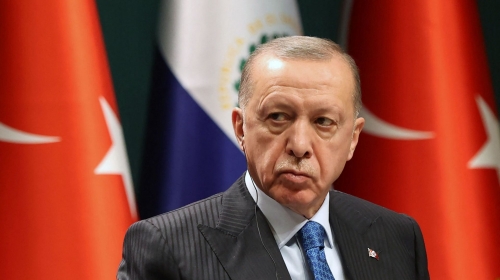
Erdogan tonne contre Israël mais vend de l'énergie à Tel Aviv. Et seuls les journalistes américains ont peur
Enrico Toselli
Source: https://electomagazine.it/erdogan-tuona-contro-israele-ma-vende-energia-a-tel-aviv-e-si-spaventano-solo-i-giornalisti-usa/#google_vignette
Le "boucher de Tel-Aviv", comme Erdogan a appelé Netanyahou, a recommencé à massacrer des civils à Gaza, tandis que ses tireurs d'élite ont assassiné deux enfants de 9 ans en Cisjordanie. Et le dirigeant turc hausse encore le ton. Il fulmine. Il demande que les Israéliens soient jugés pour crimes de guerre. Mais, dans les faits, il ne fait absolument rien. À tel point que les Iraniens, furieux, ont fait capoter une réunion au sommet. Téhéran voudrait qu'Ankara ferme les robinets de l'énergie vendue à Israël, mais Erdogan regarde les comptes et, tout en vociférant, continue d'encaisser.
Parce que les Palestiniens sont des amis, mais que les Israéliens ont l'argent. Logique levantine, trop compliquée pour les jeunes esprits des médias américains qui ne peuvent comprendre le triple, quadruple jeu des Turcs sur la scène internationale. Pour eux, les cow-boys de l'information, vous êtes soit avec eux, soit contre eux. Si vous obéissez à RimbanBiden, si vous défendez les intérêts américains, vous faites partie des gentils. Comme Meloni, comme Scholz. Si vous êtes contre eux, vous êtes un méchant à la tête d'un État voyou. Cela vaut pour la Russie, pour l'Iran, pour la Chine (bien qu'il faille le dire à voix basse).
Mais il y a eu ensuite le comportement ambigu de ceux qui faisaient partie des gentils. La Turquie, surtout. Celle que les esprits simples des journalistes yankees appelaient "la malade de l'Otan". Car Erdogan n'a pas encore donné son feu vert à l'adhésion de la Suède. Il augmente le prix pour l'accorder. Il veut des avions que les États-Unis ne veulent pas lui donner. Et pendant ce temps, il flirte avec Poutine et fait du commerce avec Zelensky. Il s'étend en Afrique et trouve des intérêts communs avec l'Iran. Il ignore les Ouïghours, son peuple frère, en Chine pour avoir les coudées franches dans les négociations avec Pékin. Il fait la nique à l'Union européenne dont, après tout, il peut aussi se passer. Il dit oui à tout le monde et fait ce qu'il pense être bon pour la Turquie.
Dans la pratique, il se contente de faire de la politique étrangère. De manière cynique, parfois exaspérante. Mais en gardant à l'esprit, contrairement à d'autres, qu'il est là pour protéger les intérêts turcs. Pas ceux des États-Unis, de la Russie ou de la Chine. Conscient qu'il est un non-arabe avec de nombreux voisins arabes. Et d'être placé dans un carrefour extrêmement complexe et difficile.
Il est sans doute plus facile de rester dans la niche à attendre les ordres de Washington. Avec la seule pensée de devoir faire des déclarations absurdes pour justifier l'injustifiable. En faisant semblant de ne pas voir que les voisins deviennent eux aussi nerveux. Mais il suffit d'un voyage dans les châteaux pour que la politique étrangère soit oubliée.
19:54 Publié dans Actualité | Lien permanent | Commentaires (0) | Tags : erdogan, turquie, politique internationale, israël, palestine, levant, proche-orient |  |
|  del.icio.us |
del.icio.us |  |
|  Digg |
Digg | ![]() Facebook
Facebook
lundi, 29 mai 2023
Erdogan gagne, les néoconservateurs perdent
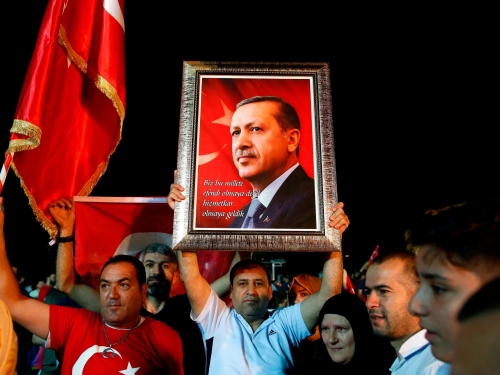
Erdogan gagne, les néoconservateurs perdent
Source: https://www.piccolenote.it/mondo/vince-erdogan-perdono-i-neocon
C'est un Erdogan rajeuni qui a célébré sa réélection devant une foule immense. L'Occident avait parié contre lui et a "perdu", comme il l'a dit dans son premier discours. Et, en effet, les milieux hyper-atlantistes avaient fait des pieds et des mains pour soutenir son adversaire Kemal Kilicdaroglu, qui avait promis de ramener la Turquie à l'obéissance silencieuse aux diktats de l'OTAN et d'engager Ankara dans l'acharnement anti-russe (Responsible Statecraft).
Même si les intentions de Kilicdaroglu étaient quelque peu illusoires, puisque toutes les forces qui le soutenaient n'avaient pas le même penchant atlantiste, cela aurait certainement affaibli l'axe existant avec la Russie.
Cela n'a pas été le cas, et maintenant Erdogan, qui pour gagner s'est éloigné encore plus de l'Occident, se sentira encore plus ferme pour persévérer dans la ligne suivie jusqu'à présent, qui lui a attiré le consensus dans son pays.
Une ligne qui ne renie pas les relations établies par Kemal Ataturk avec l'Occident, mais qui, en même temps, ne se sent pas liée par elles, conduisant son pays à rétablir avec l'Orient des relations qui avaient été rompues au nom des diktats atlantistes.
Il est intéressant de noter que la victoire électorale n'a pas suscité de protestations, bien que certains médias aient fait état d'une prétendue fraude électorale de la part de l'autorité centrale.
En d'autres temps (en Ukraine - en 2014 - ou au Venezuela - en 2019 - pour ne citer que deux cas frappants), de telles allégations avaient servi de base au déclenchement de manifestations de rue contre la victoire volée, manifestations que l'Occident avait utilisées comme levier pour tenter de renverser le gouvernement élu.

Le fait qu'Erdogan a également été capable de gérer la période post-électorale est une autre indication de la force du sultan.
Il reste les nombreux problèmes de la Turquie, auxquels Erdogan est appelé à s'attaquer, notamment la reconstruction des zones touchées par le récent tremblement de terre. Et le caractère autoritaire de son gouvernement, un peu dénoncé par tous les médias occidentaux. Une propension qui n'est pourtant pas une marque de fabrique du sultan, la Turquie n'ayant connu que des pouvoirs forts depuis l'époque d'Atatürk.
Une dernière remarque concerne la guerre d'Ukraine, à propos de laquelle Erdogan a joué le rôle de médiateur, parvenant même à accueillir plusieurs réunions entre les parties en conflit et à faciliter le seul accord conclu entre elles, celui concernant le transit des céréales ukrainiennes.
Un travail qu'il a dû abandonner ces derniers mois en raison de l'engagement électoral qui l'a complètement absorbé. Maintenant qu'il est plus fort, il peut reprendre ce rôle, augmentant ainsi les chances de ceux qui tentent de rétablir la paix dans ce pays européen ravagé.
19:58 Publié dans Actualité, Politique | Lien permanent | Commentaires (0) | Tags : actualité, politique internationale, turquie, erdogan, asie mineure, politique, élections turques |  |
|  del.icio.us |
del.icio.us |  |
|  Digg |
Digg | ![]() Facebook
Facebook
La Turquie maintient le cap : Erdogan clairement réélu au second tour
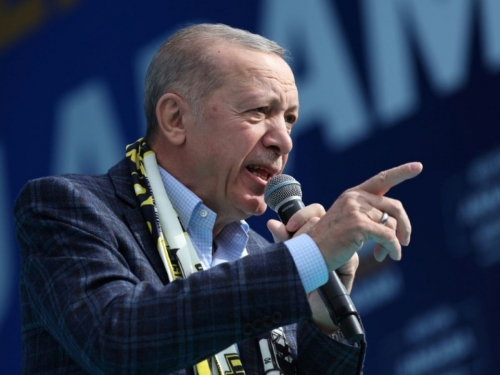
La Turquie maintient le cap: Erdogan clairement réélu au second tour
Source: https://zuerst.de/2023/05/29/die-tuerkei-bleibt-auf-kurs-erdogan-im-zweiten-wahlgang-klar-bestaetigt/
Ankara. La Turquie a voté - et elle a finalement choisi assez clairement Erdogan lors du second tour de l'élection présidentielle du 28 mai qui opposait le chef du gouvernement de longue date, Erdogan, à son challenger Kemal Kilicdaroglu. Erdogan a obtenu 52,16% des voix dimanche soir après le dépouillement de tous les votes, contre 47,84% pour Kilicdaroglu. Le troisième candidat, Sinan Ogan, de la coalition de droite Ata Ittifaki, avait également voté pour Erdogan au premier tour, il y a deux semaines, et a appelé ses partisans à voter pour lui au second tour.
Le résultat du scrutin est avant tout une déception pour les élites libérales de gauche occidentales, qui avaient clairement favorisé Kilicdaroglu. Ce dernier s'était engagé à renforcer les liens entre la Turquie et l'Occident et, surtout, à promouvoir les "valeurs européennes" telles que le culte LGBTiste. Pourtant, il n'y a pas si longtemps, son propre parti, le CHP (Parti républicain du peuple), était considéré par les observateurs occidentaux comme "élitiste" et "nationaliste". L'alliance électorale de Kilicdaroglu avait même envisagé un "changement de régime" en cas d'arrivée au pouvoir, afin de mettre la Turquie sur la voie de l'Occident.
Malgré les difficultés économiques considérables de la Turquie, l'inflation galopante et, plus récemment, les manquements du gouvernement après le tremblement de terre de début février, la majorité des électeurs turcs n'ont pas voulu de changement et ont manifesté leur confiance dans le président sortant Erdogan, qui dirige le pays depuis maintenant 20 ans.
Le Premier ministre hongrois Orbán a été l'un des premiers à le féliciter dimanche. Sur Twitter, il a écrit qu'il s'agissait d'une "victoire sans équivoque". Le chef du Kremlin, M. Poutine, a également adressé ses félicitations dimanche soir, avant même le dépouillement de tous les votes. Au grand dam de l'Occident, Erdogan a renforcé ses relations avec la Russie au cours des dernières années et ne supporte pas les sanctions occidentales.
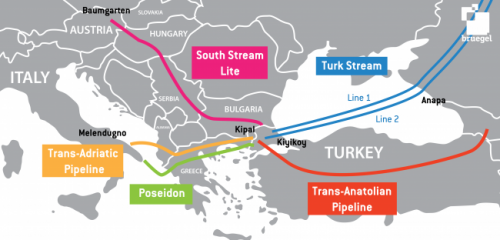
Au contraire, Ankara peut se réjouir du rôle privilégié d'intermédiaire énergétique russe - en contrepartie des voies de transport de gaz et de pétrole d'Europe de l'Est, de plus en plus incertaines ces dernières années, le gaz russe s'écoule depuis 2020 directement de la Russie vers la Turquie via le gazoduc Turk Stream.
Le challenger malheureux Kilicdaroglu a entre-temps reconnu le résultat des élections et a déclaré qu'il n'avait pas l'intention de les contester (mü).
Demandez ici un exemplaire gratuit du magazine d'information allemand ZUERST ! ou abonnez-vous dès aujourd'hui à la voix des intérêts allemands !
Suivez également ZUERST ! sur Telegram : https://t.me/s/deutschesnachrichtenmagazin
19:47 Publié dans Actualité, Politique | Lien permanent | Commentaires (0) | Tags : actualité, turquie, asie mineure, politique, élections turques, erdogan |  |
|  del.icio.us |
del.icio.us |  |
|  Digg |
Digg | ![]() Facebook
Facebook
dimanche, 28 mai 2023
Fractures turques
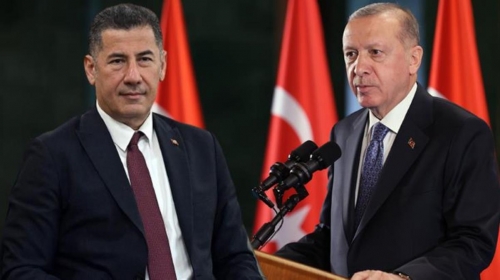
Fractures turques
par Georges FELTIN-TRACOL
Sinan Oğan est la grande surprise du premier tour de la présidentielle turque. Certes, il ne se qualifie pas pour le second tour, mais ses 5,17 % pèsent déjà sur le duel entre le président sortant Recep Tayyip Erdoğan qui frôle la réélection avec 49,52 % et son rival républicain du peuple Kemal Kılıçdaroğlu (44,88 %). Quant au quatrième candidat issu du Parti de la mère-patrie d’orientation libérale-conservatrice, Muharrem İnce se retire dans les derniers jours de la campagne, d’où son 0,43 %.
Quelques esprits forts pointent aussitôt l’activisme débordant de l’AKP (Parti de la Justice et du Développement) auprès des classes les plus populaires, activisme qualifié de « clientélisme ». Dommage qu’ils ne mentionnent jamais le clientélisme gigantesque du Parti démocrate de Joe Biden dans certains États, comtés et municipalités des États-Unis.
On peut croire que les électeurs de Sinan Oğan se reporteront sur le président Erdoğan au second tour. La vie politique turque est en réalité plus subtile. Âgé de 55 ans et d’origine azerbaïdjanaise, Sinan Oğan a étudié à Moscou au début du XXIe siècle. Il milite de 2010 à 2015 au sein du mouvement pantouranien MHP (Parti d’action nationaliste) de Devlet Bahçeli dont il devient l’un des députés. En 2015, le MHP l’exclut, car il refuse le rapprochement entamé avec l’AKP.
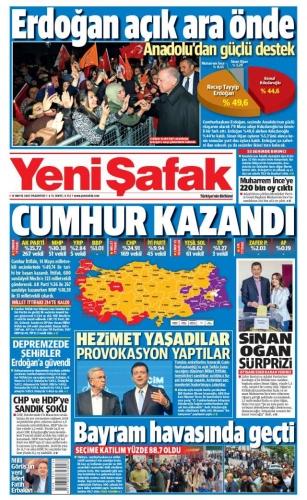
À l’occasion de cette campagne présidentielle, Sinan Oğan se présente au nom de l’Alliance ancestrale, une coalition électorale récente des pantouraniens radicaux du Parti de la Victoire, des conservateurs libéraux du Parti de la Justice, des kémalistes sociaux du Parti « Mon Pays » et des progressistes du Parti de l’Alliance turque. Le candidat de cette entente veut d’une part interdire l’ensemble des formations politiques kurdes, séparatistes et loyalistes. Il dénonce d’autre part avec une rare insistance les 4,5 millions d’étrangers dont 3,5 millions de réfugiés syriens. Il ne souhaite pas assister au début d’un grand remplacement des Turcs. Il se montre enfin fort méfiant envers les islamistes.
C’est un point d’accord avec Kemal Kılıçdaroğlu dont les aïeux kurdes et alévis seraient originaires de la région arabophone iranienne du Khouzistan. Les observateurs le peignent régulièrement en pantin atlantiste, ce qui est exagéré. Le candidat kémaliste entretient volontiers de bonnes relations avec l’Irak, l’Iran et la Syrie. S’il était élu, sa présidence provoquerait tôt ou tard de profondes divergences au sein de l’Alliance de la nation entre les pro-occidentaux et les tenants du non-alignement.
La bipolarisation exprimée au moment de la présidentielle masque un foisonnement politique considérable avec des unions circonstancielles et hétéroclites dues au mode de scrutin. Un multipartisme vivace s’épanouit sous un apparent dualisme pour le plus grand plaisir des électeurs. L’abstention est autour de 14 % et les votes blancs et nuls ne dépassent pas les 2 %.
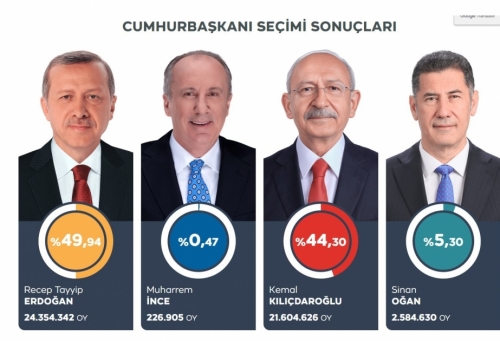
L’Alliance de la nation regroupe les kémalistes historiques du CHP (Parti républicain du peuple), les conservateurs musulmans du Parti démocrate, les islamistes traditionalistes du Parti de la Félicité, le Parti de la Démocratie et du Progrès, le Parti pour le changement de la Turquie, le Parti du Futur de l’ancien Premier ministre AKP Ahmet Davutoğlu, et les nationalistes du Bon Parti. Fondé et dirigé par Meral Akşener qu’on dit proche des milieux atlantistes, le Bon Parti soutient une ligne nationale-laïque intransigeante. Ministresse de l’Intérieur entre 1996 et 1997, elle a fortement réprimé l’opposition kurde, d’où des tiraillements répétés avec ses partenaires de la « Table des Six ». L’hétérogénéité de la coalition explique-t-elle son échec aux élections législatives ?
En effet, le 14 mai dernier, les électeurs turcs participent à la fois aux élections présidentielles et législatives. Depuis la révision constitutionnelle de 2017 qui établit un régime présidentialiste, les mandats du président et des députés sont concomitants. Si le président démissionne ou s’il dissout le parlement, chef d’État et députés retourneront en même temps aux urnes. Cette articulation originale a été proposée dans la décennie 1990 en France par Jean-Pierre Chevènement qui reprenait une idée du club Jean-Moulin, un cénacle de la gauche technocratique des années 1960.
La Grande Assemblée nationale compte 600 membres élus pour cinq ans au scrutin proportionnel de liste bloquée à un seul tour dans 87 circonscriptions, en général des provinces mais pas toujours, au prorata du nombre d’habitants. Le seuil d’élection de 10 % a été abaissé à 7 %.
L’Alliance de la nation réalise 35,02 %, gagne 24 sièges, soit 212 élus (169 pour le CHP et 43 pour le Bon Parti). Elle subit la concurrence inévitable de l’Alliance du travail et de la liberté qui rassemble les Kurdes du HDP (Parti démocratique des peuples), le Parti des travailleurs de Turquie et le Parti de la Gauche verte éco-socialiste libertaire. Ce regroupement de gauche sociétale fait 10,54 %, compte 65 députés et perd deux sièges.
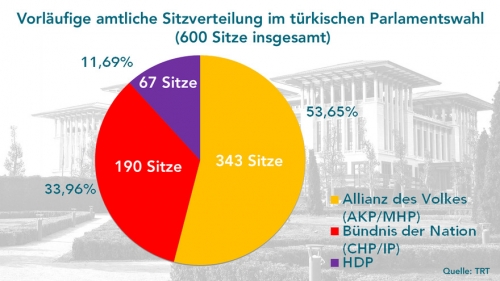
Le grand vainqueur des législatives est donc le camp présidentiel avec 49,40 %. Malgré une perte de 26 sièges et un recul de près de sept points par rapport à 2018, l’Alliance du peuple remporte 323 élus : 268 pour l’AKP, 50 pour le MHP qui augmente d’un siège et 5 pour les islamistes du Nouveau parti de la Prospérité de Fatih Erbakan, fils du mentor d’Erdoğan. Il faut inclure dans cette alliance présidentielle les nationaux-islamistes panturcs du Parti de la Grande Unité qui perdent leur unique siège, les sociaux-démocrates du Parti de la Gauche démocratique et les Kurdes islamistes traditionalistes anti-séparatistes du Parti de la Cause libre qui s’inspirent de la Garde de Fer roumaine. Pour l’anecdote, le parti La Patrie de l’eurasiste de gauche radicale Doğu Perinçek ne recueille pour sa part que 54.789 voix (0,10 % et perd 0,13 point…).
Si Kemal Kılıçdaroğlu accède à la présidence de la République, il devra cohabiter avec un parlement hostile bien que la nouvelle constitution limite strictement ses prérogatives. On comprend mieux pourquoi Sinan Oğan se pose en faiseur de roi. Il a dès à présent interpellé les deux finalistes au sujet de l’immigration massive qui bouleverse la donne démographique turque.
La Turquie s’intègre de plus en plus dans les méandres de la « société liquide » ultra-libérale 3.0. Le surgissement de Sinan Oğan sur la scène politique signale la radicalisation nationale et identitaire d’une opinion publique très fracturée. Peu importe le président élu, le Bloc occidental atlantiste devra prendre en compte une nation turque fière et sûre d’elle-même. L’échéance électorale du 28 mai prochain se révèle ainsi décisif non seulement pour l’avenir de la Sublime Porte, mais aussi pour l’Europe, le Proche-Orient, le Caucase, l’espace pontique, l’Asie Centrale et même le continent africain.
GF-T
- « Vigie d’un monde en ébullition », n° 75, mise en ligne le 23 mai 2023 sur Radio Méridien Zéro.
11:47 Publié dans Actualité, Politique | Lien permanent | Commentaires (0) | Tags : turquie, erdogan, sinanogan, politique, politique internationale, asie mineure |  |
|  del.icio.us |
del.icio.us |  |
|  Digg |
Digg | ![]() Facebook
Facebook
vendredi, 12 mai 2023
La Turquie à la veille d'élections cruciales
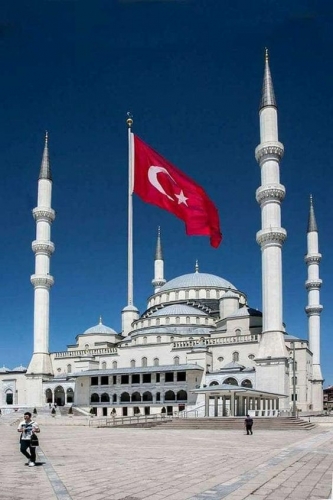
La Turquie à la veille d'élections cruciales
Source: https://katehon.com/ru/article/turciya-nakanune-reshayush...
La Turquie organise des élections présidentielles et législatives le 14 mai prochain. La situation politique interne du pays est très tendue. De facto, l'avenir du pays se jouera ce jour-là.
Principaux rivaux
L'événement principal des prochains jours en Turquie est l'élection présidentielle. Les deux principaux candidats sont le président sortant Recep Tayyip Erdogan et Kemal Kılıçdaroğlu, chef du Parti républicain du peuple (CHP). Les sondages d'opinion - selon les sympathisants des sondeurs, ils donnent un avantage de 1 % à l'un ou l'autre candidat. Mais un second tour est également tout à fait possible, car outre Kılıçdaroğlu et Erdoğan, plusieurs autres candidats se présentent et il est possible qu'aucun des principaux prétendants n'obtienne plus de 50 % des voix le 14 mai. Un second tour devrait alors être organisé dans une quinzaine de jours.
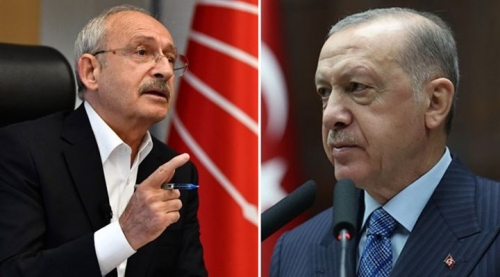
L'opinion publique est divisée en deux. Il s'agit en grande partie d'un vote pour ou contre Erdogan. Ainsi, Kılıçdaroğlu est soutenu par une coalition hétéroclite de partis, comprenant les kémalistes libéraux (CHP), les islamistes (SAADET), les anciens fonctionnaires d'Erdoğan Ali Babacan et Ahmet Davutoğlu avec leurs partis, et les nationalistes du Bon Parti (IYI). Outre ces structures politiques, qui se présentent également aux élections législatives sous la forme d'un bloc, l'Alliance nationale, la candidature de Kılıçdaroğlu aux élections présidentielles est également soutenue par le Parti démocratique des peuples kurde (HDP), qui est accusé d'avoir des liens avec le Parti des travailleurs du Kurdistan, un parti terroriste. La seule chose que toutes ces forces ont en commun est leur désir de renverser Erdogan à tout prix.
Repères en matière de politique étrangère
Dans sa campagne électorale, Recep Tayyip Erdoğan met en avant sa réussite à élever le rôle de la Turquie sur la scène internationale, à en faire un leader régional et à développer les infrastructures du pays. L'opposition, rassemblée autour de Kılıçdaroğlu, reproche aux autorités la détérioration de la situation économique de la Turquie, notamment ces dernières années, l'inflation et la dépréciation de la monnaie nationale, la livre turque.
L'opposition ne cache pas ses liens avec les Etats-Unis. Kılıçdaroğlu a récemment rencontré l'ambassadeur américain en Turquie, Geoffrey Flake. À l'automne dernier, il s'est rendu aux États-Unis, où il a disparu de la vue des journalistes pendant huit heures. On ne sait pas de quoi et avec qui il a discuté pendant cette période. Auparavant, le président américain Joe Biden avait ouvertement déclaré son intention d'évincer Recep Tayyip Erdogan lors des élections. Après les États-Unis, le principal rival d'Erdogan s'est rendu au Royaume-Uni pour y rencontrer des "investisseurs".
L'opposition espère une aide de l'Occident, notamment des pays anglo-saxons, dans le domaine économique. Si elle arrive au pouvoir, certaines positions géopolitiques de la Turquie pourraient devenir une monnaie d'échange.
En échange d'une aide financière et de la levée de certaines sanctions, Kılıçdaroğlu et son équipe pourraient opter pour une détérioration progressive des relations avec la Russie : en matière de sanctions anti-russes, de coopération technique et militaro-technique, de coordination des actions en Syrie, de corridor aérien vers la Syrie, d'assistance militaro-technique au régime de Zelenski.
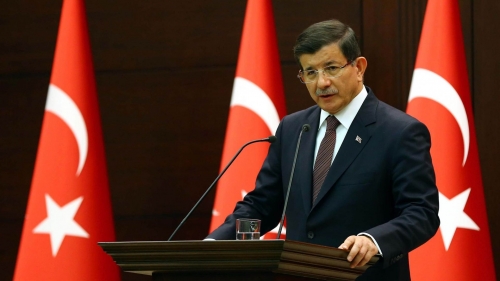
Dans une interview accordée au Wall Street Journal le 9 mai dernier, Kemal Kılıçdaroğlu a promis de se joindre aux sanctions anti-russes et de suivre la ligne de l'OTAN dans la politique étrangère du pays. Il ne faut pas oublier que l'équipe de Kılıçdaroğlu comprend Ahmed Davutoğlu (photo), l'architecte des politiques néo-ottomanes de la Turquie dans les années 2010, qui était premier ministre lors de la destruction tragique en 2015 d'un Su-25 russe dans le ciel de la Syrie. Les pilotes qui ont abattu l'avion ont agi sur ordre de Davutoğlu. Davutoğlu, malgré son néo-ottomanisme, est également un homme politique pro-américain.
Dans le même temps, les États-Unis n'ont pas utilisé tous les leviers à leur disposition pour soutenir l'opposition. Cela pourrait signifier qu'ils font pression sur l'équipe d'Erdogan en même temps, montrant qu'ils sont prêts à travailler avec eux aussi, mais en échange de certaines concessions.
Conséquences immédiates
À la veille de l'élection, chacune des parties en présence a fait savoir que, dans certaines circonstances, elle pourrait ne pas accepter les résultats. Suleyman Soylu, chef de la MIL turque, affirme que les États-Unis tentent d'interférer dans les élections turques. Pour sa part, Muharrem Erkek, adjoint de Kemal Kılıçdaroğlu, a accusé Soylu lui-même d'avoir préparé le trucage. Une situation a été créée qui pourrait se transformer en une tentative de "révolution de couleur" ou, à tout le moins, en troubles de masse.
Une crise de pouvoir prolongée pourrait également se produire si une force politique remporte les élections présidentielles et une autre les élections législatives. Cela est possible dans une société divisée.
Si l'opposition turque l'emporte, il est fort probable que les divisions internes au sein d'un camp uni par le seul désir de se débarrasser d'Erdogan s'intensifieront. Les contradictions internes sont susceptibles de conduire à une scission et à des élections anticipées dans les six prochains mois. Il convient de noter que l'opposition, à l'exception de Babacan et Davutoğlu, n'a aucune expérience de la gestion d'un État depuis 20 ans. La Turquie a beaucoup changé sous le règne d'Erdogan. Il est probable qu'en l'absence d'une figure charismatique à la barre, ils ne seront pas en mesure de faire face à la gouvernance de l'État et de régler les différends internes, ce qui entraînera une aggravation des tendances à la crise en Turquie.
Les grâces accordées pour le coup d'État de 2016 inspiré par Fethullah Gulen, basé aux États-Unis, pourraient entraîner de graves problèmes internes et une détérioration des relations avec la Russie.
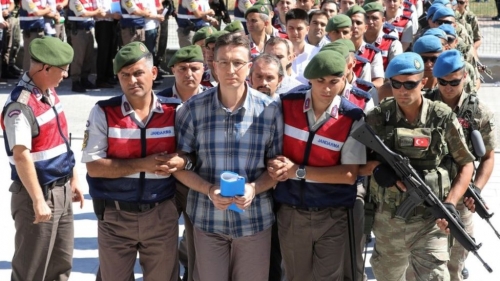
Kılıçdaroğlu avait précédemment promis "le soleil et le printemps" aux personnes renvoyées pendant les décrets relatifs à l'état d'urgence. Après la tentative de coup d'État de 2016, plus de 170.000 fonctionnaires et militaires, professeurs d'université et des centaines de médias et d'ONG ont été licenciés en Turquie en deux ans pour leurs liens avec l'organisation de Gulen. Des poursuites ont été engagées contre 128.000 personnes soupçonnées d'avoir participé au coup d'État.
Soutenir les participants au putsch, les gracier et les renvoyer de l'étranger, y compris à des postes gouvernementaux, alors que la Russie a joué un rôle clé dans l'échec du putsch en avertissant Erdogan de la tentative de coup d'État, pourrait conduire au renforcement d'une strate anti-russe au sein de l'élite dirigeante, des médias et des ONG de Turquie et à l'expansion des mécanismes de gouvernance externe dans le pays. À l'intérieur de la Turquie, une telle amnistie conduirait à un affrontement avec les opposants au putsch, qui sont descendus dans la rue en 2016 pour défendre le pays contre les gülenistes.
Cependant, la victoire d'Erdoğan et de son Parti de la justice et du développement (AKP) n'augure pas d'un redressement prochain du pays. Jusqu'à présent, les dirigeants turcs actuels ne montrent aucun signe de capacité à résoudre les problèmes économiques. Un autre problème pourrait être une crise de pouvoir au sein du parti. Le parti d'Erdogan est uni autour de son leader charismatique. Une détérioration significative de sa santé ces derniers temps pourrait entraîner une augmentation des tendances centrifuges au sein des "élites erdoganistes". Il existe déjà un "pôle patriotique" conditionnel représenté par le ministre de l'intérieur Suleyman Soylu, qui critique constamment les États-Unis, et un pôle axé sur le dialogue avec l'Occident représenté par le porte-parole d'Erdoğan, Ibrahim Kalın, et le ministre des affaires étrangères Mevlüt Çavuşoğlu, qui ne cessent de parler de la loyauté de la Turquie à l'égard des engagements euro-atlantiques.
Il est clair que la Russie devra trouver une approche de ces élites au-delà de la relation personnelle entre le président Poutine et le président Erdogan. Toutes les voies possibles de communication et de rapprochement doivent être envisagées, à la fois sur la base d'intérêts pragmatiques et des vues idéologiques des personnages clés : l'antiaméricanisme (Soylu) et le traditionalisme (Kalın - en tant qu'adepte du philosophe René Guénon et des mystiques islamiques : Ibn Arabi et Mulla Sadr).
17:43 Publié dans Actualité, Politique | Lien permanent | Commentaires (0) | Tags : actualité, politique internationale, turquie, asie mineure, erdogan, élections turques, élections turques 2023, géopolitique |  |
|  del.icio.us |
del.icio.us |  |
|  Digg |
Digg | ![]() Facebook
Facebook
jeudi, 20 avril 2023
Les élections en Turquie auront-elles un impact sur la place de ce pays dans un monde multipolaire ?
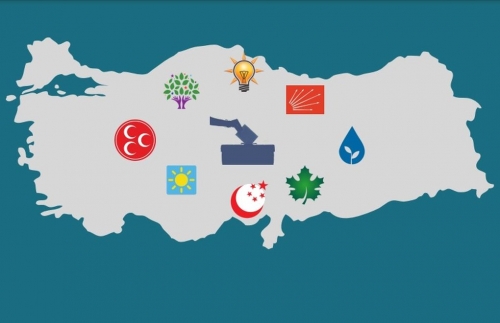
Les élections en Turquie auront-elles un impact sur la place de ce pays dans un monde multipolaire ?
Ceyda Karan
Source: https://katehon.com/en/article/will-turkiyes-elections-impact-its-place-multipolar-world?fbclid=IwAR0KrOHugXwmcJqAKhblX71bm5L1egKixOQ5hQ4pNet4SFLT6Yx1j-dMkJ8
Une victoire de l'opposition aux prochaines élections pourrait "occidentaliser" la politique étrangère de la Turquie et perturber le délicat exercice d'équilibre d'Ankara dans le nouvel ordre multipolaire.
Le 14 mai 2023, des élections très attendues, mais néanmoins cruciales, auront lieu en Turquie pour élire le président et les députés. Ces élections sont cruciales pour le président Recep Tayyip Erdogan, dont la réputation politique intérieure a été ternie par sa gestion du tremblement de terre du 6 février, aggravée par une crise économique de plus en plus grave au cours des deux dernières années.
Malgré les manœuvres pragmatiques visant à équilibrer l'Est et l'Ouest, la politique étrangère d'Erdogan est également critiquée. Non seulement le dirigeant turc de longue date est confronté à la plus grande épreuve de sa carrière politique, mais l'orientation future de la Turquie est également susceptible d'être remise en question.
Au cours des deux dernières semaines, plusieurs partis, dont le parti DEVA, le bon parti, le jeune parti, le parti de la libération du peuple, le parti de la gauche, le parti de la patrie et le parti de la résurrection, se sont opposés à la candidature d'Erdogan.
Cette objection a rallié les nationalistes, les socialistes, le centre-droit, les islamistes, les kémalistes et les "sept dissemblances" de la politique turque.
Le principal parti d'opposition, le Parti républicain du peuple (CHP), qui est le parti fondateur de la Turquie, n'a pas tenté de s'opposer à la candidature d'Erdogan.
Candidature d'Erdogan à un troisième mandat
D'éminents juristes expliquent qu'en vertu de l'article 101 de la Constitution turque, en vigueur depuis 2007, "une personne ne peut être élue président que deux fois au maximum". Erdogan a été élu en 2014 et en 2018, et il a déjà effectué deux mandats.
La seule exception à l'article 101 serait si le parlement décidait de renouveler les élections. Cependant, le parti Justice et Développement (AKP) d'Erdogan ne se réfère pas à la Constitution, mais au Conseil électoral suprême (YSK), dont les pouvoirs sont limités à l'administration générale et à la supervision des élections.
L'AKP affirme que les modifications techniques du "système de gouvernement présidentiel", introduites lors du référendum controversé de 2017 au cours duquel le YSK a reconnu les votes non scellés comme étant valides, rendent la candidature d'Erdogan possible. En d'autres termes, même si la Constitution reste en place, le premier mandat d'Erdogan ne compte pas.
Par le passé, Erdogan a déclaré "nous ne reconnaissons pas" les décisions de la Cour constitutionnelle. En fait, l'élection de la municipalité métropolitaine d'Istanbul, qui a battu son parti à plate couture en 2019, a été répétée sans aucune base juridique. Le résultat a été une défaite encore plus importante pour l'AKP.
En bref, le CHP a accepté la troisième nomination d'Erdogan sur la base de ses antécédents en matière de respect de la loi écrite. Le fait d'insister sur le contraire pourrait jouer dans le "récit de victimisation" qu'il a effectivement utilisé au cours des deux dernières décennies.
Le Conseil électoral suprême a récemment annoncé les candidats à la présidence qui s'affronteront le 14 mai :
Erdogan se présente en tant que candidat de l'"Alliance du peuple (Cumhur)", qui comprend l'AKP, le Parti du mouvement nationaliste (MHP), le Parti de la grande unité (BBP), le Nouveau parti de la prospérité (YRP) et l'HUDA-PAR.
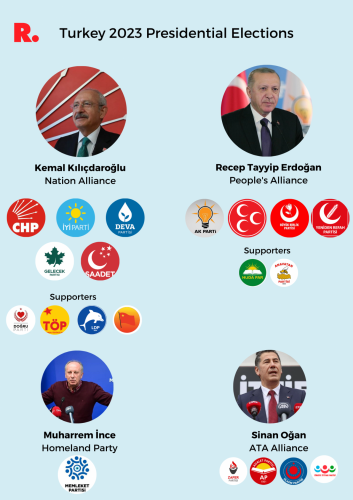
Kemal Kilicdaroglu, quant à lui, se présente comme le candidat de l'"Alliance de la Nation (Millet)", qui comprend le CHP, le Bon Parti, le Parti de la Félicité (SAADET), le Parti Démocratique (DP), le Parti de la Démocratie et du Progrès (DEVA) et le Parti de l'Avenir (GP). Cette alliance électorale est également connue sous le nom de coalition de la "table des six".
Outre ces deux principaux rivaux, il y a deux autres candidats : Muharrem Ince et Sinan Ogan. Ince était le candidat commun de l'opposition en 2018, mais il a quitté le CHP après avoir perdu face à Erdogan, et il a maintenant fondé le Parti de la patrie.
Ogan, un ancien député, a été exclu du MHP, le partenaire d'Erdogan, en 2017 et se présente en tant que candidat de l'Alliance Ata, qui réunit quatre petits partis nationalistes et kémalistes de droite.
Erdogan est confronté à un défi de taille cette fois-ci, car les sondages donnent Kilicdaroglu en tête avec 2,5 à 5 points d'avance. La possibilité d'un second tour est également envisagée en raison du facteur Muharrem Ince.
Alliances inattendues
Bien que les petits partis disparates de la politique turque n'apprécient pas l'"Alliance nationale", ils soutiennent principalement Kilicdaroglu pour éjecter Erdogan après deux décennies de règne.
La principale opposition turque de la "Table des Six" a finalement réussi à s'unir derrière Kilicdaroglu après de douloureuses discussions, mais un facteur encore plus critique favorisant son éligibilité est le parti pro-kurde de la démocratie des peuples (HDP), qui soutient indirectement Kilicdaroglu (sous la menace d'être fermé) en ne présentant pas son propre candidat.
Les 9 à 13 % de voix du HDP sont particulièrement importants, car ils ont obligé Erdogan à élargir son alliance d'une manière surprenante.
Au début des années 2000, Erdogan et l'AKP ont émergé du "Parti du bien-être" de la Vision nationale de Necmettin Erbakan, qui avait été la marque de fabrique de l'islamisme turc au 20e siècle. Un an avant sa mort, Erbakan, un important mentor de l'actuel président turc, a critiqué Erdogan pour être "le caissier du sionisme".
Fin mars, son fils Fatih Erbakan, chef du Nouveau parti du bien-être, qu'il a fondé sur la base de l'héritage de son père, a refusé de rejoindre l'Alliance populaire d'Erdogan en invoquant des "principes", mais a capitulé peu après pour rejoindre son vieil ennemi. Cependant, le parti Felicity (SAADET), dont les racines se trouvent également dans la Vision nationale d'Erkaban père, s'est aligné sur l'Alliance nationale de Kilicdaroglu.
Mais l'initiative la plus frappante d'Erdogan pour élargir son alliance est venue du HUDA-PAR, que les experts politiques associent au "Hezbollah turc" ou "Hezbollah kurde", un mouvement soutenu par l'État qui a perpétré des attentats terroristes dans le sud-est de la Turquie à la fin des années 1980 et dans les années 1990.
"La philosophie, les convictions et les fondateurs [de l'HUDA-PAR] sont exactement les mêmes" que ceux du Hezbollah turc, déclare Hanefi Avci, chef de police à la retraite de renommée nationale. Ce dernier, dès sa création, a été officiellement désigné comme une organisation terroriste, et nombre de ses associations affiliées ont été systématiquement fermées. Parfois confondu avec l'organisation de résistance chiite libanaise Hezbollah, le mouvement turc est aux antipodes : il est au contraire fortement imprégné de l'idéologie des extrémistes religieux kurdes sunnites.
L'inclusion de l'HUDA-PAR dans l'alliance d'Erdogan a soulevé des questions au sein de l'opinion publique turque quant à ses motivations, les avis divergeant à ce sujet. Certains pensent qu'Erdogan tente de séduire les Kurdes religieux, tandis que d'autres voient dans son alliance avec ce parti très controversé un signe de son désespoir électoral. Le parti ne représentant pas un nombre significatif d'électeurs, on ne sait pas encore pourquoi le président turc s'est lancé dans une telle aventure.
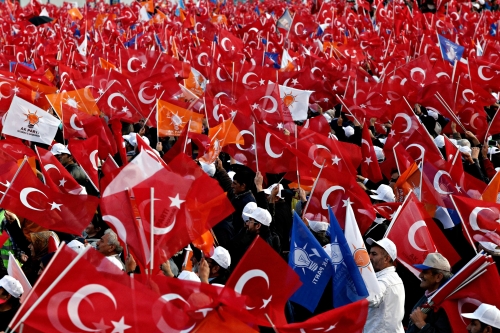
Promesses populistes et manœuvres de politique étrangère
Les précédentes victoires électorales d'Erdogan étaient en grande partie dues à ses tactiques agressives, mais après 20 ans, cette approche n'est plus fiable. L'effondrement de la livre turque - déclenché par la décision d'Erdogan de réduire les taux d'intérêt fin 2021 sur la base de la règle islamique du "nas" - et l'inflation, qui a atteint 70 % et, officieusement, 140 %, sont des problèmes majeurs pour l'électeur turc moyen. Les tremblements de terre dévastateurs qui ont eu lieu le 6 février ont encore plus déstabilisé l'économie turque.
Pour tenter de regagner des soutiens, Erdogan axe sa campagne sur des promesses de reconstruction. Il a mis en œuvre des politiques économiques populistes telles que l'augmentation du salaire minimum, qui est la principale source de revenus pour environ 60 % des Turcs, et l'augmentation des salaires des fonctionnaires et des pensions.
Erdogan est connu pour sa capacité à utiliser habilement la politique étrangère de la Turquie comme un outil pour atteindre des objectifs de politique intérieure et extérieure. Toutefois, ces dernières années, les perspectives économiques de la Turquie ont mis à mal les calculs de politique étrangère d'Erdogan.
Depuis l'effondrement des projets néo-ottomans soutenus par les États-Unis en Asie occidentale et en Afrique du Nord, Erdogan a cherché des approches plus pragmatiques qui donnent la priorité à la realpolitik plutôt qu'à l'idéologie. Le président turc a fait marche arrière sur un certain nombre de questions, notamment la réconciliation avec les dirigeants régionaux qu'il a publiquement dénigrés et l'adoption d'une position neutre dans la crise ukrainienne entre les États-Unis et la Russie.
Les efforts d'Erdogan ont parfois eu des effets positifs immédiats : En améliorant leurs relations avec l'Arabie saoudite et les Émirats arabes unis, les deux pays ont investi des milliards de dollars en Turquie, même si les détails de ces accords restent flous.
Erdogan a également fait amende honorable avec le président égyptien Abdel Fattah al-Sisi, qu'il avait précédemment accusé d'avoir orchestré un coup d'État contre le gouvernement élu dirigé par les Frères musulmans. Ces réconciliations ont donné lieu à des négociations sur des questions liées à la confrérie et à la Libye.
Les défis de la politique étrangère d'Erdogan
Les relations avec la Russie et la Syrie restent toutefois deux des questions les plus épineuses pour Ankara, principalement parce qu'elles placent la Turquie dans le collimateur des principaux objectifs de politique étrangère de Washington.
Les intérêts en jeu sont on ne peut plus clairs : la Turquie dépend de la Russie pour l'énergie et le tourisme, tandis que la Russie a besoin de la Turquie pour atténuer l'impact des sanctions américaines.
Malgré les efforts de pragmatisme d'Erdogan en matière de politique étrangère, ses tentatives de réconciliation avec le dirigeant syrien Bashar al-Assad se sont enlisées en raison des objections des États-Unis et des conditions posées par Damas. Bien qu'Erdogan ait fait part de sa volonté de se réconcilier avec Assad en novembre dernier, la question n'a pas beaucoup progressé, malgré des réunions de haut niveau entre leurs responsables, sous la médiation de la Russie.
Les ministres de la défense turc et syrien se sont rencontrés à Moscou en décembre 2022, et si leurs vice-ministres des affaires étrangères respectifs se sont brièvement rencontrés les 3 et 4 avril, les réunions officielles de haut niveau ne se sont pas encore concrétisées. C'est le signe que la volonté politique ou les conditions de terrain ne sont pas encore réunies pour accélérer la diplomatie, d'un côté comme de l'autre.
Cela est dû en grande partie à la ligne rouge syrienne qui exige l'évacuation de toutes les troupes turques du sol syrien avant que les pourparlers de rapprochement ne progressent. Pourtant, lors d'une réunion avec son homologue russe Sergey Shoigu, le ministre turc de la défense Hulusi Akar a encore affirmé que la présence militaire turque en Syrie était destinée à la "lutte contre le terrorisme", au "maintien de la paix" et à l'"aide humanitaire".

Certains commentateurs estiment qu'il sera difficile pour l'armée turque de se retirer de Syrie et de satisfaire aux conditions d'Assad en raison de l'activité continue des milices séparatistes kurdes dans le nord du pays et des problèmes posés par les organisations islamistes radicales soutenues par la Turquie à Idlib.
Même la rhétorique d'Erdogan sur le rapatriement des trois millions de réfugiés syriens a perdu de sa crédibilité en raison de l'emploi de cette main-d'œuvre bon marché par des chefs d'entreprise liés à l'AKP. Tous ces facteurs font qu'il est de plus en plus difficile pour Erdogan de réussir sa politique étrangère avant les élections de mai.
Engin Solakoglu, diplomate turc à la retraite, explique à The Cradle que si l'AKP a pu étendre l'autonomie de sa politique étrangère en raison de l'affaiblissement de l'influence régionale des États-Unis, il opère toujours dans le cadre des relations existantes de la Turquie avec l'Occident : "Les fonds dont l'économie turque a chroniquement besoin proviennent principalement des centres financiers européens", explique-t-il.
Selon le professeur Behlul Ozkan, si les pays de taille moyenne comme la Turquie ont la capacité d'agir parfois de manière indépendante en matière de politique étrangère, la vision du monde d'Erdogan ne penche pas vers l'eurasisme, comme le prétendent souvent les experts occidentaux et orientaux.
Ozkan souligne le rôle important joué par l'Occident dans l'économie turque au cours des deux dernières décennies :
"Si Erdogan et l'AKP remportent les élections, il est fort possible que la Turquie devienne encore plus dépendante de l'Occident pour sortir de sa crise économique. Le rôle de l'AKP pour la Turquie est d'être le gendarme de l'Occident dans la région, comme il l'était pendant la guerre froide".
La vision du monde de l'opposition
Au lieu de tirer parti des contraintes et des vulnérabilités d'Erdogan en matière de politique étrangère, l'opposition multipartite a présenté un "protocole d'accord commun" peu convaincant, qui n'aborde guère son programme extérieur. Plus de platitudes que de substance, l'opposition met l'accent sur un principe de "paix à la maison, paix dans le monde" et affirme que l'intérêt national et la sécurité seront à la base de ses politiques.
Le document indique également que "les relations avec les États-Unis devraient être institutionnalisées dans le cadre d'une entente entre égaux", alors que la Russie n'est mentionnée qu'à deux reprises. Il convient également de noter que le CHP a récemment rappelé à Moscou que la Turquie est "un pays de l'OTAN".
Selon Hazal Yalin, chercheur et écrivain spécialisé dans les affaires russes, l'incapacité de la bourgeoisie turque à rompre les liens avec l'impérialisme occidental rend difficile la communication de l'opposition turque avec la Russie. Comme il l'explique à The Cradle :
"La Russie a la possibilité de poursuivre ses relations interétatiques avec la Turquie, comme avec n'importe quel autre pays, quel que soit le parti au pouvoir ; par conséquent, dans l'éventualité d'un changement de pouvoir, elle peut faire comme si rien ne s'était passé".
Malgré la possibilité que l'alliance d'opposition poursuive des politiques plus orientées vers l'Occident, le professeur Ozkan pense qu'elle adoptera une approche plus pacifique dans la région par rapport à l'AKP :
"L'établissement de relations diplomatiques avec la Syrie est la première priorité. La présence militaire turque en Syrie sera progressivement réduite, probablement en contact avec d'autres puissances régionales, et l'intégrité territoriale sera restaurée en coopération avec Damas".
Ozkan ajoute : "Il n'est pas possible de prendre une décision :
"Il n'est pas possible de prendre une mesure similaire avec l'AKP. Tant que l'AKP restera au pouvoir, il voudra maintenir sa présence militaire et la poursuite du conflit en Syrie comme monnaie d'échange avec l'Occident et la Russie, et en tirer profit."
Certaines choses ne changeront jamais
Toutefois, M. Solakoglu, diplomate à la retraite, estime que même si l'opposition l'emporte, il est peu probable qu'elle renonce à l'autonomie en matière de politique étrangère acquise sous le régime de l'AKP :
"Je ne pense pas que la présence militaire en Syrie, en Irak et en Libye disparaîtra soudainement. De même, je ne pense pas que le gouvernement Kilicdaroglu adoptera une position [différente] en Méditerranée orientale, sur la question de la 'patrie bleue' et sur Chypre. Sur ces questions, ils sont les mêmes que l'AKP. "

Le professeur Baris Doster ne prévoit pas de changement significatif dans les politiques d'Erdogan, malgré son nouveau pragmatisme. "Si l'opposition gagne les élections", dit-il, "les réalités et les relations économiques de la Turquie continueront à ralentir même si elle veut se tourner vers l'ouest".
Quel que soit le résultat des élections, il est peu probable que la Turquie rompe ses liens avec l'Occident. Alors que certains affirment qu'Ankara devrait s'adapter à la tendance mondiale multipolaire, la Turquie est toujours un membre à part entière de l'alliance militaire de l'OTAN, ce qui créera certainement des obstacles à l'adhésion à l'Organisation de coopération de Shanghai (OCS) dirigée par la Chine - comme Erdogan a périodiquement menacé de le faire.
Mais cela n'empêche pas la Turquie de rejoindre les BRICS+ élargis, l'initiative chinoise Belt and Road (BRI), les institutions économiques eurasiatiques et/ou les mégaprojets de connectivité terre-rail-eau. La question est de savoir si les prochaines élections - quels que soient leurs résultats - peuvent mettre sur la touche ou réorienter la multipolarité qui a déjà balayé toutes les institutions turques.
20:02 Publié dans Actualité, Politique | Lien permanent | Commentaires (0) | Tags : actualité, politique, politique internationale, turquie, erdogan, asie mineure, élections turques 2023 |  |
|  del.icio.us |
del.icio.us |  |
|  Digg |
Digg | ![]() Facebook
Facebook
mardi, 21 mars 2023
Erdogan face à l'épreuve ultime
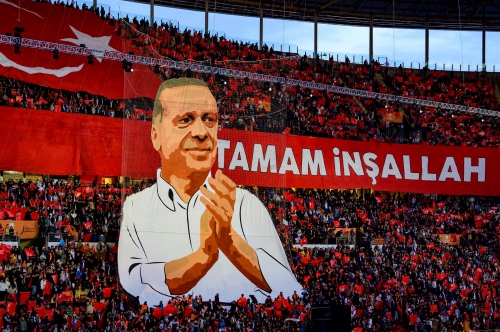
Erdogan face à l'épreuve ultime
Alexandre Douguine
Note du traducteur : Alexandre Douguine analyse ici la situation en Turquie du point de vue russe et dans le cadre actuel de la guerre entre la Russie et l'Ukraine (ou plutôt entre la Russie et l'OTAN) en mer Noire, enjeu de la vieille rivalité russo-ottomane. La situation actuelle implique un changement d'approche significatif. Pour l'Europe (ou pour l'idée de Maison commune), la nécessité d'accepter les arguments d'Erdogan, qui souhaite limiter l'ingérence américaine, va de pair avec un rejet de la politique d'Erdogan consistant à manipuler la diaspora turque contre les sociétés européennes, une manipulation qui aurait lieu même si la marque idéologique notoire des régimes d'Europe occidentale n'était pas le wokisme.
En Turquie, la date des élections présidentielles a été annoncée. Il s'agira probablement de l'épreuve la plus difficile pour Erdogan jusqu'à présent et sur le plan intérieur -avec le renforcement de l'opposition néolibérale pro-occidentale (en particulier le Parti républicain du peuple), une scission au sein du Parti de la justice et du développement (AKP) lui-même, un grave ralentissement économique, l'inflation, les conséquences d'un monstrueux tremblement de terre. Sur le front extérieur, avec l'intensification du conflit avec les États-Unis et l'Union européenne et le rejet de plus en plus marqué des politiques d'Erdogan par les dirigeants mondialistes de la Maison Blanche.
Lutte pour la souveraineté
L'aspect principal de la politique d'Erdogan est l'importance qu'elle accorde à la souveraineté. C'est le point central de sa politique. Toutes ses activités en tant que chef d'État s'articulent autour de cet axe. Dans un premier temps, Erdogan s'est appuyé sur l'idéologie islamiste, une alliance avec les régimes salafistes sunnites extrêmes du monde arabe. Durant cette période, il a collaboré très étroitement avec les Etats-Unis, les structures de Fethullah Gulen servant de charnière dans cette coopération. Les kémalistes laïques, les nationalistes turcs, de gauche comme de droite, étaient alors dans l'opposition. Cela a culminé avec l'affaire Ergenekon, dans laquelle Erdoğan a arrêté l'ensemble du haut commandement militaire, qui adhérait traditionnellement à l'orientation kémaliste.
À un moment donné, cette politique a cessé de promouvoir la souveraineté et a commencé à l'affaiblir. Après l'opération militaire russe en Syrie et le crash de l'avion turc en 2015, Erdoğan a été menacé : premièrement, les relations avec la Russie se sont détériorées, amenant la Turquie au bord de la guerre ; deuxièmement, l'Occident, insatisfait de la politique de souveraineté, était prêt à renverser Erdoğan et à le remplacer par des collaborateurs plus obéissants - Davutoğlu, Gül, Babacan, etc. Les gülenistes, anciens alliés d'Erdoğan et principaux opposants au kémalisme, sont devenus la colonne vertébrale du complot.
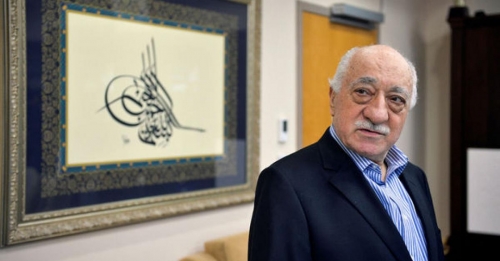
En 2016, alors que les relations avec la Russie se sont quelque peu clarifiées, l'Occident, en s'appuyant sur les fethullahistes (gülenistes), a tenté d'organiser un coup d'État, qui a toutefois été déjoué. Le fait qu'un nombre important de kémalistes patriotes, d'officiers militaires libérés par Erdogan peu avant le coup d'État, et leur structure politique, le parti Vatan, aient soutenu Erdogan plutôt que les militaires pro-occidentaux au moment critique a été un facteur décisif. Le fait est qu'à ce stade, les nationalistes kémalistes (de gauche comme de droite) avaient compris qu'Erdogan construisait sa politique sur le renforcement de la souveraineté et que l'idéologie était secondaire pour lui.
Étant donné que les conspirateurs gülenistes et les autres Occidentaux qui se sont rebellés contre Erdoğan suivaient servilement l'Occident mondialiste, ce qui conduisait inévitablement la Turquie à un effondrement total et à l'élimination de l'État-nation, les kémalistes ont décidé de soutenir Erdoğan pour sauver l'État. La Russie a également soutenu en partie Erdogan, réalisant que ses ennemis étaient des marionnettes de l'Occident. Les nationalistes turcs du Parti du mouvement nationaliste (MHP) ont également fini par se ranger à ses côtés.
Depuis 2016, Erdoğan a embrassé des positions proches du kémalisme patriotique et en partie de l'eurasisme, proclamant ouvertement la priorité de la souveraineté, critiquant l'hégémonie occidentale et prônant un projet de monde multipolaire. Les relations avec la Russie se sont également progressivement améliorées, bien qu'Erdoğan ait occasionnellement fait des gestes pro-occidentaux. Désormais, la souveraineté est devenue son idéologie et son objectif politique le plus élevé.
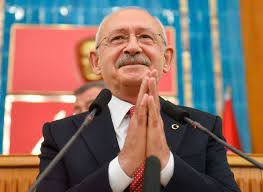
Cependant, l'opposition libérale sous la forme du Parti républicain du peuple (Kılıçdaroğlu - photo), qui s'est d'abord opposée à la ligne islamiste du premier Erdoğan et a ensuite rejeté la souveraineté, a exploité une série d'erreurs de calcul sur le plan intérieur et économique. Il est parvenu à obtenir un certain nombre de postes clés lors des élections, notamment en présentant ses propres candidats à la mairie des deux principales villes, Ankara et Istanbul. Erdoğan s'est également heurté à l'opposition de ses anciens collègues du parti AKP au pouvoir, qui sont également opposés à l'eurasisme et à la souveraineté et orientés vers l'Occident - les mêmes Ahmet Davutoğlu, Abdullah Gül, Ali Babacan, etc.
C'est dans cette situation qu'Erdogan se rendra bientôt aux urnes. L'Occident est manifestement mécontent de lui en raison de sa désobéissance - en particulier sa démarcation contre la Suède et la Finlande, dont la Turquie a empêché l'adhésion à l'OTAN ; la politique relativement indulgente d'Ankara à l'égard de la Russie, contre laquelle l'Occident collectif mène une guerre en Ukraine, a encore irrité les mondialistes de Washington et, surtout, les dirigeants modernes de la Maison Blanche et les élites mondialistes de l'Union européenne n'acceptent catégoriquement pas le moindre soupçon de souveraineté de la part de leurs vassaux ou de leurs adversaires.
Quiconque est prêt à se soumettre à l'Occident doit renoncer totalement à sa souveraineté en faveur d'un centre de décision supranational. Telle est la règle. Les politiques d'Erdogan la contredisent directement, c'est pourquoi Erdogan doit être démis de ses fonctions, à n'importe quel prix. Si l'Occident globalitaire a échoué dans le coup d'État de 2016, il devra tenter de renverser Erdogan lors des élections de 2023, quel qu'en soit le résultat. Après tout, il y a toujours la pratique des révolutions colorées en réserve.
C'est exactement ce que nous avons vu à nouveau en Géorgie, dont les dirigeants, après le départ de l'ultra-occidental et libéral Saakashvili, ont essayé de rendre la Géorgie un peu plus souveraine. Mais cela a suffi à Soros pour activer ses réseaux et lancer une révolte contre l'attitude "trop modérée" à l'égard de la Russie et l'orientation "inacceptablement souveraine" du régime contrôlé par l'oligarque pragmatique Bedzina Ivanishvili.
Erdogan est en train de constituer une coalition politique sur laquelle il pourra compter lors des élections. La colonne vertébrale sera évidemment l'AKP, un parti largement fidèle à Erdogan, mais sans substance et composé de fonctionnaires peu enthousiastes. Techniquement, c'est un outil utile, mais en partie embarrassant. En Turquie, nombreux sont ceux qui attribuent les échecs de l'économie, le développement de la corruption et l'inefficacité du système gouvernemental aux responsables de l'AKP et aux cadres administratifs nommés en leur sein. Si Erdoğan est une figure charismatique, l'AKP ne l'est pas. Le parti prospère grâce à l'autorité d'Erdogan, et non l'inverse.
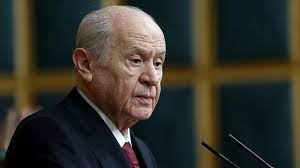
Alliés et adversaires d'Erdogan
Les alliés traditionnels seront évidemment les nationalistes turcs du parti Mouvement nationaliste turc de Devlet Bahçeli (photo). Pendant la guerre froide et par inertie dans les années 1990, les nationalistes turcs étaient strictement orientés vers l'OTAN et poursuivaient une ligne antisoviétique (puis antirusse). Dans les années 2000, cependant, leurs politiques ont progressivement commencé à changer. Ils se sont de plus en plus éloignés de l'Occident libéral et se sont rapprochés du vecteur souverain d'Erdogan. Idéologiquement, ils sont plus flamboyants que l'AKP, mais leur radicalisme leur aliène une partie de la population turque. En tout état de cause, l'alliance idéologique et politique avérée d'Erdogan avec Bahçeli est cruciale pour son avenir.
Erdogan peut également compter sur le soutien de mouvements politiques soufis, petits mais influents, qui ne bénéficient pas d'un soutien de masse. Leur rôle est de combler le vide laissé par la défaite des structures gülénistes qui se réclamaient d'un "mouvement soufi". Le soufisme est assez répandu dans la société turque et certains tariqats considèrent Erdoğan comme la figure dont dépend la renaissance spirituelle de la Turquie. Mais la diversité du soufisme turc, ainsi que d'autres courants spirituels - notamment les Alévis et les Bektashi - laisse une large place à d'autres opinions.
Tous les Occidentalistes s'uniront contre Erdogan et il n'est pas exclu que, cette fois, les mondialistes activent un réseau d'agents tant au sein de l'AKP lui-même que dans d'autres structures de l'État. Compte tenu de la situation difficile d'Erdogan, pour des raisons d'âge et de santé, il s'agit peut-être de sa dernière chance - non seulement en tant qu'individu, mais aussi en tant que figure historique qui a lié son destin et sa politique à la souveraineté de l'État turc. S'il réussit maintenant et assure la continuité de la voie en lui donnant une formulation idéologique stricte, il entrera dans l'histoire de la Turquie comme le deuxième Atatürk, le sauveur de l'État à une époque de bouleversements critiques. S'il tombe, il est très probable qu'une série de désastres attende la Turquie, car quiconque prendra sa place sera orienté vers l'Occident, ce qui signifie que l'effondrement de la Turquie à l'avenir est imminent, car les mondialistes n'ont en aucun cas oublié les plans du Grand Kurdistan.
Bien sûr, ils n'ont pas réussi à mettre en œuvre cette provocation pendant la vague de révolutions colorées et après l'invasion de l'Irak et de la Syrie, mais la chute d'Erdogan donnera un nouveau souffle à ces projets. Enfin, les adversaires d'Erdogan seront contraints à une confrontation sérieuse avec la Russie, parce que leurs maîtres de l'OTAN l'exigeront, et ce sera un autre facteur de l'effondrement de la Turquie. Erdogan lui-même sera vilipendé par ses successeurs et l'enchaînement des catastrophes de l'État turc conduira à l'oubli pur et simple de son nom. Erdogan aborde donc ces élections comme s'il s'agissait de sa dernière bataille. Non seulement en tant qu'homme politique, mais aussi en tant que figure historique, véritable leader et symbole de son peuple. Il peut enfin consolider ce statut, mais s'il perd, il risque de le perdre irrémédiablement et n'aura pas d'autre chance.
L'Atatürk vert
Dans cette situation, l'analyse géopolitique suggère qu'Erdoğan dispose d'une autre ressource : moins une ressource de masse qu'une ressource idéologique et d'image. Ce sont les mêmes kémalistes patriotes qui, contrairement au libéral Kemal Kılıçdaroğlu du Parti républicain du peuple, malgré la dure répression pendant l'affaire Ergenekon, se sont rangés aux côtés d'Erdoğan au moment critique et, oubliant les vieilles rancunes, ont pleinement soutenu sa ligne souveraine. Certains milieux qualifient Erdoğan d'"Atatürk vert", c'est-à-dire le dirigeant turc, le leader national aux tendances islamiques. Le visage politique de ce groupe extrêmement influent en Turquie, composé principalement d'officiers militaires de tous grades, est le parti de gauche Vatan, dirigé par le leader charismatique Doğu Perinçek (photo, ci-dessous).
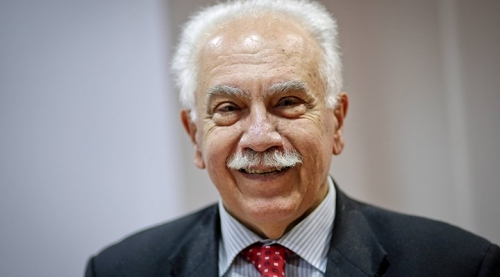
D'un point de vue électoral, le parti n'était pas du tout représentatif, mais son importance réside ailleurs : il est le centre qui élabore l'analyse géopolitique la plus actuelle de la Turquie, un parti idéologique eurasien avec une position multipolariste et un véritable centre intellectuel de défense et d'illustration de la souveraineté turque. Les journaux Vatan, Aydınlık et Teori, la chaîne de télévision Ulusal, les nombreux blogs et sites web font de cette entité le principal atout. Les liens historiquement forts de Vatan avec la Russie, la Chine, l'Iran et la Corée du Nord doivent également être pris en compte. Pour Erdogan, qui joue désormais contre l'Occident, ce vecteur qu'est ce club anti-mondialisation et multipolariste pourrait s'avérer décisif. Si Vatan est inclus dans la coalition, Erdogan pourra également se délier les mains face à l'Occident : la connexion avec les principaux pôles du monde multipolaire, et en particulier avec la Russie, dont dépend une grande partie de la politique et de l'économie turques modernes, et donc le destin d'Erdogan lui-même, sera solidement assurée.
Erdoğan a démontré tout au long de sa vie qu'il avait un très bon sens de la géopolitique.
Il choisit toujours des alliances qui renforcent la souveraineté turque. Kemal Ataturk lui-même faisait de même. Cependant, si la situation change et que les anciens alliés s'avèrent être un obstacle à l'indépendance et à la liberté de la Turquie, Erdogan est toujours prêt à les sacrifier.
La Turquie se trouve aujourd'hui en équilibre entre un Occident unipolaire et un Orient multipolaire, l'Eurasie. Il en est ainsi depuis l'origine de l'État-nation turc. Mais les proportions de cet équilibre ont été déterminées différemment à chaque tournant de l'histoire. Parfois, il était important de faire un pas vers l'Est (comme l'a fait Kemal Ataturk en s'alliant avec Lénine); à d'autres moments, il s'agissait de faire un pas vers l'Ouest.
Dès lors...
Aujourd'hui, la Russie, autrefois rivale géopolitique de la Turquie, et plus encore les autres pôles du monde multipolaire, ne constituent pas une menace pour la souveraineté turque et c'est un fait objectif ; au contraire, les relations privilégiées avec la Russie et la Chine et le compromis avec l'Iran chiite offrent à la Turquie des avantages vitaux dans sa politique étrangère et intérieure. L'Occident, du moins l'Occident libéral et mondialiste, joue contre Erdogan, et donc contre la souveraineté turque. Un homme politique aussi subtil qu'Erdogan ne peut pas ne pas s'en rendre compte. Il est temps de donner à la souveraineté le statut d'idéologie et de consacrer la multipolarité comme vecteur principal de la politique turque.
Ces élections sont cruciales pour la Turquie. La Russie, dans ces circonstances, malgré ce qui peut apparaître à nos yeux comme une incohérence, une hésitation, une politique de "deux pas à gauche, deux pas à droite", a intérêt à ce que la Turquie reste unie, entière, indépendante et souveraine. Cela n'est objectivement possible qu'avec la Russie, et en aucun cas contre elle. Par conséquent, pour la Russie, Erdogan est le meilleur choix dans les circonstances actuelles.
20:20 Publié dans Actualité | Lien permanent | Commentaires (0) | Tags : erdogan, alexandre douguine, russie, turquie, élections turques, politique turque, politique internationale |  |
|  del.icio.us |
del.icio.us |  |
|  Digg |
Digg | ![]() Facebook
Facebook
samedi, 25 février 2023
Le tremblement de terre en Turquie dans un contexte géopolitique
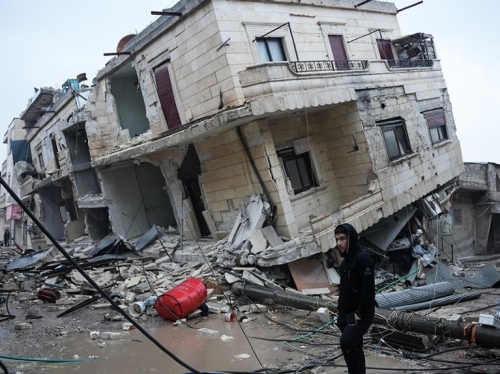
Le tremblement de terre en Turquie dans un contexte géopolitique
Leonid Savin
Source: https://www.geopolitika.ru/article/zemletryasenie-v-turcii-v-geopoliticheskom-kontekste
Toute catastrophe, qu'elle soit d'origine naturelle ou humaine, constitue toujours un défi pour les autorités au pouvoir - les victimes et le grand public attendent de leur gouvernement une action immédiate et, surtout, correcte, en surveillant de près tant les déclarations que les actions des autorités. Une situation similaire existe aujourd'hui en Turquie. L'énorme tragédie qui a fait des centaines de milliers de victimes (quelque 40.000 morts) a non seulement mis à l'épreuve l'ensemble du peuple turc, mais est également devenue un catalyseur de batailles politiques. Ce faisant, l'opposition a été proactive.
Des défis pour Erdogan
Avant qu'Erdogan n'apparaisse à la télévision pour s'adresser à la nation, Kemal Kılıçdaroğlu, chef du plus grand parti d'opposition turc, le Parti républicain populaire, a déclaré qu'il se rendrait à Hatay avec ses collègues, le maire d'Istanbul Ekrem Imamoglu, le maire d'Ankara Mansur Yavas et le maire d'Izmir Tunç Soyer, qui ont remporté les élections de 2019 face aux candidats du Parti de la justice et du développement (AKP), actuellement au pouvoir. Kiliçdaroğlu a prononcé son discours devant les citoyens de Hatay tard dans la soirée du 7 février. En contraste frappant avec le discours d'Erdogan, Kiliçdaroğlu est apparu à la lumière d'un plafonnier de rechange dans la ville, toujours privée d'électricité, entièrement vêtu de noir, et a imputé la responsabilité de la catastrophe au régime sans grande cérémonie, en déclarant : "cet effondrement est entièrement le résultat d'une politique rentière systématique. Il n'y a pas de place pour qu'Erdogan, le palais ou ces bandes de rentiers se rencontrent."
La veille du tremblement de terre, la coalition d'opposition a également annoncé qu'elle désignerait son candidat pour se présenter contre Erdogan le 13 février. Alors que l'on avait craint une scission au sein de l'opposition en raison de différends sur le choix du candidat principal, les jours qui ont suivi le tremblement de terre ont montré une certaine unité. Cela présente certains risques pour l'AKP.
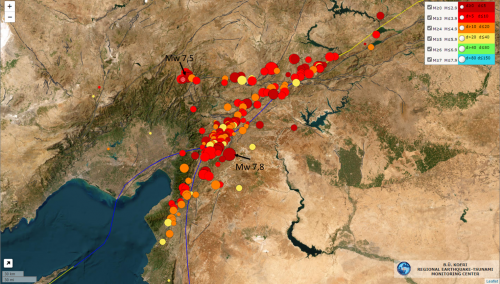
La journaliste turque Ceyda Karan relève six aspects clés liés aux problèmes du tremblement de terre et de ses suites :
1) le long retard ou le manque d'assistance aux victimes de la part de l'État. Cela a été affecté par l'ampleur de la catastrophe, de sorte que l'État n'était tout simplement pas en mesure d'aider tout le monde en même temps ;
2) La réponse inadéquate de l'agence d'urgence, qui fait partie du ministère de l'intérieur. Manque d'équipement de sauvetage nécessaire et de personnel qualifié ;
3) Tentatives de censure des critiques du gouvernement formulées par l'opposition et blocage temporaire des médias sociaux ;
4) L'utilisation controversée des forces armées turques pour répondre au tremblement de terre. Seuls 3500 militaires ont été déployés au cours des 24 premières heures, alors que 50.000 soldats et officiers turcs se trouvent en Syrie. Les équipes de secours de Russie, d'Espagne et d'Israël ont eu le temps de déployer des hôpitaux de campagne plus tôt ;
5) La complexité des élections prévues en mai. Erdogan n'a le mandat de reporter les élections qu'en cas de guerre, et la catastrophe actuelle crée une toile de fond négative pour lui permettre de remporter une majorité de sièges parlementaires pour le parti de la justice et du développement ;
6) Les relations avec la politique étrangère, car les relations de la Turquie avec les pays de l'UE et de l'OTAN étaient tendues à la veille du tremblement de terre. À l'inverse, il y a eu un rapprochement avec la Syrie sous la médiation de la Russie.
Le cinquième point est le plus important à l'heure actuelle, car selon la loi, les élections ne peuvent être reportées. Mais les partisans du report affirment qu'il existe un autre moyen : le Haut Conseil électoral, connu sous le nom de YSK, arbitre final des litiges électoraux, peut décider qu'il n'est pas prêt à organiser des élections dans les 10 provinces durement touchées et dans un contexte de déplacement sans précédent des électeurs vers d'autres villes. En effet, en 1966, le YSK a décidé que les élections locales pouvaient être reportées après qu'un tremblement de terre ait frappé les provinces orientales deux jours avant le scrutin, rendant impossible la tenue des élections. Une décision devrait être prise prochainement, et les émissaires de l'AKP sont maintenant à l'écoute de l'opinion publique pour ne pas perdre leur réputation.
Toutefois, James Ryan, de l'Institut de recherche sur la politique étrangère basé aux États-Unis, établit généralement un lien entre les dégâts du tremblement de terre et le propre parti d'Erdogan. Il écrit que "la raison pour laquelle cela dérange tant Erdogan est que la nature de ces dizaines de milliers de morts - les immeubles d'habitation en béton détruits - frappe au cœur de la stratégie de gouvernement de son parti ... Dans sa hâte de construire un nombre énorme de nouveaux logements, le gouvernement turc a accordé des centaines de milliers de dérogations aux normes de sécurité sismique dans tout le pays, y compris pour 75.000 bâtiments dans la zone aujourd'hui touchée par ces tremblements de terre. Au cours de la dernière décennie, ce développement s'est emballé pour construire non seulement d'importants nouveaux projets de logements, mais aussi des "méga-projets" douteux, dont deux nouveaux ponts sur les détroits du Bosphore et des Dardanelles, un nouvel aéroport majeur dans la banlieue d'Istanbul et un projet de canal destiné à contourner les détroits par la province turque de Thrace. Une grande partie de cette construction a été payée par des injections de dette étrangère, dont une grande partie provient des alliés de la Turquie dans le golfe Persique, à commencer par le Qatar et plus récemment des EAU et de l'Arabie Saoudite. Les visiteurs d'Istanbul ces dernières années n'ont pu s'empêcher de remarquer la vitesse à laquelle les gratte-ciel et les projets de développement sont apparus dans le paysage - un fait moins visible mais non moins vrai est que ce développement s'est produit à un rythme similaire dans tout le pays, et en particulier dans le sud-est de la Turquie qui s'urbanise rapidement, une région qui a également subi le tribut social et économique de l'afflux de millions de réfugiés syriens depuis 2011. En gros, le gouvernement AKP a investi du capital économique et politique dans cette région pendant dix ans, et il a été réduit à néant en quelques heures."
De toute évidence, Erdogan sera tenu pour responsable de tout cela. Si l'on sait déjà que les autorités ont procédé à la détention de représentants d'entreprises de construction dont les maisons se sont avérées moins sûres que d'autres, il ne faut pas oublier que ce commerce n'aurait guère été possible sans le patronage des élites au pouvoir. La recherche active d'un bouc émissaire sera entreprise par l'opposition, qui a été privée de divers privilèges en temps voulu.
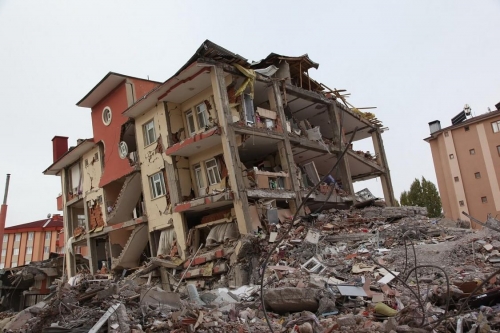
Erdoğan ne doit pas sous-estimer d'autres risques politiques, notamment une éventuelle escalade des conflits à l'intérieur du pays. Une étude sur l'impact des tremblements de terre sur les conflits intra-étatiques, basée sur une analyse statistique de 185 pays de 1975 à 2002, montre que les tremblements de terre "augmentent non seulement la probabilité d'un conflit, mais aussi que leur impact est plus important, les tremblements de terre de plus grande magnitude affectant des zones plus denses de pays ayant un produit intérieur brut plus faible ainsi que des conflits préexistants".
L'auteur de l'étude écrit que "si de nombreux universitaires, décideurs et organisations d'aide suggèrent que les catastrophes naturelles rassemblent les groupes et atténuent les conflits, les tremblements de terre peuvent en fait stimuler les conflits intra-étatiques en provoquant des pénuries de ressources clés, en particulier dans les pays en développement où la concurrence pour les ressources rares est la plus intense."
Évaluations externes
Erol Yaibok, du Centre for Strategic and International Studies (Washington DC), a affiné l'étude du problème social en Turquie. Au-delà de la première phase active de recherche et de sauvetage, souligne-t-il, l'impact physique et psychologique sur les personnes sera bien plus important et plus durable. Par conséquent, les donateurs internationaux et les ONG devront tirer les leçons d'autres catastrophes naturelles (par exemple, les tsunamis ou les ouragans) pour apprendre à coordonner l'aide, à renforcer la résilience locale et à utiliser et renforcer les structures de réponse locales.
En plus des pertes humaines causées par le tremblement de terre, l'ampleur de la dévastation signifie que tous les efforts de secours seront difficiles en raison des routes bloquées, des ponts endommagés, des coupures de communication et d'électricité, des pénuries de nourriture et d'eau et d'autres perturbations critiques ?
Gaziantep elle-même est le centre économique et politique d'une région qui est littéralement sur la ligne de front depuis le début de la guerre civile syrienne en 2011. Sur les près de 3,8 millions de réfugiés enregistrés en Turquie, plus d'un million de Syriens vivent près de la frontière turco-syrienne, près d'un demi-million dans la seule ville de Gaziantep. Et les conséquences du tremblement de terre ne feront qu'exacerber une situation déjà tendue. Pour les réfugiés syriens, le tremblement de terre crée un nouveau traumatisme en plus des anciens.
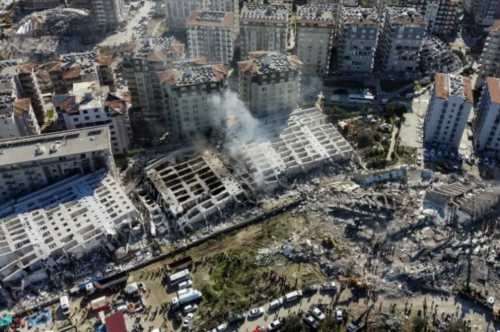
Les experts de RAND qui examinent le tremblement de terre et ses conséquences sous l'angle de diverses options de politique internationale.
Jesse Riposo écrit que "les estimations actuelles de l'impact économique de la catastrophe comprennent près de 70 milliards de dollars de pertes de logements et 10,4 milliards de dollars supplémentaires de pertes économiques. Ces estimations préliminaires ne correspondent probablement pas à l'ensemble des dommages, car il faudra sans doute des mois pour évaluer et établir le coût total de la reconstruction. Ces coûts semblent être dus à la construction non conforme aux normes de nombreuses propriétés, ce qui pourrait conduire à des poursuites judiciaires et servir de rappel brutal de l'importance de mettre en œuvre des codes et des normes de construction plus durables. Alors que la Turquie prend des mesures pour reconstruire, elle devrait réfléchir à la manière dont elle fera respecter une mise en œuvre et une adhésion plus strictes à des règles de construction sûres."
Howard Schatz aborde un sujet plus sensible sur le plan politique, en notant que "l'aide à la Syrie est une question beaucoup plus complexe. La plupart des dégâts ont été causés dans des zones de la Syrie qui sont en partie contrôlées par la Turquie et des groupes rebelles affiliés, y compris le groupe terroriste reconnu Hayat Tahrir al-Sham, une ramification d'Al-Qaïda.
Malgré cela, une aide est nécessaire. Schatz suggère d'impliquer le groupe connu sous le nom de Casques blancs. Les États-Unis font partie des nombreux pays qui soutiennent cette organisation. Cependant, ils sont connus pour être des provocateurs qui ont en fait porté de fausses accusations afin d'accuser le gouvernement Assad.
L'appel de Schatz n'est-il pas une tentative d'utiliser cette tragédie pour un autre sabotage ? C'est tout à fait possible. D'autant plus que Schatz appelle l'une de ses options de secours "le transport aérien de fournitures aux Casques blancs, coordonné à l'avance. Cela pourrait inclure de la nourriture vitale, de l'eau, des médicaments et des abris tels que des tentes isolées." Et probablement de nouveaux matériaux pour le sabotage et la provocation, y compris des armes.
Un couloir passant par le Kurdistan irakien et l'administration autonome dirigée par les Kurdes du nord et de l'est de la Syrie a également été proposé comme option alternative. Cela nécessite de négocier à travers les lignes de contrôle avec les groupes dirigés par la Turquie ou le gouvernement syrien.
L'incompréhension de Schatz de la situation réelle au Kurdistan est ici évidente. Les Kurdes irakiens ne coopèrent pas avec les Kurdes syriens. Et même lorsqu'il y avait une menace d'ISIS (une organisation interdite dans la Fédération de Russie), les Kurdes syriens ne coopéraient pas avec les Kurdes irakiens. Quel genre de couloirs pour l'aide humanitaire existe-t-il ? Bien que la question kurde elle-même doive également être soulevée, car en Turquie, non seulement les Turcs de souche mais aussi les Kurdes, qui vivent en grand nombre dans la partie orientale du pays, ont souffert. Dans la ville de Gaziantep, déjà mentionnée, environ un demi-million de personnes sont des Kurdes de souche.
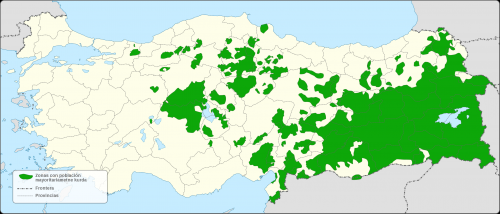
Et James Scheer observe que "la Turquie est confrontée au problème de la 'congestion des accès'. La Syrie y est certainement plus sujette ; mais les voies de transit aériennes, maritimes et terrestres de la Turquie sont submergées par l'énorme afflux d'aide humanitaire. Leur approche originale consistant à prendre les choses selon le principe du premier arrivé, premier servi n'a tout simplement pas fonctionné. Il semble également nécessaire de s'engager avec la Turquie sur des méthodes de récupération sûres. La Turquie devra peut-être commencer par évaluer l'habitabilité des bâtiments encore construits mais fragiles. Il y a aussi le problème de la surveillance et de l'application des codes de construction et de la mise à niveau sismique des structures existantes avant le prochain grand tremblement de terre.
Il est probable que certains États seront prêts à aider à résoudre ces problèmes à certaines conditions.
La diplomatie des tremblements de terre
Toute catastrophe naturelle montre bien sûr qui est un véritable partenaire et ami de la partie touchée, et qui profite de la situation pour servir ses propres intérêts.
Dans ce contexte, Fehim Tastekin écrit que "la diplomatie du tremblement de terre est également utilisée par Israël, qui a récemment rétabli ses liens avec la Turquie". Le président israélien Isaac Herzog a appelé Erdogan peu après le premier tremblement de terre, tandis que le ministre des Affaires étrangères Eli Cohen a rencontré le président turc à Ankara mardi... Toutes ces mesures devraient donner un élan au processus de normalisation, qui a officiellement démarré fin décembre lorsque la nouvelle ambassadrice israélienne à Ankara a présenté ses lettres de créance à Erdogan. Les alliés de l'OTAN comme la France et les États-Unis, qui se sont souvent querellés avec Erdogan, ont également offert leur soutien, tout comme la Finlande et la Suède, dont les demandes d'adhésion à l'OTAN sont bloquées par la Turquie.
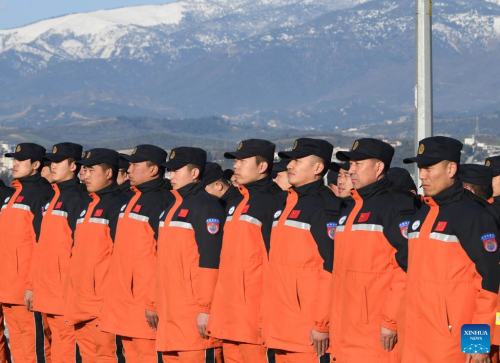
La Chine, dont le traitement de la communauté ouïghoure a souvent jeté une ombre sur les relations bilatérales, a gagné le cœur de la Turquie en envoyant 467 sauveteurs et du matériel de haute technologie.
La Russie, dont les liens avec la Turquie ont été un mélange de coopération et de conflit, a envoyé une équipe de sauvetage de 401 personnes - la cinquième en importance après l'Azerbaïdjan, l'Espagne, la Chine et Israël. Nechirvan Barzani, président du gouvernement régional du Kurdistan irakien, qui a maintenu des liens étroits avec Ankara mais a souvent été affecté par les opérations militaires turques au Kurdistan, s'est également rendu dans la région touchée par le séisme pour montrer sa solidarité."
En diplomatie, cependant, ce ne sont pas seulement les faits qui comptent, mais aussi la présentation des informations. Avec leur avantage en matière de communication stratégique et leur contrôle des médias mondiaux, les puissances occidentales sont tout à fait capables de prendre leurs désirs pour des réalités. La diligence et l'aide gratuite des autres pays seront ainsi mises de côté.
De manière révélatrice, la catastrophe n'a pas entraîné d'assouplissement de la position de la Turquie en Syrie, dont les régions du nord, y compris Afrin, contrôlées par la Turquie, ont également été dévastées. Ankara a refusé de laisser les Syriens entrer en Turquie, mais a accepté de rouvrir deux postes-frontières pendant trois mois, en plus de celui situé à la frontière d'Idlib, pour permettre l'acheminement de l'aide humanitaire coordonnée par l'ONU. Ces trois postes frontaliers mènent à des zones contrôlées par les rebelles, tandis que ceux contrôlés par le gouvernement syrien et ceux menant à des zones contrôlées par les Kurdes restent fermés. Les convois d'aide humanitaire en provenance du nord-est contrôlé par les Kurdes ont été bloqués par les rebelles soutenus par la Turquie pendant des jours avant de pouvoir atteindre les zones touchées par le séisme dans le nord-ouest, les sources kurdes accusant spécifiquement la Turquie.
Ankara n'a pas non plus assoupli sa position à l'égard des pays occidentaux. En particulier, après le tremblement de terre, il a été annoncé que la Turquie ne ratifierait pas l'admission de la Suède et de la Finlande dans l'OTAN.
Des théories du complot circulent également, selon lesquelles le tremblement de terre serait le résultat d'armes sismologiques utilisées par les États-Unis. De tels récits ne doivent pas non plus être sous-estimés. D'autre part, les musulmans (et pas seulement en Turquie) voient des présages apocalyptiques dans le tremblement de terre. Selon l'Islam, de telles catastrophes sont une providence divine et servent à rappeler aux croyants leur existence. Le prophète Mahomet a déclaré que les tremblements de terre sont un avertissement du Tout-Puissant, les croyants doivent donc prier et demander sa miséricorde. Cela est également lié au fait que la catastrophe s'est produite l'année du centenaire de la formation de la République de Turquie.
Théoriquement, le problème actuel peut être décomposé en ses composantes et analysé avec soin. Il est beaucoup plus difficile d'agir dans la pratique, surtout si l'on parle des relations russo-turques sous l'angle des intérêts géopolitiques de Moscou. À tout le moins, l'aide humanitaire russe a apporté un soutien efficace directement pendant la phase chaude des opérations de sauvetage. L'heure est maintenant aux propositions diplomatiques et au travail de proximité dans cette partie difficile de la région.
20:10 Publié dans Actualité | Lien permanent | Commentaires (0) | Tags : actualité, séisme, turquie, asie mineure, erdogan, catastrophes naturelles, tremblement de terre |  |
|  del.icio.us |
del.icio.us |  |
|  Digg |
Digg | ![]() Facebook
Facebook
vendredi, 05 août 2022
Erdogan, Poutine, Iran et Ukraine: le grand complot des drones
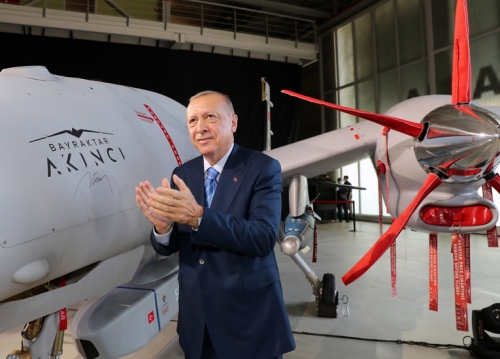
Erdogan, Poutine, Iran et Ukraine: le grand complot des drones
SOURCE : https://it.insideover.com/guerra/erdogan-putin-iran-e-ucraina-il-grande-intreccio-dei-droni-2054515.html
La "relation spéciale" entre Recep Tayyip Erdogan et Vladimir Poutine se poursuit. Après le sommet de Téhéran où les deux présidents se sont rencontrés pour le sommet dit du "format Astana", le "sultan" et le "tsar" se retrouveront le 5 août à Sotchi, en Russie. Une rencontre qui confirmera non seulement la ligne de dialogue qui n'a jamais été interrompue entre Ankara et Moscou, même pendant les phases les plus délicates de la guerre en Ukraine, mais aussi une sorte de regain d'intérêt de la part des présidents russe et turc pour apparaître ensemble, rétablissant une accélération même physique dans les relations entre les deux pays qui semble presque être un plongeon dans le passé, certainement avant la soi-disant "opération militaire spéciale".
Il y a de nombreuses questions sur la table. Il y a le nœud constitué par la Syrie, qui a déjà été révélé lors du sommet de Téhéran. Il y a le blé, étant donné que, pas plus tard qu'hier, un centre logistique a été ouvert à Istanbul pour contrôler les exportations de blé ukrainien à travers la mer Noire. L'un des points les plus importants de l'accord signé en Turquie par Moscou et Kiev avec le gouvernement d'Ankara et les Nations Unies. Mais comme l'a expliqué le porte-parole du Kremlin, Dmitry Peskov, l'accent de cette réunion sera également mis sur la coopération dans le domaine militaire. Une clarification qui a surtout servi à ne pas démentir les hypothèses circulant ces dernières heures sur un prétendu intérêt russe pour une coopération dans la production des célèbres drones Bayraktar TB2 de fabrication turque. Des drones qui, comme on l'a vu dans l'actualité ces derniers mois, sont devenus des armes clés aux mains des forces ukrainiennes.
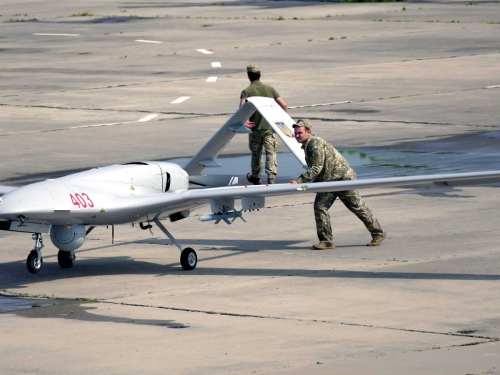
L'accord entre Kiev et Ankara pour la fourniture de ces machines de guerre n'a jamais été apprécié par le Kremlin, qui a toujours considéré ce pacte comme une sorte de coup de poignard dans le dos commis par Erdogan. Non seulement le président turc a des liens familiaux avec le géant de la défense (Selçuk Bayraktar, le directeur technique de Baykar, est le mari de la fille d'Erdogan, Sumeyye), et donc tous les accords sont considérés comme une sorte d'affaire personnelle, mais il faut également se rappeler que jusqu'à présent, ces drones ont également été appréciés par des pays profondément rivaux de la Russie, en commençant par l'Ukraine et en terminant par la Pologne et la Lettonie. L'image n'est donc certainement pas l'une des meilleures du point de vue de Poutine, compte tenu également du type de relation construite au fil des ans avec le dirigeant turc. Et ce facteur ne doit certainement pas être sous-estimé. Cependant, le fait que Moscou puisse maintenant être intéressé par une collaboration avec Ankara dans ce même secteur suggère non seulement la valeur de ces systèmes pilotés à distance produits par la Turquie, mais aussi le désir du Kremlin de faire un pas en avant en entrant dans un domaine complexe non seulement sur le plan stratégique, mais aussi sur le plan diplomatique. En substance, il s'agit de s'insinuer dans un système qui voit la Turquie fournir, pour l'instant, des technologies de guerre aux ennemis de la Russie.
Pour l'instant, Moscou n'a ni confirmé ni infirmé cette hypothèse. Peskov a seulement déclaré que la coopération en matière de défense entre les deux pays est "constamment à l'ordre du jour" et que cela indique qu'il existe un partenariat très important entre les deux gouvernements. Mais ce qui importe avant tout, c'est le timing de ces rumeurs à la lumière d'un point d'interrogation qui a marqué la visite de Poutine à Téhéran : la fourniture éventuelle de drones iraniens à la Russie. Une hypothèse divulguée par des sources américaines et qui n'avait pas trouvé un mur de déni aussi clair de la part de la République islamique. Au contraire, l'Iran a pris soin de préciser que la coopération avec la Fédération de Russie était de longue date. Et de nombreux observateurs avaient spéculé qu'en cas de vente d'appareils iraniens à Moscou, une véritable guerre éclaterait dans le ciel ukrainien entre les drones d'Ankara et ceux de Téhéran, les premiers aux mains de Kiev, les seconds aux mains de l'ennemi.

La rumeur d'un éventuel intérêt russe pour les drones turcs Bayraktar TB2 changerait encore la donne. Le Daily Sabah, un quotidien proche des cercles autour d'Erdogan, a rapporté des rumeurs d'intérêt de la part de la Russie et des Émirats arabes unis pour un travail conjoint avec la Turquie sur ces drones. Et la question aurait également été discutée lors d'une réunion du parti AKP d'Erdogan. Mais selon les rapports du Daily Sabah, le PDG de Baykar, la société qui produit les Bayraktar TB2, a déclaré qu'il soutenait la résistance ukrainienne et qu'ils n'avaient aucun accord avec le Kremlin.
19:35 Publié dans Actualité, Affaires européennes, Militaria | Lien permanent | Commentaires (0) | Tags : drones, drones turcs, iran, turquie, russie, vladimir poutine, erdogan, europe, ukraine, affaires européennes |  |
|  del.icio.us |
del.icio.us |  |
|  Digg |
Digg | ![]() Facebook
Facebook
dimanche, 10 juillet 2022
Disputes internes au sein de l'OTAN
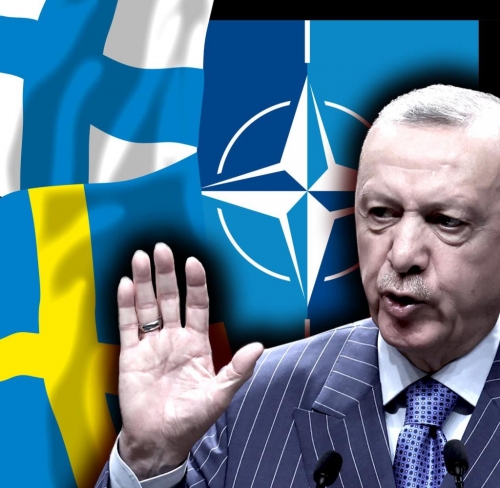
Disputes internes au sein de l'OTAN
Par Alexander Markovics
Dans le sillage des opérations militaires russes, deux nouveaux États souhaitent rejoindre l'alliance offensive américaine de l'OTAN : la Suède et la Finlande. La fin de la neutralité déjà bien érodée de ces deux Etats signifierait une menace potentielle pour la Russie venant du nord : Saint-Pétersbourg, la deuxième ville russe, Mourmansk, le port de la mer du Nord, ainsi que des forces navales supplémentaires de l'OTAN dans la région de la mer Baltique, donneraient de sérieux tracas à Moscou. Tous les pays de l'OTAN sont favorables à l'élargissement au nord - mais le deuxième membre le plus puissant de l'Alliance sur le plan militaire, la Turquie dirigée par Recep Tayip Erdogan, oppose son veto à l'élargissement de l'Alliance. Erdogan exige que la Finlande et la Suède cessent de soutenir les groupes kurdes PKK et YPG.
Bien que le PKK figure sur la liste des organisations terroristes de l'UE, ce groupe terroriste d'obédience avérée à la gauche, qui s'aligne de plus en plus sur la ligne libérale de l'Occident depuis la fin de la Guerre froide, dispose d'un vaste réseau de soutien en Europe, notamment en Allemagne et en Autriche. Pour la Turquie, cela est particulièrement important, car un conflit armé couve depuis des décennies dans l'est du pays avec des partisans du PKK - qui utilisent notamment des pays comme la Finlande et la Suède pour échapper aux poursuites judiciaires d'Ankara. Pour la Turquie, cette demande est un aspect non négociable de sa souveraineté. Son récent veto montre que, depuis la présidence d'Erdogan, elle est prête à faire valoir ses intérêts nationaux, même face à Washington. Ainsi, la Turquie a également refusé de se joindre aux sanctions occidentales contre la Russie. Ce faisant, la Turquie prend non seulement en compte ses intérêts économiques - elle dépend non seulement du gaz russe, mais aussi des céréales et des touristes de Moscou - mais suit également la vieille doctrine d'Atatürk consistant à entretenir de bonnes relations avec la Russie.
Enfin, Ankara se souvient très bien des événements de l'été 2016 : à l'époque, l'Occident avait soutenu un coup d'État du mouvement Gülen (un ancien partenaire d'Erdogan) contre son allié fidèle, la Turquie. Peu après, des provocations de militaires pro-occidentaux à l'encontre de la Russie ont culminé avec la destruction d'un avion russe. Une guerre entre la Turquie et la Russie - et donc une guerre mondiale - était alors imminente, qui n'a pu être évitée que grâce à la médiation courageuse des cercles eurasiens de Russie et du Parti de la Patrie en Turquie.
L'attitude de l'Occident dans ce conflit au sein de l'OTAN reste ambivalente : en particulier dans la lutte contre l'État islamique - également créature de l'Occident - Washington a misé sur un soutien aux associations kurdes armées et à l'État kurde "Rojava", créé grâce au soutien occidental. Cette entité, créée dans le cadre de la guerre en Syrie, viole encore aujourd'hui la souveraineté de la Syrie et sert l'Occident en privant l'État du Levant de ressources précieuses - pétrole, coton et nourriture. Du point de vue occidental, les combattants kurdes ne semblent pas encore avoir fait leur devoir. La Turquie est également active dans le nord de la Syrie et n'y joue pas un rôle glorieux, notamment en occupant la ville d'Afrin. Les préoccupations sécuritaires de la Turquie vis-à-vis des milices kurdes au service de l'Occident peuvent se justifier, mais pas l'occupation de certaines parties du pays voisin. L'offensive récemment annoncée par la Turquie contre les Kurdes dans le nord de la Syrie est un casse-tête pour Washington et dépend du bon vouloir de la Russie, qui y détient la maîtrise de l'air.

Le président croate Zoran Milanovic s'oppose également à l'adhésion de la Suède et de la Finlande à l'OTAN, ce qui le place en porte-à-faux par rapport au gouvernement croate - le journal Deutsche Stimme a rapporté sa position critique sur les mesures Corona. Milanovic veut bloquer l'élargissement au nord jusqu'à ce que les Croates obtiennent une position plus forte dans la loi électorale bosniaque. Il contribue ainsi à déstabiliser davantage l'État bosniaque sous protectorat de l'UE/OTAN, dont la pérennité est de plus en plus mise en doute, y compris par les Serbes.
22:15 Publié dans Actualité, Affaires européennes | Lien permanent | Commentaires (0) | Tags : otan, suède, finlande, turquie, erdogan, croatie, politique internationale, géopolitique |  |
|  del.icio.us |
del.icio.us |  |
|  Digg |
Digg | ![]() Facebook
Facebook
mardi, 24 mai 2022
La Turquie et l'ordre multipolaire
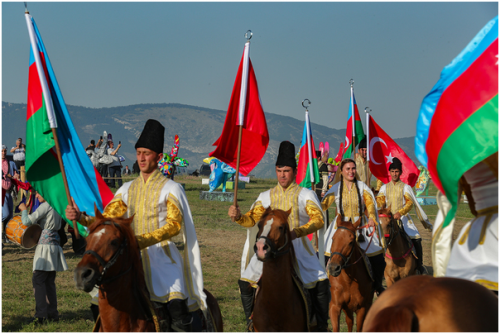
La Turquie et l'ordre multipolaire
par Pierluigi Fagan
Source : Pierluigi Fagan & https://www.ariannaeditrice.it/articoli/turchia-e-ordine-multipolare
Je m'inspire d'un article sur la Turquie paru dans Ria Novosti (Russie), pour montrer la complexité des jeux multipolaires. La Turquie est l'idéaltype d'un lieu géo-historique multipolaire. Pendant plus de six siècles, un empire musulman sunnite, avec un passé plus récent en tant que société réformiste laïque. Asiatique mais toujours méditerranéenne, la Turquie est née de peuples non indigènes qui ont migré il y a des siècles de l'Asie centrale, où leur ethnie et leur langue sont originaires, la zone violette de la carte (ci-dessous, entre la Caspienne et l'Aral, les peuples Orghuz).
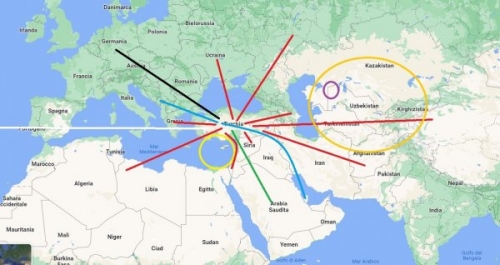
Il va sans dire qu'il existe un penchant naturel pour les peuples de langue turque (les quatre "stans" d'Asie centrale, cercle jaune), bien que ceux-ci soient également courtisés par les États-Unis, sont les alliés (économiques et militaires) pas toujours convaincus de la Russie, qui demeurent en étroite relation économique avec la Chine. En utilisant ces trois zones horaires du cadran général, nous allons procéder dans le sens des aiguilles d'une montre pour voir les autres lignes de relation entretenues par la Turquie contemporaine.
Avec la Chine, la concurrence porte précisément sur la zone de l'Asie centrale et surtout sur les Ouïghours, avec lesquels, soit dit en passant, les ancêtres des Orghuz ont eu un conflit historique au 8e siècle. Les djihadistes ouïghours (chinois) ont été un élément important utilisé par la Turquie dans le récent conflit en Syrie. D'autre part, Ankara regarde avec satisfaction le projet chinois BRI, qui devra compter avec la zone turque pour son développement. L'analyse même des relations avec la Chine montre une dynamique typique des relations multipolaires, à savoir le découplage des intérêts militaires et économiques. On peut être en concurrence sur l'un et collaborer sur l'autre, et investir davantage sur l'un au détriment de l'autre peut servir à équilibrer les relations avec différents partenaires. Le réseau systémique élastique qui en résulte est précisément ce qui caractérise un "ordre multipolaire", un concept que beaucoup ont du mal à comprendre.
Il semble que les Turcs aient désormais une présence militaire dans l'Afghanistan post-conflit, dont ils gèrent actuellement l'aéroport. La Turquie développe fortement son industrie militaire dont elle utilisera les produits pour la géopolitique de sa région, en concurrence avec les Russes, les Chinois et les Américains ou les Européens. Sur l'Iran nous ne rapportons rien de spécial, les relations sont discrètes bien que les deux pays soient des ennemis historiques et naturels.
La courbe bleue signale l'allié organique le plus proche d'Ankara, le Qatar. Mais depuis l'époque des grandes frictions entre le Qatar et les monarchies du Golfe, nous sommes passés à une recomposition des intérêts. Ainsi, après l'affaire du journaliste saoudien taillé en morceaux à Ankara (l'affaire Khashoggi), qui avait rendu les relations avec les Saoudiens très aigres, ceux-ci ont maintenant rouvert des relations diplomatiques selon leurs intérêts (Ligne verte, sur la carte).
La Turquie a un ennemi naturel à sa porte, à savoir les factions kurdes de Syrie (YPG), liées au Parti communiste kurde (PKK) de Turquie, qu'Ankara considère comme des terroristes. C'est la raison, avec d'autres questions d'approvisionnement militaire et de relations avec la Grèce, l'ennemi des ennemis pour Erdogan, pour laquelle les négociations USA-Suède/FIN-TURK donnent le feu vert à l'entrée des Scandinaves dans l'OTAN. Ce problème est moins simple que présenté habituellemen et typique des contradictions entre politique intérieure et extérieure dans les systèmes multipolaires. Pour les Suédois et les Finlandais, il s'agit d'abjurer leur amitié idéale et valorisante avec les formations politiques de la démocratie radicale (le tournant d'Öçalan vers la pensée démo-anarcho-écologiste et féministe de M. Bookchin), pas du tout simple en termes d'échelles de valeurs pour les deux pays historiquement en tête du classement occidental des "démocraties complètes". Le reste, c'est-à-dire les fournitures d'armes et de technologies demandées par Ankara, s'arrangera, mais ce point, en termes de politique intérieure, sera douloureux pour les deux Etats scandinaves.
La nouvelle géopolitique d'Ankara a également conduit à une récente recomposition des relations avec Israël, où Erdogan s'était distingué en étant pratiquement le dernier musulman à soutenir le Hamas (plus de forme que de fond, mais cela compte dans le monde arabe). Cela s'explique également par le cercle jaune ci-dessus. C'est là que se trouve le plus grand trésor, encore caché dans les entrailles de la terre, le gaz naturel. Mais il y a aussi un enchevêtrement multipolaire. La région est dominée par l'Égypte, qui, dans les partitions que constituent les différentes formes de sunnisme politique, est aux antipodes d'Ankara (même si le rapprochement avec les monarchies arabes alliées du Caire pourrait apaiser les esprits) et les deux sont dans des camps opposés en Libye. Il y a ensuite Israël, le Liban et la Syrie, précisément la partie nord-ouest où se trouve une présence militaire russe stratégique. Mais surtout Chypre, ou plutôt le différend historique entre les zones grecque et turque, et bien sûr la Grèce en tant que propriétaire de facto de la mer Égée, autant un ennemi extérieur que les Kurdes sont un ennemi intérieur.
En Libye, Ankara est avec nous et au moins formellement aussi les Américains contre les Russes-Emiratis-Français. L'ancrage turc en Libye est peut-être la présence militaire étrangère la plus importante d'Ankara et fait partie d'une stratégie méditerranéenne très complexe, mais considérée comme stratégique au plus haut degré également parce qu'elle a une base géo-historique solide.
Passons pour l'instant sur la ligne blanche des relations avec les États-Unis, sur laquelle nous reviendrons en conclusion. L'article russe fait allusion à quelque chose de nouveau qui devra être vérifié et suivi. Les Américains auraient promis à Ankara d'entrer dans l'EMS-EPA, qui est un traité de collaboration entre les États-Unis, Israël, la Grèce et Chypre (Grèce) pour forer dans la mer Égée et faire un nouveau gazoduc (East Med) utile à l'opération de désengagement de l'Europe vis-à-vis des approvisionnements russes. Le sujet de beaucoup d'impolitesse mutuelle entre Ankara et Athènes ces dernières années et d'une longue perspective en tout cas. La Grèce, à son tour, s'allie localement avec la France et l'Italie. Un bel enchevêtrement, du pain pour la haute diplomatie, fournir des armes un peu ici et un peu là, ce qui n'est pas du tout facile. Comme dans le cas des sacrifices demandés aux Scandinaves pour lever le blocus turc, convaincre les Grecs sera une tâche ardue, mais là encore, le poids d'Athènes est nul sur le plan international et géopolitique, ils avaleront l'accord à n'importe quel prix, si Washington le veut. Ce n'est pas le cas de la population grecque. La haine des Grecs pour les Turcs est inextinguible, elle est au cœur de l'identité nationale la plus viscérale.
La Turquie a pénétré profondément dans les Balkans musulmans, le Kosovo et l'Albanie en premier lieu. Ankara fait du chantage à l'UE et à l'Allemagne in primis, avec laquelle elle partage une importante communauté étrangère, sur le problème des migrants que les perturbations alimentaires et climatiques récentes et futures vont accroître, augmentant ainsi le pouvoir de chantage d'Erdogan. En outre, alors que l'Ukraine dépose sa demande d'adhésion à l'UE en une demi-heure, Ankara a déposé sa demande d'adhésion à l'UE en 1987, une UE avec laquelle elle partage une présence dans l'OTAN. Et pendant que nous sommes sur le sujet, notez la fourniture de drones turcs mortels à Kiev, comme un acte d'équilibre contre les Russes, pour maintenir l'équilibre à trois dans la mer Noire.
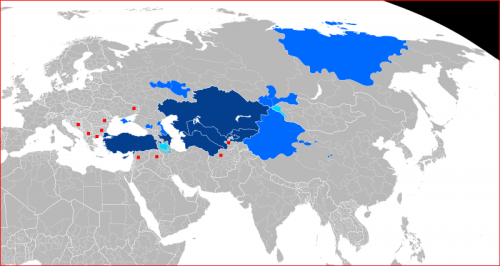
Nous en arrivons ainsi aux relations complexes avec les Russes. Ankara veut maintenir des relations bivalentes sur le plan militaire, mais cordiales sur le plan économique (elle n'a pas participé aux sanctions et a tenté d'organiser des sommets de la paix), un cas typique d'équilibrage avancé. Pour débusquer les "ambiguïtés" d'Erdogan (les mentalités dichotomiques qualifient d'"ambiguïté" tout ce qui n'est pas tout simplement noir ou tout simplement blanc) ou peut-être simplement pour suivre les intérêts des alliés "stan", Moscou a invité Ankara à rejoindre leur union militaire (OTSC), même si elle sait que c'est peu probable puisque les Turcs font partie de l'OTAN. Attention au Caucase. Ankara est avec l'Azerbaïdjan dans l'affaire du Nagorno-Karabakh, contre l'Arménie, la Russie à l'opposé. Je signale la sortie récente de Kadyrov (Tchétchène-Russe) engagé et à bien des égards crucial dans le conflit en Ukraine, un musulman, qui se dresse précisément contre les "ambiguïtés" d'Erdogan, la Tchétchénie est au beau milieu du Caucase et il y a des Tchétchènes qui sont peut-être parrainés par les Turcs du côté ukrainien, chose que n'apprécie pas Kadyrov dont le poids politique en Russie augmente.
Nous pouvons donc conclure en revenant sur les relations avec les États-Unis. En avril dernier, les États-Unis et la Turquie auraient mis en place un nouveau "mécanisme stratégique" conjoint, dirigé par Victoria Nuland (!), dont la première réunion a eu lieu à Washington entre Blinken et Cavasoglu il y a quelques jours. Tous les jeux énumérés ici composent un parallélogramme très complexe dans lequel les États-Unis tentent de s'insérer aux côtés d'Ankara, en donnant et en demandant. Après tout, Erdogan a fait de l'équilibre multipolaire la figure structurelle de sa stratégie géopolitique.
Nous avions besoin du cas turc à la fois pour actualiser le tableau des relations complexes avec le sommet turc et pour montrer à quel point elles sont complexes. On peut compter au moins 25 États de la vaste région "péri-ottomane" impliqués dans les relations avec Ankara, dont, en plus, trois puissances (USA-Russie-Chine), pour six macro-zones -Asie-Arabie-Afrique-Europe-Amérique-Méditerranée-, avec de multiples interrelations militaires, économiques, culturelles-religieuses, énergétiques, migratoires, géopolitiques, compétitives et coopératives.
Ce thème (la géopolitique d'aujourd'hui et de demain) sera désormais comme cela. Vous comprendrez donc comment le fait de s'enfermer dans l'angoisse du jugement, de surcroît litigieux, avant même d'avoir compris 10% du sujet, de cette affaire ou d'autres, expose la plupart au ridicule. Ceux qui minimisent ensuite la complexité vont également au-delà du ridicule, ce qui devrait être souligné et qui était alors le but implicite du poste laborieux.
[Le post mentionne le balayage des sujets mais ne suit pas entièrement le contenu de l'article de Ria Novosti que je joins tout de même par souci d'exactitude: https://ria.ru/20220522/ssha-1789945361.html ].
12:46 Publié dans Actualité, Affaires européennes, Géopolitique | Lien permanent | Commentaires (0) | Tags : turquie, levant, méditarranée, asie centrale, russie, ukraine, europe, politique internationale, affaires européennes, erdogan |  |
|  del.icio.us |
del.icio.us |  |
|  Digg |
Digg | ![]() Facebook
Facebook
jeudi, 12 mai 2022
Que faut-il attendre de l'élection présidentielle turque de 2023?
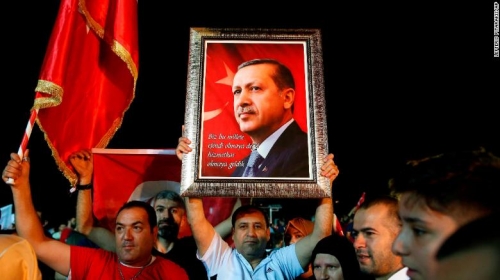
Que faut-il attendre de l'élection présidentielle turque de 2023?
Leonid Savin
Source: https://katehon.com/en/article/what-expect-2023-turkish-presidential-election
Pour la Russie, la défaite de Recep Erdogan peut être utile
Des élections présidentielles et législatives auront lieu en République de Turquie à l'automne 2023. Le pays ayant récemment connu une forme de gouvernement présidentiel (ce qui a donné lieu à des accusations d'usurpation du pouvoir par Erdogan de la part de l'opposition et des pays occidentaux), l'essentiel pour l'avenir de la Turquie n'est pas la répartition des sièges au parlement, mais le poste de chef d'État. L'orientation future de notre politique en dépend, tant dans la sphère extérieure que dans les affaires intérieures.
Le Parti de la justice et du développement de Recep T. Erdogan, au pouvoir, dispose aujourd'hui, selon les sondages, d'environ 33 % du soutien des électeurs. Les avoirs économiques créés sous le règne d'Erdogan sont orientés vers la Russie, le Moyen-Orient, l'Afrique et l'Asie.
Mais la politique étrangère d'Erdogan elle-même est clairement expansionniste - sous lui, la Turquie a pris pied dans le nord de la Syrie et dans certaines parties de l'Irak, a participé aux batailles en Libye et a étendu sa zone économique en Méditerranée, bien que de manière unilatérale. Les méthodes de soft power de la Turquie sont activement utilisées en Asie centrale, en Afrique et dans les Balkans.
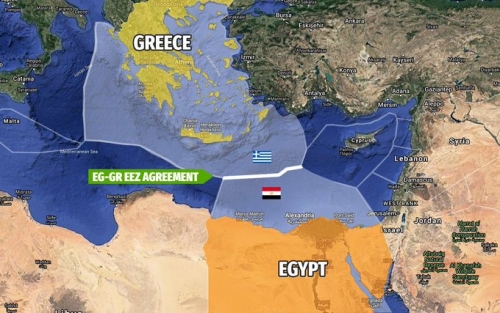
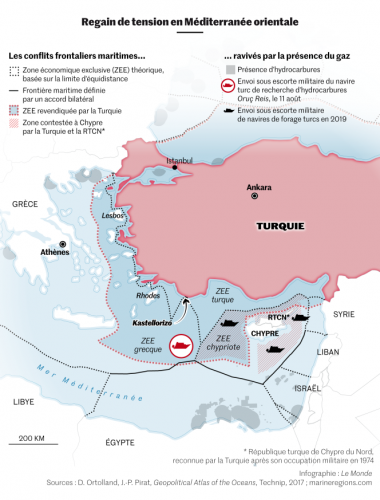
Bien que des mesures conservatrices aient été prises en politique intérieure, comme le retrait de la Convention d'Istanbul, qui rapproche les positions de la Turquie et de la Russie, et assimile aux yeux de l'Occident le président Vladimir Poutine et Erdogan à des dirigeants autocratiques.
Quelles sont les ambitions politiques de l'opposition turque actuelle et des autres forces qui prétendent participer à la construction de l'État ?
Le principal concurrent du parti d'Erdogan est le Parti républicain du peuple aux racines historiques, puisqu'il a été créé par le fondateur de la Turquie moderne, Atatürk Kemal. Selon les sondages de sortie des urnes, ils ont maintenant 28%. Le parti n'a pas de programme et d'idéologie clairement perceptibles. Ils sont un mélange hétéroclite de libéraux de gauche, d'anciens communistes, d'Alevis (c'est-à-dire de minorités religieuses), de groupes laïques, de partisans du mariage homosexuel et d'autres pro-occidentaux.
Ils ont une position pro-allemande prononcée (il faut rappeler qu'un grand nombre de Turcs vivent en Allemagne), d'où l'orientation extérieure vers l'UE. En ce qui concerne l'agenda politique intérieur, ils s'appuient sur une opposition ouverte à Erdogan.
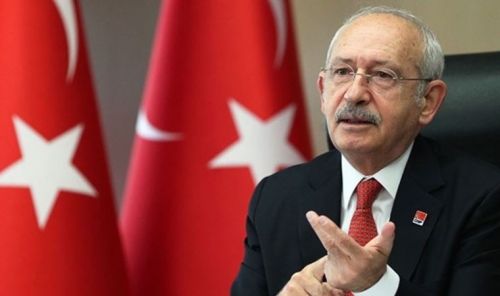
Le chef du parti est un politicien plutôt âgé, Kemal Kılıçdaroğlu (photo), qui est complètement dépendant des sociétés occidentales et des oligarques turcs liés à l'Europe. Il a déjà annoncé qu'il participerait aux élections en tant que candidat à la présidence. Sur les questions internes du parti, Kılıçdaroğlu est une figure de compromis qui règle les désaccords internes du parti.
Il est assez significatif que l'actuel maire d'Istanbul, Ekrem İmamoğlu, soit plus charismatique et plus performant. Il a également manifesté son intérêt à participer aux élections, mais la direction du parti lui a interdit de se présenter, considérant qu'il valait mieux occuper le poste de chef de la métropole.
Il convient d'ajouter que le parti dispose d'un assez bon financement, et que l'ancienne élite kémaliste le soutient par solidarité. L'Union des industriels et des entrepreneurs de Turquie, qui a précédemment établi des liens avec des structures européennes, est un donateur du Parti républicain du peuple.
Un autre personnage clé du Parti républicain du peuple est Ünal Çeviköz, qui est responsable de la politique étrangère. Ancien employé du ministère turc des Affaires étrangères, il est membre d'une loge maçonnique et a participé en 2019 à une réunion du club Bilderberg.
Il y a aussi le relativement nouveau Parti du Bien (IYI) - ce sont des nationalistes occidentaux, et le parti lui-même a en fait été créé par les États-Unis et l'UE afin d'arracher une partie de l'électorat au parti de Recep Erdogan. Il est paradoxal que les dirigeants de l'IYI s'opposent à la Russie, alors que l'électorat ordinaire nous traite normalement (y compris au sujet de l'opération en Ukraine).
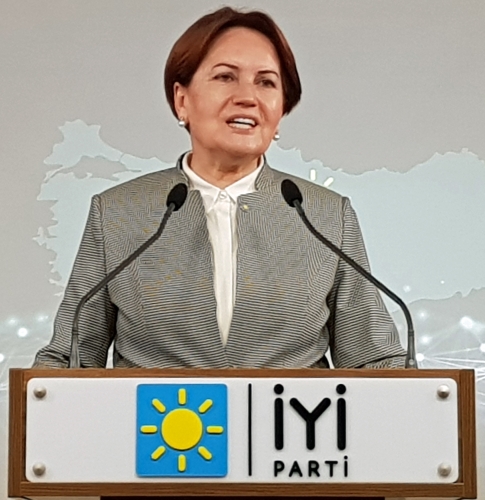
Le chef du parti est une femme - Meral Akşener (photo), et elle est pro-occidentale dans ses convictions. Ils sont maintenant dans une coalition avec le Parti républicain du peuple. On ne sait pas encore si Meral Akşener se présentera en tant que candidate indépendante à la présidence.
Le Parti démocratique des peuples, qui représentait les intérêts des Kurdes, ne pourra probablement pas se remettre des purges et arrestations massives. Le chef du parti, Selahattin Demirtaş, est un politicien expérimenté, et les représentants locaux ont remporté de nombreux sièges à la mairie lors des dernières élections, mais ils ont tous été arrêtés car soupçonnés d'être impliqués dans le terrorisme. Théoriquement, leurs chances sont bonnes, mais le gouvernement actuel ne leur permet tout simplement pas de consolider officiellement leur victoire et d'étendre leur influence.
Toutefois, les analystes occidentaux soulignent que ce sont les Kurdes qui constitueront un atout important lors des prochaines élections, car ils ont une démographie croissante et comptent de nombreux jeunes de dix-huit ans et plus parmi eux.
Il se murmure qu'un parti trouble-fête pourrait être formé, composé de partisans du clan Barzani du Kurdistan irakien, car ils entretiennent de bonnes relations officielles avec Ankara. Barzani admet le bombardement turc d'une partie du Kurdistan irakien, où se trouve le siège du Parti des travailleurs du Kurdistan.
La question est de savoir comment convaincre la jeunesse kurde de Turquie de rejoindre ce parti, et quelle sera la position concernant la nomination d'un candidat à la présidence. Bien que tout cela ne soit que des affabulations théoriques et qu'il soit tout à fait possible qu'Erdogan poursuive le cours de la répression des Kurdes turcs.
Selon les sondages d'opinion, le Parti démocratique des peuples est le plus russophobe et le plus pro-occidental.
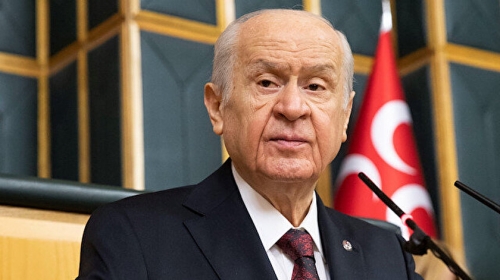
Enfin, il y a le Parti du mouvement national (dirigé par Devlet Bahçeli - photo). En fait, ce sont les fameux "loups gris", c'est-à-dire les nationalistes religieux. Ils sont maintenant les alliés d'Erdogan. D'ailleurs, de toutes les organisations répertoriées, ce sont les meilleures en Russie.
Et le dernier facteur de la politique turque est l'armée. Mais après une tentative de coup d'État ratée en 2016, l'armée a été sévèrement purgée. Maintenant, ils sont complètement subordonnés à Erdogan, et il n'y a aucune ambition politique parmi les militaires, à moins qu'à un niveau secret profond, il y ait un petit groupe de conspirateurs.
Si l'on parle de chances réelles, compte tenu de la situation actuelle, alors Recep Erdogan a les meilleures positions à l'heure actuelle. Bien que le pays connaisse un niveau élevé d'inflation et que la livre turque se soit effondrée il y a quelques mois, le parti au pouvoir dispose d'une ressource administrative et utilise la situation de la politique étrangère à son avantage.
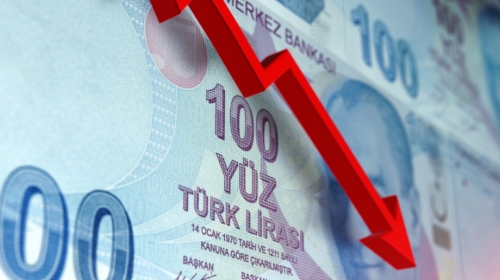
À titre d'exemple, nous pouvons citer l'équilibre actuel des relations avec la Russie et l'Ukraine. Pour organiser le flux touristique de la Russie vers la Turquie, une compagnie aérienne supplémentaire est créée. Tandis que des drones Bayraktar sont livrés à l'Ukraine et qu'un soutien diplomatique est apporté.
Et c'est dans ces relations et cet équilibre des forces que la Turquie a un intérêt géopolitique important à affaiblir la Russie. Ce n'est pas un hasard si les Turcs s'intéressent activement à la Crimée et ne la reconnaissent pas comme faisant partie de la Russie, ainsi qu'au Caucase et à la région de la Volga. La Turquie a besoin du projet du panturquisme pour servir de parapluie et de justification à une éventuelle ingérence dans les affaires intérieures de la Russie.
La chaîne de télévision russophone TRT adhère à un cours ouvertement russophobe, qui soutient Navalny et Khodorkovsky, sans parler de l'incitation au séparatisme à l'intérieur de la Russie en mettant l'accent sur l'identité musulmane et turque. Le projet de "génocide circassien" y est également lié, ainsi que divers éléments commémoratifs, tels que des noms de rues en l'honneur de Dzhokhar Dudayev.
Comme le Parti de la justice et du développement se concentre sur l'identité religieuse turque, le souvenir de l'ancienne grandeur de l'Empire ottoman est également très important pour la politique moderne. Et là aussi, il y a une place pour les aspirations anti-russes, car la Turquie rappelle le rôle de l'Empire russe dans la libération des Balkans de la domination turque et une série de guerres russo-turques.
Par conséquent, l'affaiblissement possible de la Russie dans cette région est considéré comme une nouvelle opportunité pour le retour du pouvoir perdu. Et si vous le regardez à travers un prisme religieux, l'expansion turque pour Ankara est aussi la propagation de l'Islam dans de nouveaux territoires. Dans le même temps, la version turque de l'Islam est clairement différente de la version arabe classique.
Par conséquent, il est peu probable que le maintien du pouvoir suprême pour Erdogan conduise à une amélioration des relations avec la Turquie. Au mieux, une coopération pragmatique se poursuivra, notamment en raison de la forte dépendance de la Turquie vis-à-vis des approvisionnements en pétrole et en gaz russes. Mais dans le pire des cas, Ankara se comportera de manière plus persistante et agressive à l'égard de Moscou, et elle devra alors envoyer des signaux explicites, tels qu'une interdiction d'importation de légumes ou une suspension du flux touristique.
Si la situation s'avèrera encore pire, il est difficile d'imaginer quel niveau la confrontation entre la Russie et la Turquie pourra atteindre. Encore une fois, il faut se rappeler que la Turquie est membre de l'OTAN et peut se joindre aux sanctions occidentales à tout moment.
Considérons maintenant la version qui se produirait si des forces pro-occidentales prenaient le pouvoir en Turquie. Par exemple, avec l'aide d'injections financières et d'autres moyens, le chef du Parti républicain du peuple prendra le poste de président.
Tout d'abord, ils commenceront à éliminer les réalisations d'Erdogan, tenteront de revenir au format de la république parlementaire et promouvront activement un système politique laïc. Bien sûr, étant donné leur position pro-occidentale, les Etats-Unis et l'UE les presseront pour qu'ils se dressent contre la Russie. Mais il est peu probable qu'ils renoncent au gaz et au pétrole russes, même s'ils peuvent soutenir certaines des sanctions et le feront très probablement.
En général, il y aura un grand conflit d'intérêts. Cependant, il y aura le chaos à l'intérieur du pays, et compte tenu de cela, il est peu probable que les pro-occidentaux poursuivent une politique étrangère expansionniste. Le plus probable est qu'ils essaieront d'améliorer les relations avec l'UE, et encore une fois, ils attendront naïvement de rejoindre cette association.
Il est certain que les pays musulmans seront sceptiques à l'égard du nouveau gouvernement, ce qui signifie une réduction ou un retrait du soutien des riches États du Golfe. Et un tel affaiblissement de la Turquie sera bénéfique pour la Russie, car avec une approche compétente, il sera possible non seulement de préserver les acquis nécessaires, mais aussi de montrer à la société turque tous les avantages de relations bilatérales véritablement de bon voisinage.
23:02 Publié dans Actualité, Géopolitique | Lien permanent | Commentaires (0) | Tags : leonid savin, actualité, turquie, élections turques, erdogan, russie, politique internationale, géopolitique |  |
|  del.icio.us |
del.icio.us |  |
|  Digg |
Digg | ![]() Facebook
Facebook
vendredi, 25 mars 2022
La carte tatar d'Erdogan
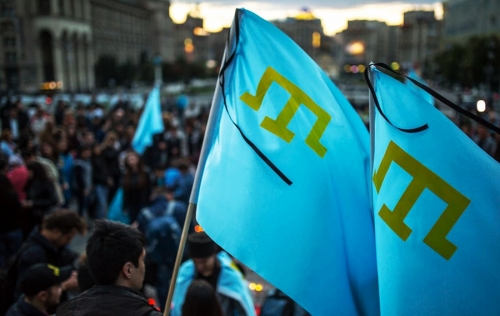
La carte tatar d'Erdogan
La Turquie dispose d'un avantage considérable par rapport aux autres pays pour servir de médiateur entre l'Ukraine et la Russie. L'activisme d'Ankara est dicté par une stratégie préparée au fil des ans. Un bref excursus.
Emanuel Pietrobon
Source: https://www.dissipatio.it/erdogan-zelensky-pace/
L'Ukraine de Zelensky a dès le départ tenté d'obtenir le statut de membre observateur au sein du Conseil de coopération des pays de langue turque, également connu sous le nom de "Conseil turc", une organisation internationale basée à Ankara. Cette nouvelle n'est en fait pas une nouvelle pour ceux qui ont suivi l'évolution de la dynamique ukrainienne depuis l'ère post-Euromaidan. En gagnant la bataille pour l'Ukraine, l'Occident a réussi à se rapprocher de la réalisation du rêve de Zbigniew Brzezinski d'expulser la Russie de l'Europe, la transformant en un "empire asiatique". Entre ce scénario et sa réalisation finale, il ne reste plus que trois obstacles : le Belarus, la Moldavie et la Serbie.
En bref, ce à quoi nous assistons, c'est à la disparition de tout le système d'États tampons construit par Staline dans l'entre-deux-guerres pour protéger la Russie d'une invasion extérieure. Ce système est sur le point de s'effondrer car il a été incorporé dans l'orbite euro-américaine par l'élargissement de l'Union européenne et de l'Alliance atlantique. Aujourd'hui, la Russie est encerclée de partout - pas seulement au départ de l'Europe, pensez par exemple à ce qui se passe dans le Caucase du Sud et en Asie centrale. Mais revenons à l'Europe. La Biélorussie est secouée par une grande mobilisation d'une partie ostensible de sa société depuis la nuit du 9 août 2021 ; la Moldavie est un acteur vulnérable en raison de son besoin constant d'investissements étrangers et de la présence d'une minorité turque en Gagaouzie que la Turquie subjugue habilement, tandis que la Serbie est presque entièrement entourée de pays de l'OTAN, même si sa position au sein de l'orbite russe ne semble pas se fissurer pour l'instant (à voir également les manifestations pro-russes de ces jours-ci).
Pour en revenir à l'Ukraine, l'entrée au Conseil turc ne se prête qu'à une seule interprétation : le pays passerait rapidement du monde russe au monde turc. Cette situation ne caractérise pas seulement Kiev, mais de nombreux autres pays, comme les anciens États soviétiques d'Asie centrale et l'Azerbaïdjan, et des régions, comme la Gagaouzie, que je viens de mentionner, et les républiques russes à composition ethnique turque, du Caucase du Nord à la Sibérie. La nouvelle du projet ambitieux du gouvernement ukrainien a été donnée par Emine Dzheppar (photo, ci-dessous), une politicienne ukrainienne d'origine tatare qui a récemment été nommée première vice-première ministre chargée des affaires étrangères. M. Dzheppar, interviewé dans le passé par l'agence de presse turque Demirören, a expliqué que la présidence Zelensky souhaitait rejoindre le Conseil turc parce que :
"Nous sommes des pays voisins. L'Ukraine est l'héritière de la culture turque. Les Tatars de Crimée sont un pont entre l'Ukraine et la Turquie" (Emine Dzheppar).
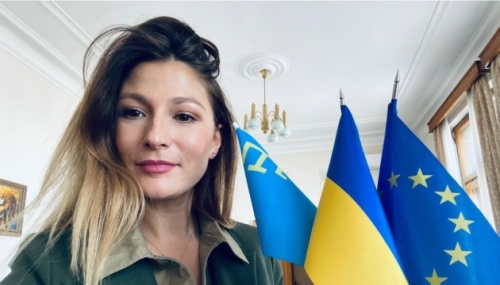
S'il est vrai que les Tatars constituent un point de connexion utile entre l'Ukraine et la Turquie, le passage sur la prétendue identité turque de l'Ukraine est discutable. En fait, elle n'est même pas discutable : elle est tout à fait anti-historique. Il s'agit d'une tentative de réécrire à la fois l'histoire et l'identité de l'Ukraine, qui est, était et sera toujours le berceau de la civilisation russe. Les Tatars représentent une très petite minorité - environ 70.000 personnes selon le recensement de 2001 - mais ils sont la clé de voûte de l'Ukraine pour entrer dans les bonnes grâces de la Turquie et de l'Occident.
Dès le départ, la décision de rejoindre le Conseil turc a été précédée de nombreuses autres initiatives et l'entrée finale dans l'organisation n'était que l'étape naturelle d'un voyage entamé par Volodymyr Zelensky en août 2019 par une visite officielle à Ankara. Depuis lors, les deux pays ont rapidement construit un partenariat stratégique très solide qui, aujourd'hui, s'étend du commerce à l'industrie, de la défense à la sécurité régionale, de la politique étrangère à la Crimée. Ce dernier point est particulièrement important pour les deux, car il s'agit d'un moyen de saper la grande stratégie de la Russie pour la mer Noire.
Mais pourquoi, dans le passé, l'Ukraine est-elle sur le point de devenir une partie intégrante du monde turc ? Il ne s'agit pas seulement du Conseil turc, de nombreux autres événements se sont produits au cours des dernières années. En juillet 2021, l'ambassadeur turc à Kiev, Yagmur Ahmet Gulder, a annoncé que la Turquie allait construire une maxi-mosquée au cœur de la capitale ukrainienne. Les négociations concernant le terrain ont déjà été résolues et les travaux devraient bientôt commencer. Une fois terminée, la mosquée sera la plus grande du pays : le projet prévoit une capacité d'au moins 5000 fidèles. Le gouvernement turc a fourni cinq millions de dollars pour sa construction. L'idée de construire une nouvelle mosquée à Kiev ne vient pas de Turquie, mais de Mustafa Dzhemilev, le chef du Mejlis, l'organe représentatif officiel des Tatars, qui a été mis hors la loi en Crimée pour cause d'extrémisme. Selon Dzhemilev, le pays a besoin d'une nouvelle mosquée en raison de l'arrivée de dizaines de milliers de Tatars de la péninsule au cours des six dernières années.
Avec en toile de fond les négociations sur la mosquée, la Turquie travaille depuis des années à la construction d'appartements résidentiels pour des centaines de familles tatares dans les villes de Kharkiv, Lviv, Odessa, Kherson et Dnipro. Ces deux initiatives ont été très bien accueillies par la minorité turque et amélioreront considérablement l'image de Recep Tayyip Erdogan en tant que protecteur du peuple turc et des musulmans en général. Mais avant même l'annonce de la mosquée, un événement historique s'est produit le 18 mai. Zelensky avait inclus deux célébrations islamiques très importantes dans le calendrier national des jours fériés : la fête du sacrifice (Eid al-Adha) et la fête de la rupture du jeûne (Eid al-Fitr).
La date de l'annonce a été soigneusement choisie car l'objectif était d'accroître la portée symbolique de l'acte : en effet, le 18 mai de chaque année, les Tatars observent ce que l'on appelle la "Journée de commémoration des victimes du génocide des Tatars de Crimée". Depuis 2014, cet événement historique est officiellement inclus dans la liste des guerres de mémoire liées à la Seconde Guerre mondiale qui divisent l'Occident et la Russie. Aujourd'hui, cette date, grâce à Zelensky, a pris une importance égale pour les Ukrainiens, les Tatars et les Turcs. Selon le président ukrainien, la reconnaissance officielle des fêtes islamiques est une étape fondamentale vers la construction d'une "nouvelle Ukraine au sein de laquelle chacun peut se sentir citoyen".
Le même jour, M. Zelensky a également annoncé la formation d'un groupe de travail au sein du bureau de la présidence, spécialisé dans les questions relatives aux Tatars. L'objectif était d'améliorer les conditions de vie de la minorité dans le pays. Ce sont donc les Tatars qui ont conduit l'évolution du partenariat turco-ukrainien formé l'année dernière. En août dernier, Zelensky a assisté à l'inauguration d'un bureau de représentation des Tatars de Crimée à Ankara. En février, c'était au tour d'Erdogan à Kiev, où le président turc a annoncé un plan de logement pour les Tatars qui avaient fui la péninsule, réaffirmant que son gouvernement ne reconnaîtrait jamais le nouveau statu quo car "la Crimée est la patrie historique des Tatars".
La carte tatare est utile aux deux parties : Kiev peut améliorer son image à l'Ouest, Ankara peut accroître son prestige dans le monde turc et islamique et, simultanément, élargir sa marge de manœuvre à l'intérieur de l'Ukraine dans l'espoir de combler le vide de pouvoir laissé par le Kremlin. Enfin, comme cela a déjà été écrit, jouer la carte des Tatars est le seul moyen pour les rivaux ou les pacificateurs de la Russie de garder ouverte la possibilité de déstabiliser la péninsule par une insurrection à motivation ethnique - ou, comme c'est le cas actuellement, de servir de médiateur entre les deux prétendants. La Russie est confrontée à un défi historique, car le scénario tant redouté de l'encerclement qui hantait les rêves de Staline est devenu une réalité, et la chute des États de la zone-tampon entraînera un déplacement de l'attention vers les républiques turco-musulmanes de Russie. Le risque d'une implosion de type soviétique est élevé, et les dirigeants du Kremlin sont appelés à élaborer une refonte stratégique globale : il en va de la survie même de la Russie telle que nous la connaissons aujourd'hui.
16:01 Publié dans Actualité, Affaires européennes, Géopolitique | Lien permanent | Commentaires (0) | Tags : ukraine, tatars, erdogan, turquie, europe, affaires européennes, actualité, politique internationale, géopolitique, crimée |  |
|  del.icio.us |
del.icio.us |  |
|  Digg |
Digg | ![]() Facebook
Facebook
dimanche, 07 novembre 2021
Erdogan continue de jeter de l'huile sur le feu du conflit libyen
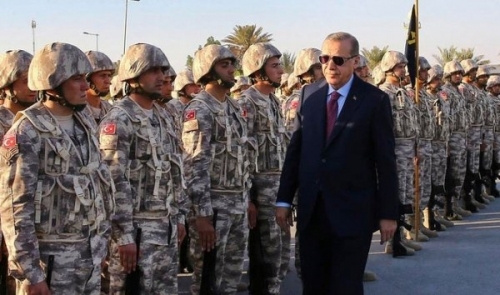
Erdogan continue de jeter de l'huile sur le feu du conflit libyen
par Alessandro Sansoni
Ex: https://www.lavocedelpatriota.it/erdogan-continua-a-gettare-benzina-sul-fuoco-del-conflitto-libico/?fbclid=IwAR1eql9a2imoe7z0Pg2UZdKtsmv0T4YC7N6wHrH2SHZB18VPSJavJUz4JSc
Les reportages triomphalistes des médias nous ont empêchés d'y prêter toute l'attention nécessaire, mais un développement dangereux a émergé du G20 à Rome. Au cours du sommet, en effet, le président turc Recep Erdogan a déclaré officiellement, et en termes non équivoques, qu'Ankara refuse de retirer ses troupes de Libye. Cette déclaration intervient alors que l'ONU s'est engagée à organiser et à mener à bien le retrait de toutes les troupes étrangères présentes dans le pays, condition préalable indispensable à la célébration des élections censées ramener la paix dans le pays.
Par sa position, la Turquie jette de l'huile sur le feu et menace de porter à un niveau très élevé le conflit entre les factions qui se disputent le pouvoir en Libye, mettant ainsi en péril le processus électoral. Une situation qui aurait des répercussions graves et dangereuses pour l'Italie et l'ensemble de l'Union européenne.
Premier problème : le retrait des mercenaires
La Libye devrait organiser ses élections présidentielles tant attendues le 24 décembre, tandis que les élections législatives sont prévues pour le début de 2022.
L'espoir est de mettre ainsi fin à la longue période d'anarchie et de guerre civile dans laquelle le pays a plongé depuis la fin du régime de Mouammar Kadhafi en 2011, en sauvegardant éventuellement l'unité du territoire libyen, aujourd'hui effectivement divisé en une partie occidentale sous le contrôle du gouvernement de Tripoli et une partie orientale aux mains du général Khalifa Haftar et de son Armée nationale libyenne (ANL), engagés depuis des années dans un dur conflit non seulement avec les milices tripolitaines, mais aussi avec des groupes islamistes, alliés des Turcs. La situation est encore compliquée par le nombre élevé de mercenaires et de forces étrangères présents sur le terrain pour soutenir les deux prétendants.
C'est précisément pour cette raison que la feuille de route élaborée par les Nations unies prévoit, avant tout, l'élimination des groupes armés étrangers, qui doit être définie dans le cadre d'un format de négociation "5+5", dans lequel toutes les factions belligérantes sont présentes à la table des négociations, sous les auspices des Nations unies. Le 8 octobre, le Comité militaire conjoint "5+5" s'est réuni pendant trois jours au Palais des Nations à Genève et s'est conclu par la signature d'un plan d'action prévoyant un retrait progressif, équitable et coordonné de tous les mercenaires et forces étrangères de Libye.
La réunion de Genève s'est tenue conformément aux pistes définies dans l'accord de cessez-le-feu du 23 octobre 2020 et aux résolutions connexes émises par le Conseil de sécurité des Nations unies. La réunion faisait partie intégrante des diverses négociations intra-libyennes promues par l'ONU, ainsi que des efforts déployés par la communauté internationale à travers la conférence de Berlin.
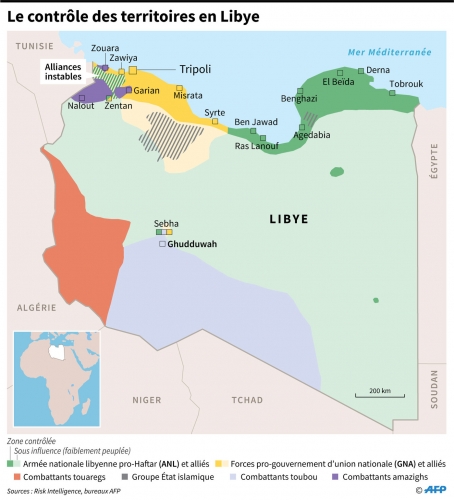
Début novembre, le Comité 5+5 a tenu une autre réunion, cette fois au Caire, toujours organisée par l'ONU, à laquelle ont également participé des représentants du Soudan, du Tchad et du Niger. À cette occasion, tous les pays voisins de la Libye ont exprimé leur volonté de coopérer au processus d'expulsion des combattants étrangers et des mercenaires, tandis que les délégués du Soudan, du Tchad et du Niger se sont engagés à coopérer pour assurer le retrait des hommes armés de leurs pays, en coordonnant leurs actions pour éviter qu'ils ne reviennent en Libye et ne déstabilisent les États voisins.
Cependant, le refus de la Turquie de s'aligner sur les accords généraux ouvre un problème gigantesque. En fait, près de la moitié des forces étrangères présentes en Libye sont liées à Ankara : selon le SOHR (Observatoire syrien des droits de l'homme), le nombre total de mercenaires syriens soutenus par la Turquie dans le pays d'Afrique du Nord est d'environ 7000, tandis que les Nations unies ont estimé la présence de 20.000 combattants étrangers sur le territoire libyen. Les sources de SOHR ont également confirmé qu'en dépit des tentatives de négociation de leur retrait début octobre, des miliciens islamistes vétérans du conflit syrien continuent d'être stationnés dans des bases turques en Libye, tandis qu'un nouveau contingent de 90 personnes en provenance de Syrie est arrivé en Libye transporté par des avions turcs.
G20 : la diplomatie à la turque
Lors du G20, Erdogan a non seulement confirmé son intention de ne pas démobiliser ses troupes en Libye, mais a également réaffirmé au président français Emmanuel Macron que la présence turque est légitimée par un accord de coopération militaire signé avec le gouvernement libyen.
"Nos soldats sont là en tant qu'instructeurs", a-t-il réitéré, niant que leurs activités puissent être assimilées à celles de mercenaires illégaux.
Or, ce n'est pas exactement le cas. Tout d'abord, ses propos peuvent s'appliquer au contingent militaire officiellement envoyé par l'armée turque début janvier 2020, et certainement pas aux mercenaires syriens qui continuent à être stationnés dans les bases militaires d'Ankara.
Par ailleurs, les accords conclus lors du sommet du 8 octobre à Genève font explicitement référence au retrait des "mercenaires, combattants étrangers et forces étrangères", les "forces étrangères" étant comprises comme incluant les troupes régulières et les instructeurs.
Enfin, les "instructeurs" turcs ont débarqué en Libye dans le cadre d'un accord signé par Ankara en novembre 2019 avec le gouvernement d'entente nationale (GNA) dirigé par Fayez al-Sarraj, un gouvernement intérimaire auquel a succédé en mars dernier le nouveau gouvernement d'union nationale dirigé par Abdul Hamid Dbeibah. Le point crucial, cependant, est qu'au moment où le traité a été signé, le mandat du GNA avait déjà expiré et donc, en tant que gouvernement intérimaire, il n'avait pas le droit de signer un tel traité de coopération militaire. C'est pour la même raison que tous les voisins de la Libye et de la Turquie ont désavoué le traité sur les frontières maritimes (et les zones économiques exclusives correspondantes) signé par Tripoli et Ankara au même moment. Ce dernier accord a considérablement étendu les revendications turques sur la Méditerranée et ses riches gisements de pétrole et de gaz.
C'est pour ces raisons que la présence militaire turque en Libye doit être considérée comme illégale au regard du droit international, car elle constitue un avant-poste des ambitions néo-impérialistes d'Erdogan. Ce n'est pas une coïncidence si Erdogan, pendant le G20, a annoncé son refus de participer au sommet sur la Libye à Paris (ce qui l'a fait couler), confirmant ainsi qu'il n'a aucune intention de soutenir les efforts internationaux visant à stabiliser le pays.
Nous avons notifié au président Macron, a déclaré Erdogan, notre refus de participer à une conférence à Paris à laquelle participent la Grèce, Israël et l'administration chypriote grecque. Pour nous, il s'agit d'une condition absolue. Si ces pays sont présents, cela n'a aucun sens pour nous d'envoyer des délégués".
À Rome, Erdogan a également eu une réunion séparée avec le Premier ministre Mario Draghi, mais celle-ci n'a donné aucun résultat concret. Aucun progrès n'a été enregistré dans les relations italo-turques, y compris en ce qui concerne le système de défense antimissile italo-français SAMP-T, pour lequel la Turquie avait précédemment manifesté son intérêt. Malgré l'annonce générale de développements futurs à cet égard, il est peu probable que la Turquie reprenne ce projet, à moins que ses relations avec Paris ne s'améliorent. Et Erdogan ne semble avoir aucune envie de poursuivre dans cette direction.
Tensions en Libye
Entre-temps, la situation politique en Libye devient de plus en plus précaire, surtout depuis que la Chambre des représentants (le parlement de Tobrouk) a remis en cause en septembre dernier, à l'instigation de Haftar, le gouvernement d'unité nationale.
D'un point de vue militaire, les tensions augmentent également, à tel point que ces derniers jours, les chefs de deux milices tripolines - Muammar Davi, chef de la Brigade 55, et Ahmad Sahab - ont été victimes d'attaques visant à les tuer.
À ce stade, il est difficile d'être sûr que les élections présidentielles auront lieu en décembre, tandis que les élections parlementaires ont déjà été reportées à 2022.
Le chantage d'Erdogan : géopolitique, énergie, flux migratoires
Si la Turquie a pu renforcer considérablement son influence en Libye, une part considérable de la responsabilité doit être attribuée aux gouvernements dirigés par Giuseppe Conte (surtout le second), caractérisés par un manque d'incisivité sur la question libyenne. Bénéficiant de facto d'une carte blanche, Ankara a pu, en quelques années seulement, débarquer des centaines de "conseillers militaires" dans le pays d'Afrique du Nord.
Avec le traité sur les frontières maritimes et la délimitation des zones économiques exclusives respectives, la Turquie a pris le contrôle du littoral de la Tripolitaine ainsi qu'une sorte de patronage sur les gisements de gaz et de pétrole de la Méditerranée centrale. Son influence politique sur le gouvernement d'accord national, puis sur le gouvernement d'unité nationale, est énorme.
La guerre civile entre Tripoli et Benghazi a permis à Ankara de fournir des troupes et des armes au camp ouest-libyen, de redéployer ses milices mercenaires précédemment actives en Syrie et d'obtenir la gestion du port et de l'aéroport de Misurata pour les 99 prochaines années.
Aujourd'hui, Erdogan, grâce à la forte influence qu'il est en mesure d'exercer sur l'un des plus grands producteurs de pétrole au monde, dispose d'une arme supplémentaire pour faire pression sur l'Europe, celle de l'approvisionnement énergétique, en plus de l'arme déjà largement utilisée du contrôle des flux migratoires, qu'il est désormais en mesure de réguler non seulement sur la route des Balkans, mais aussi sur celle de la Méditerranée centrale. La route la plus empruntée par les trafiquants d'êtres humains, selon les chiffres officiels, selon lesquels, au 22 octobre, 51.568 migrants sont déjà arrivés en Italie cette année, contre 26.683 en 2020.
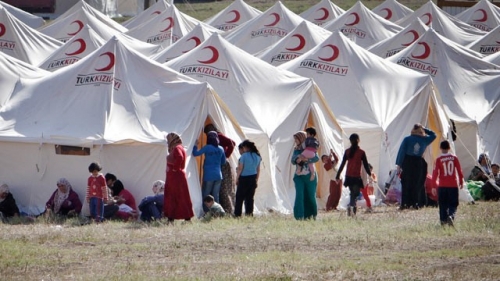
Les demandes de Draghi à l'Union européenne d'allouer des fonds pour protéger "toutes les routes" sont du miel aux oreilles turques. Ils font en effet référence aux 6 milliards que Bruxelles a déjà versés à la Turquie pour gérer la route des Balkans et à ceux qu'elle versera encore. Il y a actuellement 3,7 millions de Syriens vivant sur le sol turc, auxquels il faut ajouter 300.000 Afghans. Une bombe à retardement qu'Ankara menace de faire exploser à tout moment si ses exigences ne sont pas satisfaites.
En bref, les crises humanitaires - de l'Afghanistan à la Syrie, auxquelles s'ajoute désormais la crise libyenne - sont devenues une occasion extraordinaire pour la Turquie d'obtenir des ressources de l'Europe et de la maintenir sous pression. C'est pourquoi le maintien d'un gouvernement pro-turc à Tripoli est si important pour Erdogan : il lui permet de jouer un jeu géopolitique complexe contre l'UE qui combine énergie et flux migratoires.
Reconstruire un équilibre en Méditerranée et redimensionner les ambitions turques en adoptant une attitude plus ferme à l'égard du nouveau sultan est le véritable défi que l'Italie doit relever, plutôt que de s'aventurer dans des aspirations improbables et irréalistes à diriger l'UE ou à renforcer les relations transatlantiques.
Alessandro Sansoni
Directeur du magazine mensuel CulturaIdentità
11:26 Publié dans Actualité, Affaires européennes, Géopolitique | Lien permanent | Commentaires (0) | Tags : actualité, méditerranée, libye, turquie, erdogan, afrique du nord, afrique, affaires africaines, géopolitique, politique internationale |  |
|  del.icio.us |
del.icio.us |  |
|  Digg |
Digg | ![]() Facebook
Facebook
mardi, 07 septembre 2021
De nouvelles armes turques pour contrôler la Méditerranée
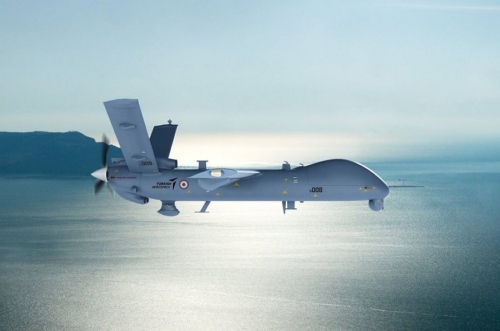
De nouvelles armes turques pour contrôler la Méditerranée
Lorenzo Vita
Ex: https://it.insideover.com/difesa/le-nuove-armi-turche-per-controllare-il-mediterraneo.html
La Turquie ne vise pas seulement à se doter de drones aériens, mais aussi de navires sans pilote. Un retournement de situation qui a commencé il y a quelques années et qui montre une évolution très rapide, notamment depuis la fin de l'année 2020. Les dernières nouvelles à ce sujet proviennent du Daily Sabah, l'un des principaux organes de presse de Turquie. Les médias anatoliens ont annoncé que le géant de la défense Aselsan a conçu, en collaboration avec le chantier naval Sefine, de nouvelles plates-formes (de surface et anti-sous-marines), qui représentent pour Ankara une étape supplémentaire dans sa politique de contrôle des mers. Une politique qui, depuis longtemps, a été synthétisée dans la "patrie bleue".
 La défense turque a pour objectif de les avoir d'ici la fin de l'année. Elles sont pratiquement indigènes, résultat d'une synergie entre divers segments de l'industrie turque bénis par le gouvernement de Recep Tayyip Erdogan. Un système de nationalisation de l'industrie de l'armement qui, en Turquie, trouve l'un de ses piliers dans le projet Milgem et qui vise non seulement à approvisionner les arsenaux nationaux sans passer par l'importation, mais aussi à vendre ces systèmes à l'étranger. Les drones turcs sont déjà très convoités dans plusieurs pays européens et asiatiques. Et maintenant, Ankara souhaite étendre ce marché au secteur maritime.
La défense turque a pour objectif de les avoir d'ici la fin de l'année. Elles sont pratiquement indigènes, résultat d'une synergie entre divers segments de l'industrie turque bénis par le gouvernement de Recep Tayyip Erdogan. Un système de nationalisation de l'industrie de l'armement qui, en Turquie, trouve l'un de ses piliers dans le projet Milgem et qui vise non seulement à approvisionner les arsenaux nationaux sans passer par l'importation, mais aussi à vendre ces systèmes à l'étranger. Les drones turcs sont déjà très convoités dans plusieurs pays européens et asiatiques. Et maintenant, Ankara souhaite étendre ce marché au secteur maritime.
Il s'agit d'une double approche qui découle de deux besoins très ressentis par l'administration turque. D'une part, l'objectif de rendre sa propre défense de moins en moins dépendante des pays étrangers. Un problème qui est devenu central pour la Turquie, surtout après avoir pris conscience de la fragilité de la chaîne d'approvisionnement en cas de blocage politique par l'Occident. Le cas du F-35 - avec toutes les différences de l'affaire - illustre un danger qui guette Erdogan: faire une politique étrangère de plus en plus autonome en dépendant de Bruxelles et de Washington au niveau militaire signifie devoir réduire les attentes de son propre travail.
La question est devenue si importante qu'il a dû étendre le programme de drones nationaux aux armes embarquées sur le futur porte-avions Anadolu, transformé pour l'instant en porte-drones ou en projet d'hélicoptères en attendant que la Turquie revienne au programme F-35. Une attente qui n'est cependant pas nécessairement une limitation. En fait, le blocus a rendu nécessaire pour Ankara de développer, le plus rapidement possible, une technologie autonome pour remplacer ces systèmes liés à la volonté de Washington. Et c'est un virage qui a permis à la Turquie de mener à bien un programme national au point de pouvoir utiliser ses drones à la fois comme une arme et comme un moyen de nouer des partenariats avec d'autres États.
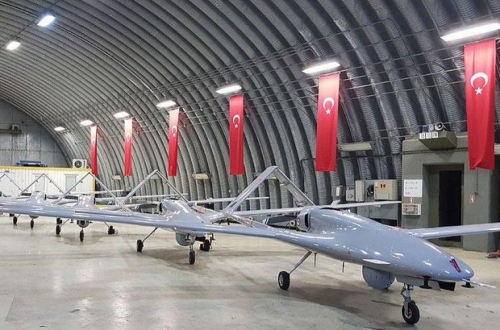
Des sources qualifiées de l'InsdeOver rapportent, par exemple, que c'est précisément en raison de ce développement croissant des drones armés (en particulier, le redoutable Bayraktar) que certains, au sein de l'État grec, pensent que l'hypothèse d'une base pour ces moyens dans la partie nord de Chypre, en particulier à Gecitkale, est toujours sur la table. Une hypothèse émise dans le passé par certains analystes et qui semble aujourd'hui tout à fait irréalisable. Les drones aériens, ainsi que les unités sans pilote pour contrôler les eaux dans un rayon d'environ 600 miles (ce sont les données du projet Aselsan) pourraient constituer un tournant fondamental dans la projection stratégique de la Turquie dans les eaux bouillonnantes de la mer Égée et de la Méditerranée orientale.
15:43 Publié dans Actualité, Affaires européennes, Géopolitique | Lien permanent | Commentaires (0) | Tags : turquie, armements, industrie turque de l'armement, europe, méditerranée, affaires européennes, méditerranée orientale, géopolitique, erdogan |  |
|  del.icio.us |
del.icio.us |  |
|  Digg |
Digg | ![]() Facebook
Facebook
samedi, 07 août 2021
Istanbul, le canal de la discorde
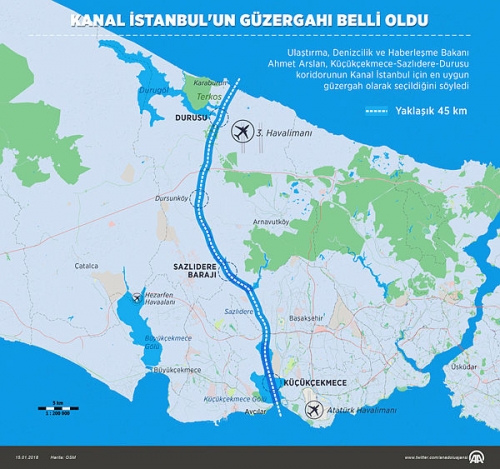
Istanbul, le canal de la discorde
par Marco Valle
Ex: https://blog.ilgiornale.it/valle/2021/08/07/
Samedi 5 juillet 2021, Recep Tayyip Erdogan a officiellement inauguré les travaux du Kanal Istanbul, une voie navigable de 45 kilomètres de long, 150 mètres de large et 25 mètres de profondeur qui reliera la mer Noire à la mer de Marmara. Aussi grand, sinon plus, que Suez et Panama, l'ouvrage contournera le détroit du Bosphore, décongestionnant le passage maritime encombré (48.000 transits par an en moyenne) et transformant la partie européenne de la métropole turque en une véritable cité insulaire.
L'ouverture des chantiers, aussi symbolique soit-elle, couronne l'ancien rêve de Soliman le Magnifique : une idée visionnaire et ambitieuse que, cinq siècles après le départ du sultan, le président à la main de fer a reprise et relancée avec obstination. La première annonce de l'ouverture du "quatrième détroit" turc remonte à 2011 - "voici mon projet fou", a-t-il proclamé devant les ministres ébahis - ; maintes fois reporté, modifié et discuté, le plan a finalement été approuvé par le Parlement en mars dernier. L'excavation sera achevée, du moins selon des sources gouvernementales optimistes, en seulement six ans et coûtera au total environ 15 milliards de dollars.
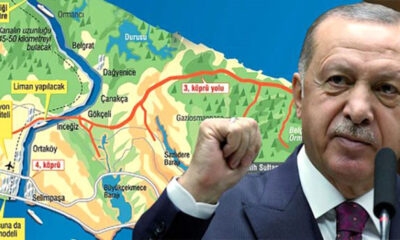
Apparemment, rien de nouveau, du moins pour les dirigeants de l'AKP, le parti au pouvoir depuis 2002. Depuis lors, son leader indéboulonnable, Erdogan - d'abord en tant que premier ministre et, depuis 2014, en tant que président de la république - a promu de grands projets d'infrastructure visant à moderniser le visage du pays, à promouvoir la croissance économique et, surtout, à renforcer le consensus interne, base de sa longévité au pouvoir. Un mécanisme qui s'est toutefois grippé puisque l'économie turque est en grande difficulté et que la dévaluation catastrophique de la livre turque (une perte de plus de 400% par rapport au dollar en une décennie) continue de pénaliser un cadre économique aggravé par les coûts de la pandémie, le ralentissement des activités de production et le recul très net du tourisme. En bref, des caisses à moitié vides, de nombreuses dettes et une question cruciale : qui va payer les coûts de "Kanal Istanbul"? Certainement pas les six principales banques d'affaires turques qui, comme le confirme Reuters, se sont montrées très réticentes à financer un projet coûteux et, en même temps, extrêmement conflictuel.
En attendant d'hypothétiques bailleurs de fonds étrangers - le ministre des transports Adil Karaismailoglu a évoqué des investisseurs chinois, qataris ou peut-être néerlandais - la contestation s'amplifie. En première ligne, le maire de la ville, Ekrem Imamoglu, membre du Parti républicain populaire, principale force d'opposition, ennemi juré d'Erdogan et probable adversaire aux élections présidentielles de 2023. Fort du soutien des scientifiques et des écologistes et des craintes de centaines de milliers d'habitants, M. Karaismailoglu n'a pas hésité à dénoncer les risques sismiques (le tracé longe la redoutable ligne de faille sismique anatolienne), les désastres écologiques imminents (pour Greenpeace, il s'agit d'une "catastrophe aux conséquences imprévisibles" et les océanographes craignent la mort de la mer de Marmara déjà languissante) et, surtout, la certitude que le projet représente une gigantesque spéculation immobilière. Ce soupçon est amplement confirmé par la hausse prodigieuse des prix des logements (de 25 dollars le mètre carré à 800), face aux maigres compensations des expropriations depuis 2013.
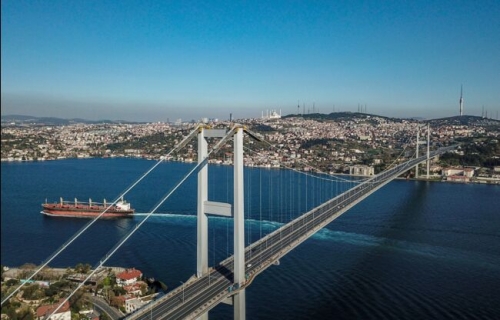
La question déjà complexe est encore compliquée par l'aspect géopolitique, un facteur central. Depuis 1936, les passages du Bosphore sont régis par la Convention de Montreux, chef-d'œuvre diplomatique de Kemal Ataturk, qui garantit le trafic des navires marchands de tous pavillons et limite l'accès à la mer Noire des navires militaires de pays tiers. Jusqu'à présent, la Turquie a joué son rôle de garant avec équilibre, mais l'ouverture de la voie navigable (avec la taxe de transit attenante) pourrait être l'occasion tant attendue par Erdogan de classer les anciens accords et d'ouvrir une nouvelle phase, tout cela devant être compris et analysé.

Comme le note Lorenzo Vita dans son excellent livre L'onda turca (Historica-Giubilei Regnani, 2021), consacré à l'expansion navale d'Ankara: "La Russie n'aime pas du tout l'idée que la Turquie abandonne les clauses de Montreux. Poutine a appelé Erdogan pour exprimer le point de vue russe sur le détroit. Le président turc a répondu que pour l'instant l'abandon du Traité de Montreux n'est pas mis en question, mais l'attention du Kremlin est un signe de ce qui pourrait arriver. Car si Moscou a tout intérêt à empêcher que l'équilibre de la mer Noire ne soit rompu, la curiosité est grande à Washington: surtout dans une phase d'escalade impliquant l'Ukraine et la "Crimée". Les États-Unis seraient en fait "très intéressés par une voie maritime exclue de cette convention". Si la Turquie décidait de renégocier le traité ou d'exclure la nouvelle voie navigable de l'accord, Washington aurait l'occasion de se débarrasser d'un goulot d'étranglement fondamental, donnant libre cours à la liberté de navigation et à l'idée d'armer la "mer Noire".
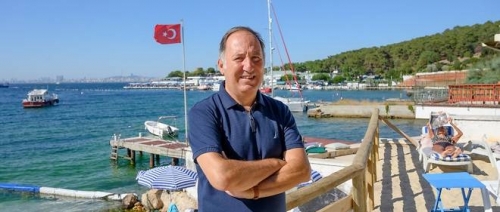
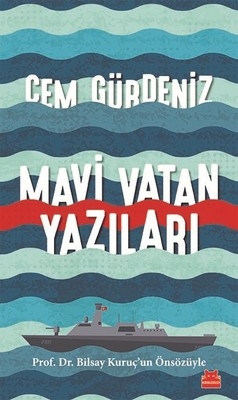
Des préoccupations également partagées par de nombreux amiraux à la retraite, dont Cem Gurdeniz, le théoricien du "Mavi Vatan" (la patrie bleue), le pilier doctrinal de la nouvelle marine turque. En avril, 104 officiers ont signé une déclaration critiquant l'idée du "Kanal" et considérant la sortie de Montreux comme un suicide politique. En réponse, Erdogan a accusé les marins de préparer un coup d'État et les a jetés en prison ou assignés à résidence. Pour Lorenzo Vita, il s'agit d'un signal fort: "Au bloc nationaliste et laïc qui conteste 'Kanal Istanbul', à la Russie et aux États-Unis. Elle montre que la possibilité d'exclure le canal de la Convention est une hypothèse réelle. Tellement réelle que ceux qui condamnent l'hypothèse sont considérés comme dangereux, même si cela conduit à arrêter un homme qui a façonné la stratégie navale turque actuelle".
Marco Valle.
15:45 Publié dans Actualité, Affaires européennes, Géopolitique | Lien permanent | Commentaires (0) | Tags : bosphore, turquie, mer de marmara, mer noire, géopolitique, traité de montreux, kanal istanbul, istanbul, erdogan, espace pontique, méditerranée, méditerranée orientale |  |
|  del.icio.us |
del.icio.us |  |
|  Digg |
Digg | ![]() Facebook
Facebook
jeudi, 15 juillet 2021
Comment l'armée turque a tenté de renverser Recep Tayyip Erdogan
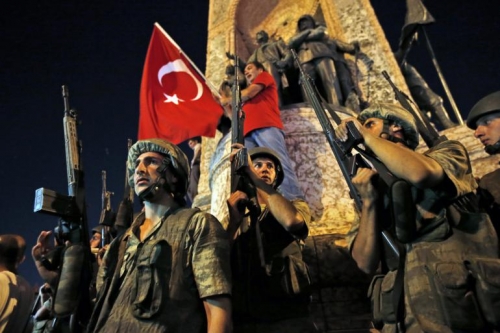
Turquie: cinq ans depuis le coup d'État manqué
Comment l'armée turque a tenté de renverser Recep Tayyip Erdogan
Ex: https://katehon.com/ru/article/pyatiletie-neudavshegosya-perevorota
Dans la nuit du 15 au 16 juillet 2016, une tentative de coup d'État a eu lieu en Turquie. Un groupe de conspirateurs militaires a tenté de prendre le pouvoir par la force et de destituer physiquement le chef de la république, Recep Tayyip Erdogan. Ils ont échoué, les cerveaux ont été arrêtés et le pays a commencé une purge, notamment des militaires. Le putsch a définitivement changé la politique intérieure et étrangère de la Turquie et ses conséquences se sont reflétées dans les réformes qui ont eu lieu ces dernières années.
L'histoire des coups d'État turcs
Au cours de l'existence de la République moderne de Turquie, le pays a été secoué par un certain nombre de coups d'État militaires et de vagues d'arrestations de grande ampleur. Dans presque tous les cas, ils ont eu le même motif : préserver la nature séculière de l'État et l'ordre politique actuel. En mai 1960, les militaires ont arrêté les membres du "Parti démocratique" au pouvoir en raison de la corruption qui y régnait et des mesures répressives prises par le gouvernement. En septembre 1961, on en arrive à l'exécution du premier ministre déchu. En 1971, le chef du gouvernement est contraint d'abdiquer. Il a toutefois occupé ce poste trois fois de plus par la suite. En 1980, le gouvernement a été renversé par le "Conseil de sécurité nationale". En 1997, Erbakan a été chassé du pouvoir par les militaires. Il est révélateur qu'Erbakan ait été le mentor d'Erdogan et qu'il ait tenté d'islamiser le pays.
Événements en 2016
Il y a cinq ans, un groupe d'officiers se faisant appeler le "Conseil de la paix" a tenté de mener une opération visant à saisir des installations stratégiques et à neutraliser d'éventuels adversaires. Ils ont décrit leur mission comme un retour aux processus démocratiques dans le pays.
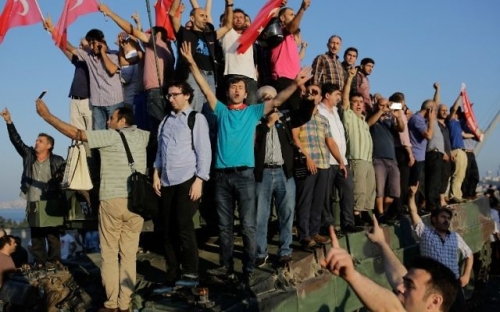
Vers minuit, le 15 juillet, les médias sociaux se sont tus en Turquie. Des chars sont apparus dans les rues d'Ankara et d'Istanbul. Tous les vols internationaux dans les aéroports ont été annulés ou retardés. Les conspirateurs eux-mêmes ont diffusé un message sur l'une des chaînes de télévision centrales indiquant que le pouvoir passait entre leurs mains. Un couvre-feu et la loi martiale ont été déclarés.
Il est également largement admis que ce sont des informations en provenance de la Russie, communiquées aux gardes du corps personnels d'Erdogan, qui lui ont permis d'échapper à son triste sort. La chambre d'hôtel où il se trouvait a été visée par des tirs d'hélicoptère, mais Erdogan a été évacué peu avant l'attaque. Les frappes aériennes des avions de guerre ont également visé la résidence présidentielle et le bâtiment du parlement.
Un peu plus tard, le Premier ministre turc, Binali Yildirim, a publié une déclaration indiquant que la tentative de mutinerie avait échoué. Le président est également apparu sur les ondes et a exhorté les gens à descendre dans la rue.
Comme tous les militaires ne se sont pas rangés du côté des putschistes, cela a joué un rôle important dans la lutte pour le pouvoir. Parmi les conspirateurs figuraient les dirigeants de l'armée de l'air et de l'armée de terre, ainsi que de la gendarmerie. Les forces spéciales sont restées fidèles au président.
Deux hélicoptères ont été abattus lors d'échanges de tirs, et les unités de l'armée de l'air fidèles au président ont également attaqué des chars à l'extérieur du palais présidentiel.
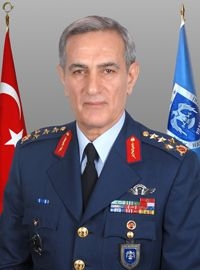 L'un des chefs du complot était le chef de l'armée de l'air turque, le général Akın Öztürk. Avec lui, quelque trois mille autres putschistes ont été arrêtés le 16 juillet.
L'un des chefs du complot était le chef de l'armée de l'air turque, le général Akın Öztürk. Avec lui, quelque trois mille autres putschistes ont été arrêtés le 16 juillet.
Tous les participants au coup d'État n'ont pas été jugés. Par exemple, huit des participants ont fui vers la Grèce voisine dans un hélicoptère militaire, où ils ont demandé l'asile politique. Ils n'ont pas encore été extradés vers la Turquie.
Au total, 37.000 personnes ont été arrêtées dans l'affaire de la tentative de coup d'État en 2016.
Au cours du putsch, 90 partisans du président ont été tués, dont 47 civils. Du côté des putschistes, 104 personnes ont été tuées.
La piste de Fethullah Gülen
Selon la partie turque victorieuse, la tentative de coup d'État est en partie imputable au prédicateur sectaire Fethullah Gülen, qui a longtemps travaillé pour la CIA et vit aux États-Unis (Pennsylvanie). Gülen a travaillé en étroite collaboration avec le gouvernement turc dans les années 1990, mettant en place des gouvernements parallèles dans un certain nombre de pays d'Asie centrale et dans les Balkans. Son mouvement Hizmet, ainsi que diverses initiatives commerciales et éducatives, lui ont servi de couverture officielle.
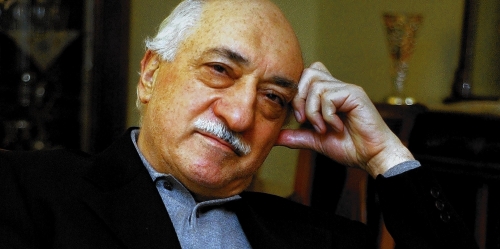
Après que Gülen a ouvertement soutenu l'opposition au gouvernement lors des manifestations de masse de la place Taksim à Istanbul, qui se sont étendues à plusieurs autres villes de Turquie en 2013, des enquêtes sur ses biens ont été ouvertes. Ses médias, notamment le journal Zaman, ont été fermés. Des demandes ont été faites à un certain nombre de pays du côté turc pour supprimer les activités de ses organisations.
Intérêts américains
Outre l'influence de Gülen sur les événements décrits, certains schémas ont été détectés qui révèlent un lien entre les conspirateurs et les diplomates américains.
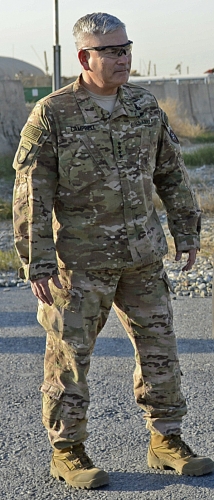
Les médias turcs ont également cité d'autres citoyens américains comme des politologues et des écrivains qui auraient participé au coup d'État.
Les responsables américains ont nié toute implication dans le coup d'État.
La polarisation en Turquie
De manière révélatrice, pendant et après le putsch, une transformation intéressante s'est opérée dans le pays selon des lignes politiques. Certains des anciens opposants d'Erdogan, notamment le Parti des travailleurs (rebaptisé plus tard Patrie, Vatan), ont soutenu les actions d'Erdogan. Alors que certains de ses anciens collègues - le ministre des Affaires étrangères et Premier ministre Ahmet Davutoğlu, Ali Babacan, qui a également été ministre des Affaires étrangères, l'ancien président Abdullah Gül - ont au contraire critiqué et sont passés dans l'opposition.
La consolidation ultérieure de la verticale du pouvoir a conduit à l'arrestation de politiciens pro-kurdes et à la marginalisation des forces politiques kurdes. Dans le même temps, les partis pro-occidentaux et libéraux ont cherché à exploiter ces changements pour leurs propres dividendes politiques.
L'état d'urgence a été imposé dans le pays, et est resté en vigueur jusqu'au 18 juillet 2018.
L'exacerbation des relations avec l'Occident
Le putsch a également conduit à une révision de la coopération avec l'UE et les États-Unis. Il y avait plusieurs dimensions en jeu à ce niveau. Les États-Unis ayant soutenu politiquement et militairement les Kurdes en Syrie, cela a suscité des protestations de la part d'Ankara. Une demande d'extradition de Fethullah Gülen n'a pas été accordée. Dans l'ensemble, la présidence Trump a été caractérisée par une pression claire sur Ankara de la part de Washington. Des sanctions ont été imposées à la Turquie pour avoir acheté des systèmes de défense aérienne S-400 à la Russie. Ce n'est que lors du dernier sommet de l'OTAN que Joe Biden a tenté d'apaiser les tensions entre les pays.
En parallèle, les relations avec l'UE se sont détériorées. Bruxelles a notamment déposé des plaintes contre la Turquie pour violation des droits de l'homme en raison de l'interdiction des partis pro-kurdes, de la fermeture de certains médias et du durcissement de la législation sur les médias sociaux. Et la Turquie s'est retirée de la "Convention d'Istanbul sur la protection des femmes", adoptée en 2011, en mars 2021.
En outre, la Turquie a constamment défié les pays de l'UE sur les flux migratoires, et Bruxelles a été contrainte de faire des concessions en allouant des fonds supplémentaires.
Bien que les liens diplomatiques restent officiellement en place, il est clair que la Turquie se tourne désormais moins vers l'Occident et est prête à agir de manière décisive lorsque ses intérêts sont violés par ses anciens partenaires et alliés de l'OTAN. Cependant, la Turquie reste un participant actif de l'"Alliance de l'Atlantique Nord", malgré les frictions et les problèmes qu'elle rencontre avec la Grèce voisine.
Le président russe Vladimir Poutine a été l'un des premiers hommes politiques à condamner la tentative de coup d'État et à soutenir son collègue Recep Tayyip Erdogan. Cela a contribué au rapprochement politique entre les deux pays, malgré des désaccords sur la question syrienne. Les relations se sont temporairement envenimées en 2018 lorsque la Turquie a abattu un avion de guerre russe en Syrie, tuant le pilote.
20:49 Publié dans Géopolitique | Lien permanent | Commentaires (0) | Tags : géopolitique, politique internationale, turquie, erdogan |  |
|  del.icio.us |
del.icio.us |  |
|  Digg |
Digg | ![]() Facebook
Facebook
vendredi, 25 juin 2021
L'Islam a découvert l'Amérique et y prépare le "logement" des Frères musulmans
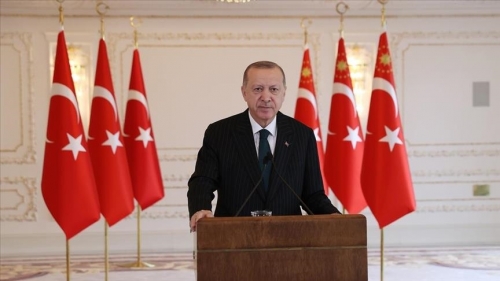
L'Islam a découvert l'Amérique et y prépare le "logement" des Frères musulmans
Gaston Pardo
Le président turc Recep Tayyip Erdogan a maintenu en public, le 18 novembre 2014, sa thèse selon laquelle les musulmans ont découver l'Amérique. L'homme d'État turc est convaincu que "les musulmans ont fait cette découverte en 1178". Au 12ème siècle. Presque trois siècles avant Christophe Colomb. Erdogan invoque à l'appui de sa thèse historique "que de nombreux scientifiques très respectés en Turquie et dans le monde" sont les garants de sa déclaration.
En même temps, il regrette que de nombreux croyants n'aient pas confiance en eux. Une proclamation comme celle d'Erdogan ne peut avoir qu'un seul but : établir un droit d'occupation en faveur de l'islam sur des terres aujourd'hui sous la domination des descendants des guerriers chrétiens qui ont combattu, sans succès, les musulmans lors des croisades.
Les croisades étaient des mobilisations de masse au sein desquelles il y avait quelques guerriers, et d'autres qui étaient surtout des aventuriers attirés par la promesse qu'ils seraient autorisés à piller les lieux qu'ils occupaient, comme ils le firent d'ailleurs à divers endroits de Byzance. Leur but était de sauver un tombeau vide à Jérusalem.
Erdogan et les Frères musulmans en Afrique
Une cellule clandestine des Frères musulmans égyptiens, une organisation qui s'est développée illégalement en Afrique du Nord, a été localisée au Soudan en février 2020 ; elle prévoyait de mener des opérations clandestines à Khartoum, la capitale de ce pays. De même, au Caire, la capitale de l'Égypte, un ressortissant égyptien a avoué avoir réussi à entrer au Soudan avec deux passeports syriens qui lui avaient été remis par des fonctionnaires turcs.
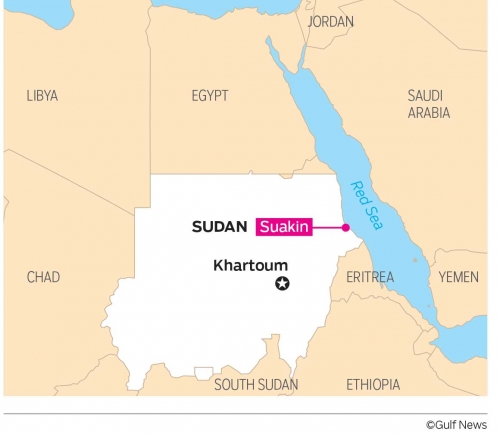
Les terroristes étaient liés à d'anciens députés égyptiens appartenant aux Frères musulmans, dont Gamal Hanafi, Yasser Hasanein et Abdul Hadi Shalabi, qui faisaient partie du gouvernement égyptien renversé en 2013.
Selon les autorités soudanaises, les membres égyptiens des Frères musulmans sont arrivés sur le sol soudanais en provenance de Turquie. Les cerveaux de leurs opérations étaient Muhamed Abdul Malik al-Haluji, mort en Turquie en novembre 2019, et Mohamed al-Buhairi, le directeur égyptien des opérations de la confrérie en Afrique. Il a apparemment des vues sur l'autre côté de l'Atlantique depuis un poste d’observation libyen.
Le réseau Buhairi au Soudan
Buhairi, 77 ans, est une figure centrale de l'organisation mondiale des Frères musulmans, recherchée par les services de sécurité égyptiens depuis l'époque de Gamal Abdel Nasser (dirigeant du pays entre 1952 et 1970). Il est arrivé au Soudan dans les années 1990. Dans quel contexte ? Celui de l'organisation fondée en 1928 à Ismaïlia, en Égypte, par le professeur Hassan al-Banna, soit la confrérie des Frères musulmans (FM), qui mène aujourd'hui des activités militantes dans plus de 70 pays (Soudan, Jordanie, Syrie, Palestine, Maghreb, Libye), est l'une des plus anciennes et des plus importantes organisations islamistes sunnites au monde.
S'il n'est pas souhaitable de condamner en bloc ses membres, il faut en revanche qu'un fait historique doit rester ancré dans notre mémoire politique: les rêves d'Al-Banna en 1928, peuvent se réaliser aujourd'hui en faisant régner sur terre une théocratie globale fondée exclusivement sur la loi islamique (charia) et sur un califat islamique qui englobera d'abord les pays arabes, puis les disciples de Mahomet dans le monde. Et enfin le monde entier.
Contexte
Après la "révolution égyptienne" de 1919, le Royaume-Uni a reconnu l'indépendance de l'Égypte en 1922. Fouad Ier adopte alors le titre de "roi d'Égypte". Et lorsque, le 19 avril 1923, on discute de la première constitution, qui contient certains des fondements d'un État moderne, les Égyptiens, pour montrer l'importance du document, déclarent que "la Constitution est notre Coran".
Ce à quoi Hassan al-Banna répond: « Non! Le Coran est notre Constitution. Le Prophète Mohamed est notre chef, le Jihad est notre chemin, et la mort pour la gloire d'Allah est notre plus belle aspiration. (...) La nation se lève avec la prière et ne renaîtra que sous l'impulsion de la charia islamique ».
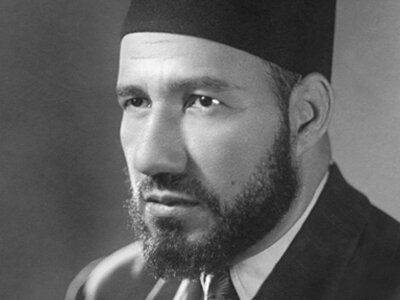 Pour Hassan-al-Banna (photo), le fondateur des Frères musulmans, et son point de vue est partagé aujourd'hui par les tendances wahhabites en Arabie saoudite, tous les États laïques doivent être démantelés.
Pour Hassan-al-Banna (photo), le fondateur des Frères musulmans, et son point de vue est partagé aujourd'hui par les tendances wahhabites en Arabie saoudite, tous les États laïques doivent être démantelés.
Un processus continu
Les efforts d'unification du leader turc
Erdogan a réalisé des investissements pro-Bechir qui ont conduit à la signature d'accords militaires et de renseignement avec le Soudan en mai 2011. Les deux parties se sont engagées à coopérer en matière de formation militaire, de communications et de recherche technologique. En décembre 2017, Erdogan s'est rendu au Soudan pour créer le Conseil de coopération stratégique de haut niveau, ce qui a conduit à la signature de douze accords, comme la location de l'île soudanaise de Suakin à la Turquie.
En avril 2019, Erdogan tourne ses sympathies vers l'opposition clandestine soudanaise, bien encadrée par les Frères. Et comme en Égypte et en Syrie, Erdogan a déclaré que s'il ne pouvait pas prendre le contrôle de l'État soudanais, il le détruirait.
Défections dans le cercle intime d'Erdogan
Ibrahim Kalin, l'un des principaux conseillers d'Erdogan, et l'homme d'affaires turc Abdulah Tivnikli, ont déploré le fait que les manifestants de la Confrérie se soient retirés en Égypte, tandis que Tivnikli a déploré que le mouvement Hamas à Gaza, qui est un autre allié d'Erdogan, pourrait être la prochaine victime des Frères dans la région arabe.
Le chef de l'organisation terroriste imaginaire Al-Qaida a appelé les musulmans du monde entier à commettre de nouvelles attaques. Pour Ayman Al-Zawahiri, les cibles des djihadistes doivent être des Américains, des Européens, des Israéliens ou des Russes. Ça n'a pas d'importance.
Al-Qaïda semble être un moteur capable de mobiliser ses cellules dans le monde entier.
Le professeur Xavier Raufer est le plus grand expert occidental en matière de terrorisme. On a commencé à parler d'Al-Qaida dans les instances gouvernementales américaines peu après les attentats contre les tours jumelles de New York en septembre 2001. Oussama ben Laden était considéré comme le chef du groupe, même si, bien que le magnat saoudien y ait été actif, il n'a jamais prétendu en être membre. Le groupe est resté silencieux alors que l'Émirat islamique était actif. Récemment, le groupe "terroriste" renaissant, qui n'a jamais été mentionné par Oussama, a jeté l'anathème sur l'État d'Israël.
Tout a un sens dans le projet musulman ottoman
Le 24 juillet 1923, le traité de Lausanne annule le traité de Sèvres et crée la Turquie moderne en respectant les exigences de Mustafa Kemal Ataturk, qui ordonne la restauration de Sainte-Sophie et l'offre à l'humanité, transformant le temple en musée en 1934.
Mais le 24 juillet 2020, précisément à l'occasion de l'anniversaire du traité de Lausanne, le président turc Recep Tayyip Erdogan a transformé l'ancienne cathédrale de l'Empire romain d'Orient, la seconde Rome, en mosquée.
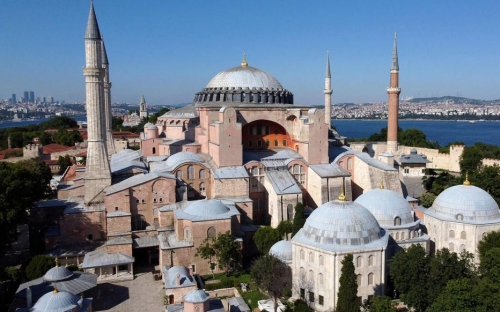
On peut voir à travers l'histoire comment les religions ont changé de caractère et, si l'on remonte au Moyen Âge, le christianisme s'avérerait être la religion la plus violente à la surface de la terre, celle qui a le plus persécuté les "autres". L'Islam a été beaucoup plus tolérant (...). Ce qui montre simplement que les religions n'ont pas une fonction permanente de violence ou de paix". C’est Nadia Gost (Khost), universitaire syrienne, qui a fait cette déclaration parue par voie de presse le 20 juin 2013. Elle a été rééditée en 2020 sur le site Arret sur info.
Évoquant le riche patrimoine culturel de son pays et ses traditions de tolérance religieuse, Nadia Gost/Khost rappelle qu'il fait partie intégrante du tissu humain social arabe. Pendant ce temps, le nettoyage ethnique et religieux est une étape du projet israélo-occidental visant à diviser la Syrie en mini-États religieux et nationalistes.
D'une pierre deux coups l'intellectuelle Gost/Khost démontre que la guerre qui démantèle la Syrie n'est pas confessionnelle, mais une dévastation qui dépend de l'emploi de mercenaires fanatiques enrôlés par Israël, l'Occident et leurs alliés du Golfe pour démembrer un pays qui leur offre une forme nette de résistance.
"Cette citation de l'universitaire syrienne elle-même soulève une question: que signifie le Jihad (guerre sainte) et quelle est sa place, quelle est sa relation avec les forces influentes du système mondial? Le Jihad signifie-t-il la résistance aux forces impérialistes, aux côtés des aspirations populaires et d'un projet politique, social et culturel? Ou se sépare-t-il du peuple, en réalisant des projets étrangers financés par des fonds étrangers?
Le christianisme, fille de l'Orient
 Selon notre auteur, Nadia Khost (photo), les colonialistes occidentaux sont le pilier du christianisme, et le christianisme: la réalisation du projet israélo-occidental et le déchaînement de bandes extrémistes contre la population dont l'activité défigure la religion musulmane, de telle sorte que les nations syrienne et irakienne s'éloignent de l'histoire et de la tradition arabes: de la recommandation d'Omar ibn al Gatab ; de la défense par Saladin Ayubide des chrétiens de Jérusalem ; ainsi que du premier État arabe (Omeyyade).
Selon notre auteur, Nadia Khost (photo), les colonialistes occidentaux sont le pilier du christianisme, et le christianisme: la réalisation du projet israélo-occidental et le déchaînement de bandes extrémistes contre la population dont l'activité défigure la religion musulmane, de telle sorte que les nations syrienne et irakienne s'éloignent de l'histoire et de la tradition arabes: de la recommandation d'Omar ibn al Gatab ; de la défense par Saladin Ayubide des chrétiens de Jérusalem ; ainsi que du premier État arabe (Omeyyade).
Bilad el Cham, désigne la région qui couvre le territoire des États actuels de Syrie, y compris le dit Sandjak d'Alexandrette (la partie annexée par la Turquie), la Jordanie, le Liban, la Palestine occupée et une partie de l'Irak. Dans l'histoire du Moyen-Orient, dont il existe de nombreuses versions, la région de Bilad el-Cham est considérée comme le berceau de l'islam et du christianisme. Et cette conviction des historiens arabes permet au chef de l'Etat turc de s'arroger des droits indiscutables. Oui, indiscutable car ajoutant la thèse de la découverte de l'Amérique par les musulmans au 12ème siècle à la recherche d'une origine commune du christianisme et de l'islam dans le Bilad el Cham.
L'Amérique latine face à l'Islam
L'augmentation éventuelle des migrations islamistes vers l'Europe et l'Amérique ne doit pas être considérée comme comparativement indésirable, mais seulement comme une tentative de dompter les élites locales de ces deux régions du monde, qualifiées d'"Occident". Les élites qui agissent dans ces domaines sont de moins en moins ancrées dans la population et sont qualifiées d'"élites sans peuple". Les Etats américains ne doivent pas opposer aux migrations islamiques la vision européenne.
Sur le Vieux Continent, les élites paient par l'internement de millions de migrants les ravages causés aux peuples périphériques par le génocide et pour avoir déclaré les territoires conquis comme territoires d'outre-mer et leurs habitants comme sujets coloniaux. En Amérique, comme nous l'avons vu avec les colonisations espagnole, anglaise et portugaise, dont les protagonistes ont agi différemment des autres sujets européens, la colonisation a été réalisée sur la pratique intense du génocide et sa population n'a jamais été considérée comme un outre-mer dérivé de diverses métropoles.
L'Islam peut être une solution en Amérique, entre autres parce que personne ne s'oppose, pour l'instant, à son implantation et à la propagation de sa doctrine. En outre, il est inadmissible qu'en Amérique nous nous engagions dans une querelle avec l'Islam, car il n'est pas dans notre intérêt d'être une seconde partie dans le conflit d'un autre.
Note : L'installation par les Britanniques au Québec de contingents de membres des Frères musulmans, rejetés en principe par la population francophone, est appelée un accommodement.
00:26 Publié dans Actualité | Lien permanent | Commentaires (0) | Tags : actualité, politique internationale, frères musulmans, turquie, erdogan, néo-ottomanisme |  |
|  del.icio.us |
del.icio.us |  |
|  Digg |
Digg | ![]() Facebook
Facebook
mardi, 27 avril 2021
Deux fauteuils pour trois
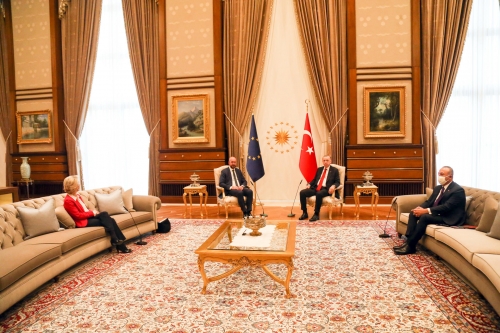
Deux fauteuils pour trois
par Georges FELTIN-TRACOL
Stupeurs ! Effrois ! Horreurs ! Le Berlaymont, siège de l’eurocratie, n’en revient toujours pas. Le 6 avril dernier, le président du Conseil européen, Charles Michel, et la présidente de la Commission européenne, Ursula von der Leyen, se rendent à Ankara afin de relancer les discussions avec la Turquie. Devant les caméras, le président turc Recep Tayyip Erdogan accueille le duo et l’invite à prendre place. Les deux hommes s’installent dans les fauteuils. Stupéfaite, Ursula von der Leyen se contente d’un sofa un peu mis à l’écart et en face du ministre turc des Affaires étrangères, Mevlüt Çavuşoğlu. Le « Sofagate » vient d’éclater.
Dans les heures suivantes, un déluge de réactions négatives submerge la Toile. La médiasphère tient enfin la preuve incontestable de la misogynie et du machisme d’Erdogan. Ce n’est pas pour rien si la Turquie vient de se retirer de la Déclaration d’Istanbul qui instaure une tyrannie féministe larvée en Occident. Les folliculaires droitiers partagent pour une fois l’avis de l’extrême gauche et des centristes : le président Erdogan outrage l’Union européenne, la femme moderne et l’égalité paritaire (ou la parité égalitaire). Au XIXe siècle, un tel mépris aurait aussitôt provoqué une intervention armée vengeresse. On aurait aimé que les mêmes va-t-en-guerre eussent la même détermination belliciste au moment de la reconquête martiale azérie de l’Artsakh… Or, il faut reconnaître que pour la circonstance le dirigeant turc n’est que la victime collatérale du « Sofagate », habile prétexte pour cacher les dysfonctionnements institutionnels initiaux de l’Union pseudo-européenne. L’unité de commandement turque découvre in vivo la multiplicité du commandement, ses tiraillements permanents et l’effarante polysynodie propres à l’incurie eurocratique. L’antagonisme virulent entre Ursula von der Leyen et Charles Michel accentue l’impuissance générale.
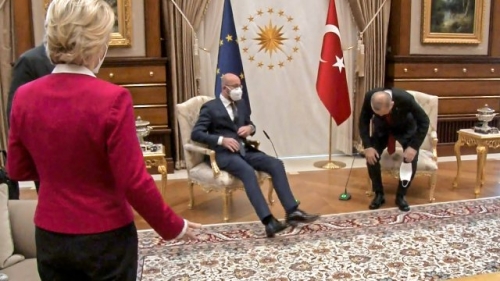
Les rapports entre les deux têtes de l’exécutif dit européen sont détestables dès leur entrée en fonction. Charles Michel a été de 2014 à 2019 Premier ministre fédéral belge tandis qu’Ursula von der Leyen n’a occupé que trois postes ministériels, dont la Défense, ce qui dans une Allemagne à la souveraineté limitée, n’est pas un portefeuille prestigieux. La cohabitation très courtelinesque entre le libéral belge et la chrétienne-démocrate allemande s’agrémente d’un haut représentant de l’Union pour les affaires étrangères et la politique de sécurité en la personne du socialiste espagnol Josep Borrell. Ce dernier a d’ailleurs connu, quelques semaines plus tôt, une sévère déconvenue bien méritée à Moscou.
Ursula von der Leyen et Charles Michel rêvent chacun de régenter à leur profit l’entité euro-atlantiste. Charles Michel a pris un léger avantage en respectant le protocole. Le président du Conseil européen a en effet le rang de chef d’État, d’un État qui n’existe pas. Selon ces mêmes règles et les textes en vigueur, la présidente de la Commission européenne a le statut de chef de gouvernement même si la Commission n’est pas un vrai gouvernement. Ne le savait-elle pas ? À moins qu’elle cherche à se faire passer pour une pauvre victime d’affreux mâles… Charles Michel aurait-il pu lui laisser son fauteuil et ainsi entériner un coup d’État institutionnel interne ? Le duo aurait-il dû rester debout devant le président turc assis ? L’interprétation découlant aurait fait penser au maître d’école turc sermonnant deux élèves turbulents. On peut reprocher à Ursula von der Leyen de n’avoir pas eu le courage de s’asseoir sur les genoux de Charles Michel, voire sur ceux du président turc. Craignait-elle peut-être de provoquer l’ire des féministes jamais contentes ? Quant à mettre en face du président Erdogan deux fauteuils, cela aurait déséquilibré la photographie au désavantage des eurocrates.
En se servant du protocole, les diverses têtes de l’hydre pseudo-européenne démontrent que l’Union dite européenne est plus qu’un tigre de papier, c’est un formidable paillasson sur lequel n’importe qui peut s’essuyer. Conçue comme un espace de libre échange économique anticipant un monde uni par le doux commerce et la belle musique du pognon-roi, l’Union supposée européenne a renoncé dès sa naissance à la puissance stratégique, militaire et géopolitique. Elle préfère rester sous la protection interlope de l’OTAN. La souveraineté européenne chère au gamin de l’Élysée demeure fictive tandis qu’à rebours du discours souverainiste, la souveraineté nationale des États membres se dissipe.
L’anecdote d’Ankara révèle le caractère chimérique de l’actuelle Union européenne. Les Européens ne réaliseront pas leur unité historique à travers des transactions bancaires, des virements financiers et des échanges économiques. Leur unité ne se forgera que par le fer, le feu et le sang dans la plus grande imprévisibilité historique.
Georges Feltin-Tracol
• « Chronique hebdomadaire du Village planétaire », n° 211, mise en ligne sur TVLibertés, le 20 avril 2021.
00:51 Publié dans Actualité, Affaires européennes | Lien permanent | Commentaires (0) | Tags : charles michel, ursula von der leyen, erdogan, europe, actualité, affaires européennes |  |
|  del.icio.us |
del.icio.us |  |
|  Digg |
Digg | ![]() Facebook
Facebook


